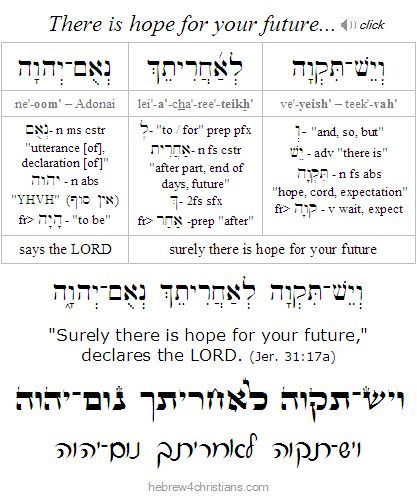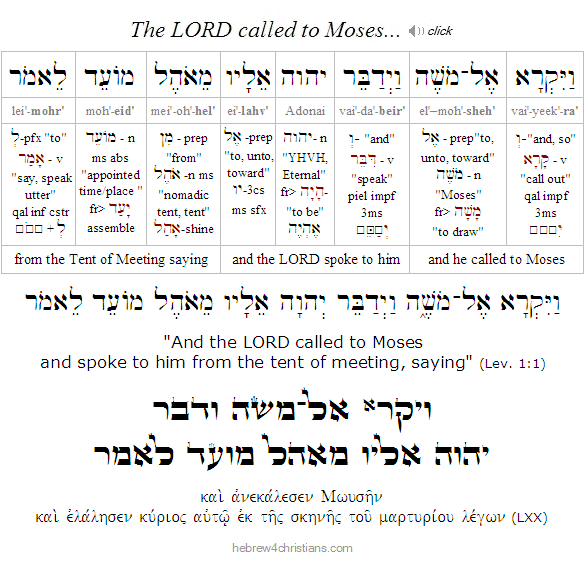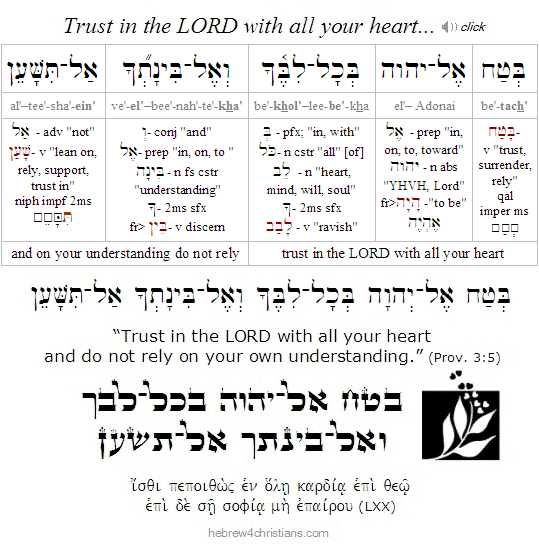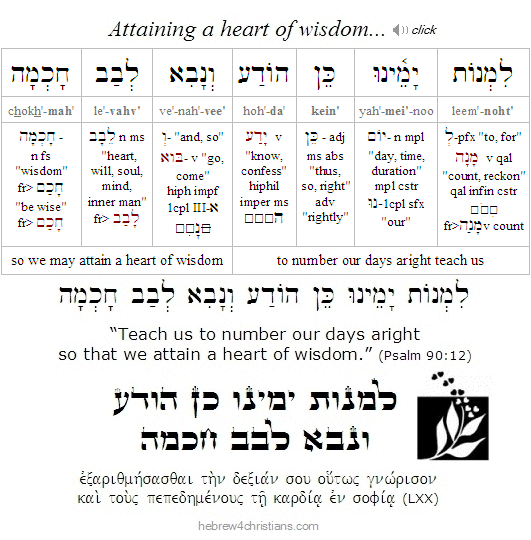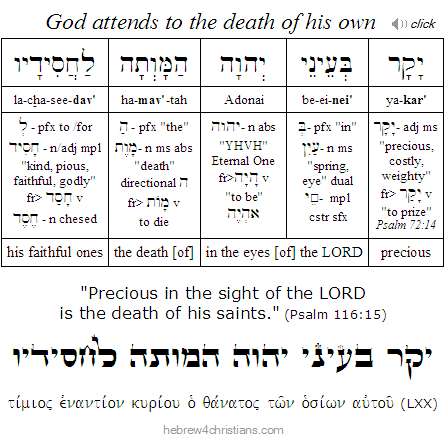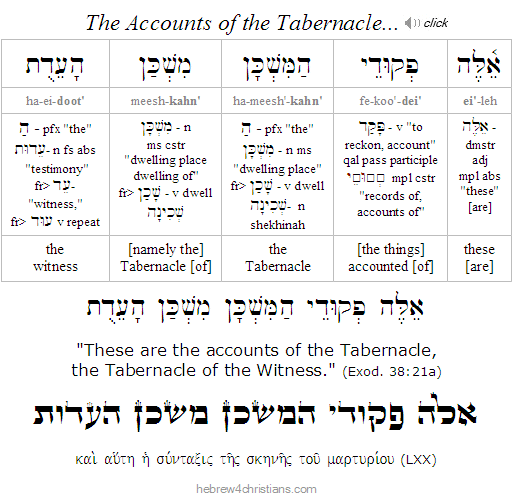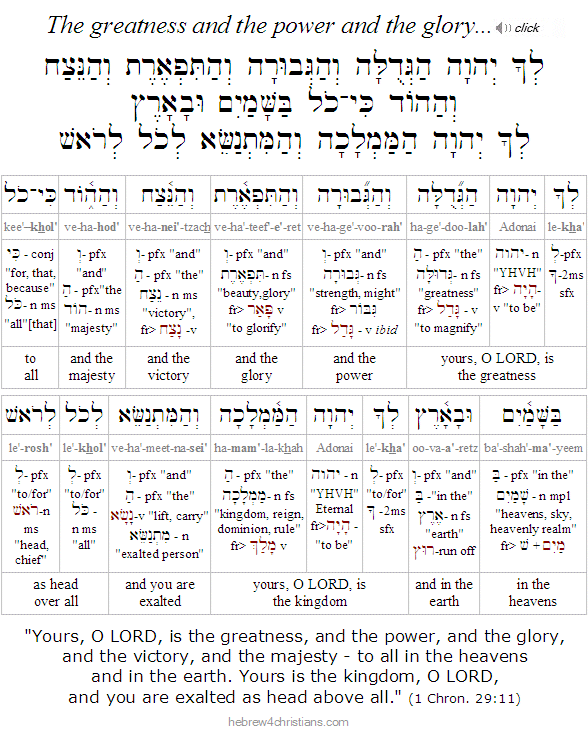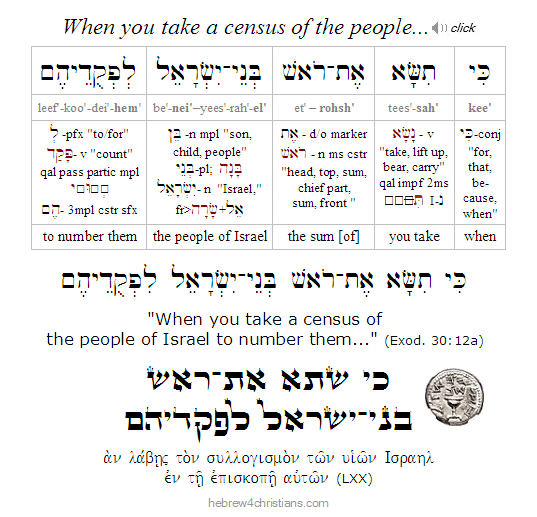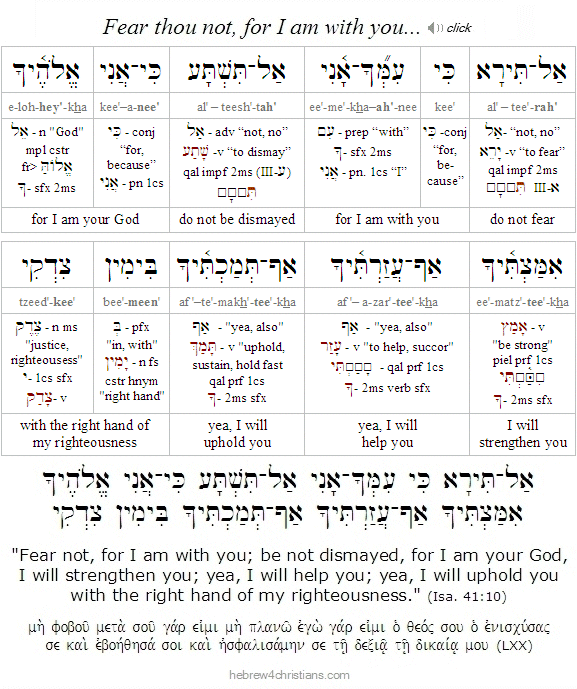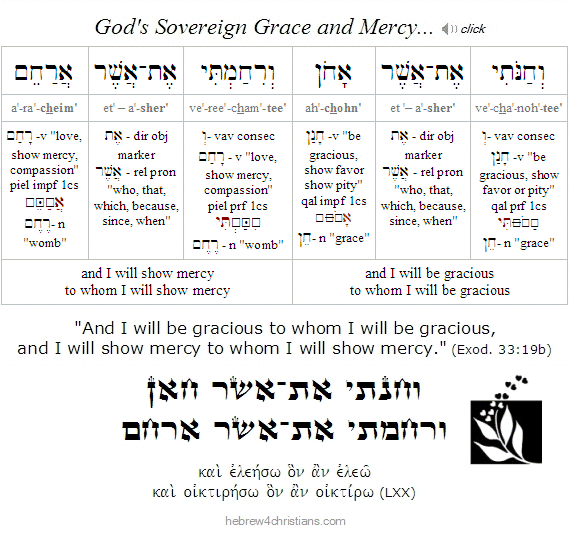|
Jewish Holiday Calendar
For March 2020 site updates, please scroll past this entry....
Spring is the start of the Biblical Year and is marked by two of the Shelosh Regalim (three annual pilgrimage festivals): Pesach (Passover) and Shavuot (Pentecost). The holiday of Shavuot is held seven weeks (or fifty days) following the morning after Pesach.
Dates for Passover 2020:
The Spring Holidays:
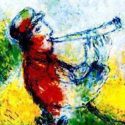
The spring holidays (חגי האביב) provide a portrait of the death, burial, and resurrection of the Messiah: Yeshua was crucified on erev Pesach (during the time of the sacrifice of the Passover lambs), buried during Chag Hamotzi (the festival of Unleavened Bread), and was resurrected from the dead on Yom Habikkurim (the Day of Firstfruits). Fifty days after Passover, on the climactic holiday of Shavuot (i.e., the feast of Pentecost), the Ruach HaKodesh (Holy Spirit) fell on the believers in fulfillment of the promise given by our Lord. Note that the giving of the Holy Spirit occurred precisely according to the calendar countdown given in the Torah (Lev. 23:15-16), and that it occurred after the resurrection of Yeshua -- just as our Messiah foretold (John 16:7; Acts 1:6-8, 2:1-4). This proves that the feasts of the LORD (מוֹעדי יהוה) were not abolished after the crucifixion. The meaning of the gospel is prefigured in the holidays given in Torah. See Luke 24:27, 24:44; John 5:46; Acts 26:22, etc.
Kindly note that in accordance with both Torah and Jewish traditon, the following holiday dates begin at sundown (ויהי־ערב ויהי־בקר; Gen. 1:5).
- Month of Adar (Mon. Feb. 24th [eve] - Wed. March 25th [day])
- Month of Nisan (Wed. March 25th [eve] - Thurs. April 23rd [day])
- Month of Iyyar (Thurs. April 23rd [eve] - Sat. May 23rd [day])
- Month of Sivan (Sat. May 23rd [eve] - Sun. June 21st [day])
Note: For more information, see the Calendar Pages....
March 2020 Updates
Note: If any page content appears to be missing, please refresh the page...
He is LORD over all...
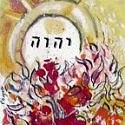
03.31.20 (Nisan 6, 5780) We praise the LORD our God for all things, since "his kingdom is an everlasting kingdom, and his dominion is from generation to generation" (Dan. 4:3). "All the inhabitants of the earth are accounted as nothing, and he does according to his will among the host of heaven and among the inhabitants of the earth; and none can stay his hand or say to him, "What have you done?" (Dan. 4:35). Yea, as the prophet Job testified, "I know that you can do all things, and that no purpose of yours can be thwarted" (Job 42:2). "Who has spoken and it came to pass, unless the LORD has commanded it? Is it not from the mouth of the Most High that good and bad come? Why should a living man complain, a man, about the punishment of his sins?" (Lam. 3:37-39).
ואלהינו בשׁמים כל אשׁר־חפץ עשׂה - "Therefore our God is in the heavens; he does all that he pleases" (Psalm 115:3). His power is ein mispar (אין מספר) unfathomable and infinite (Psalm 147:5). Do you not know? Do you not hear? Has it not been told you from the beginning? Have you not understood from the foundations of the earth? It is He who sits above the circle of the earth, whose inhabitants are as grasshoppers; it is He who brings princes to nothing, and makes the rulers of the earth as emptiness" (Isa. 40:22-23). Yea, "He pours contempt on princes and makes them wander in trackless wastes" (Psalm 107:40). Amen.
"Know therefore today, and lay it to your heart, that the LORD is God in heaven above and on the earth beneath; there is no other" (Deut. 4:39). "Blessed are you, O LORD, the God of Israel our father, forever and ever. Yours, O LORD, is the greatness and the power and the glory and the victory and the majesty, for all that is in the heavens and in the earth is yours. Yours is the kingdom, O LORD, and you are exalted as head above all" (1 Chron. 29:10-11). God is the Master of the Universe, the LORD of all possible worlds, who both upholds the great motions of the cosmos yet knows when a tiny sparrow falls to the ground. The LORD God knows the Beginning from the End and there is no power that can overcome Him or thwart his sovereign purposes. He is before all things and in Him all things hold together. Amen, the LORD God Almighty holds the keys of life and death...
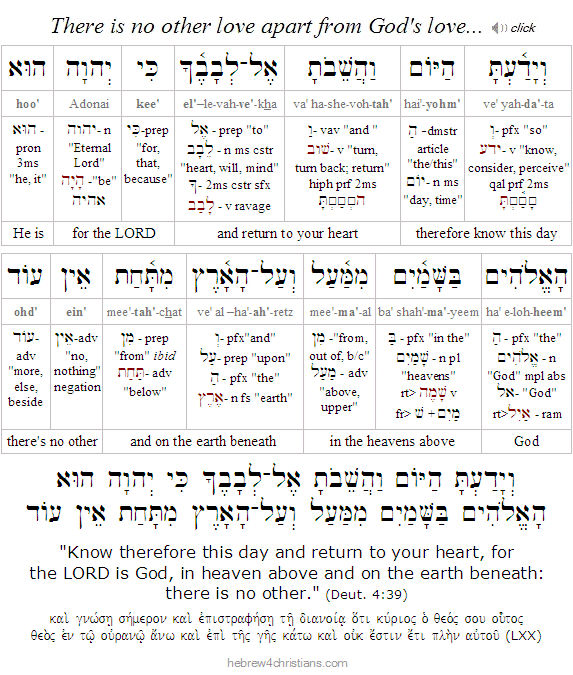 |
Are you afraid you might die of some sort of virus? Yet every day a man dies - for the day has passed, never to return. Death comes closer every day, yet no one seems to tremble before the hour they shall before God to give account of their lives. The real dangers of life are not vulnerability to sickness, crime, or the loss of worldly fortune, but rather the susceptibility to despair, the tendency to put off repentance, and the possibility of not dying well.... It is a great danger to walk through life asleep only to be jolted awake upon the day of death.
Each soul is given the choice to believe and be saved, or to reject the invitation and remain in darkness. Therefore turn this day and choose life that you may truly live... Time is running out; turn to God and ask for his healing in Yeshua while you are able.
Teshuvah and Seeking...
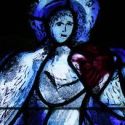
03.31.20 (Nisan 6, 5780) The Hebrew word for "world" or "age" is olam (עולם), which is derived from a root verb (עלם) that means "to conceal" or "to hide." God "hides" His face from us so that we will seek Him, and that means pressing through ambiguity and troubles of this world to discern and take hold of the truth. Therefore King David said, בקשׁוּ פניו תמיד / bakeshoo fanav tamid: "Seek His face continually" (Psalm 105:4), at all times and in every circumstance. Note that the Hebrew gematria (numerical value) for the word "fanav" (i.e., "His face") is the same as that for the word "olam." When we truly seek God's face (i.e., His Presence) we are able to discern the underlying purpose for our lives in this age.
דִּרְשׁוּ יְהוָה וְעֻזּוֹ
בַּקְּשׁוּ פָנָיו תָּמִיד
deer·shoo · Adonai · ve·oo·zo
ba·ke·shoo · fa·nav · ta·meed

"Seek the LORD and his strength;
seek his presence continually."
(Psalm 105:4)
Hebrew Study Card

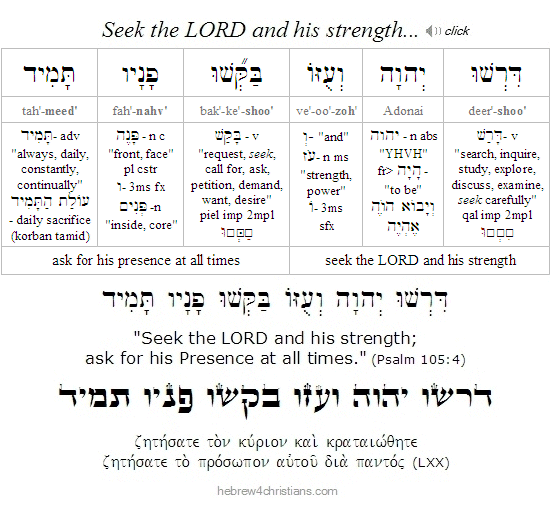
The ancient Greek version of the Torah (i.e., the Septuagint) translates this verse, "Seek the LORD and be strengthed; seek His face through everything (διὰ παντός)." The LORD God gives us "inner strength" (i.e., ἐγκράτεια, from εν-, "in" + κράτος, "strength" or "power") when we yield to "the power of His might" (ἐν τῷ κράτει τῆς ἰσχύος αὐτοῦ) (Gal. 5:22-23; Eph. 6:10). Therefore we must remember God's power and glory, for "He is the LORD our God (הוא יהוה אלהינו); His judgments are in all the earth" (Psalm 105:7).
Affirming the Light...
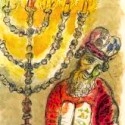
03.31.20 (Nisan 6, 5780) From our Torah for this week (i.e., Tzav) we read: "The fire on the altar shall be kept burning on it; it shall not be extinguished" (Lev. 6:12). The sages say do not read "burning on it" but rather "burning in him" (בּוֹ), referring to the heart of the priest. And where the text says "it (i.e., the fire) shall not be extinguished" (לא תכבה), read instead "extinguish (תִכְבֶּה) the negative (לא)" by trusting in God's promise for our good, despite any temporary setbacks or apparent failures. The Holy Spirit imparts the fire of faith that fills our hearts with hope (רוח נכון), affirming with "tongues of fire" words of life and light that vanquish darkness. As it is written: "Light dawns in the darkness for the upright; He is gracious, full of compassion, and righteous" (Psalm 112:4).
זָרַח בַּחשֶׁךְ אוֹר לַיְשָׁרִים
חַנּוּן וְרַחוּם וְצַדִּיק
zah·rach · ba·choh'·shekh · ohr · lai·shah·reem
cha·noon · ve·ra·choom · ve·tza·deek

"Light dawns in the darkness for the upright;
He is gracious, full of compassion, and righteous."
(Psalm 112:4)
Download Study Card

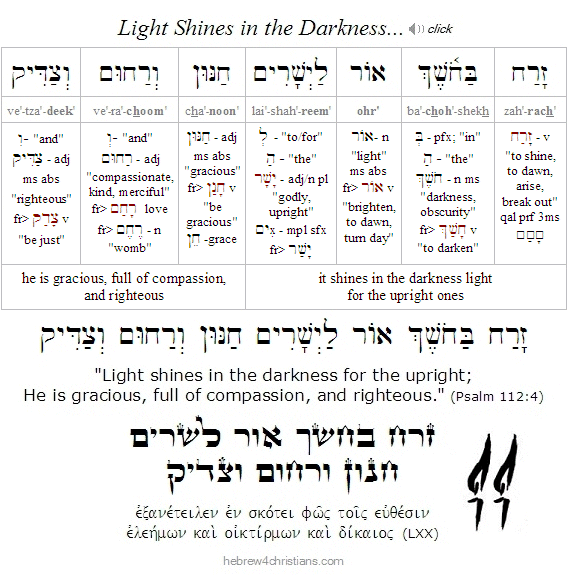
Spiritually speaking, the first step is to find hope... The Divine Light is seen by means of the eye of faith (עין האמונה), and therefore we find strength by trusting in God's Presence, even though we cannot presently see Him (2 Cor. 4:18; 5:7). "Trust in the LORD with all your heart, and do not lean on your own understanding. Know Him in all your ways, and He will straighten your paths. Be not wise in your own eyes; fear the LORD, and turn away from evil" (Prov. 3:5-7). Wait on the LORD and He will strengthen your heart....
We must keep courage, remain steady as we fight the good fight of faith. As it is written, "The LORD is my light and my salvation; whom shall I fear? The LORD is the stronghold of my life; of whom shall I be afraid? When evil men attack me to devour my flesh, when my adversaries and enemies attack me, they totter and fall. Even if an army is deployed against me, I do not fear; even if war is rises against me, I remain full of trust" (Psalm 27:1-3).
The Midrash says, "The Holy One Himself, as it were, made light for the upright. Thus it says, "The LORD is my light and my salvation" (Psalm 27:1) and "When I sit in darkness, the LORD will be a light to me" (Micah 7:8). While I sit in darkness in this world, during these latter days before the promised return of Yeshua, when troubles may afflict me and lawlessness may abound – then God's light will shine brighter still, for the LORD is gracious to all who put their hope in Him, and this favor and love will be manifest for me.
Let us affirm our confidence: The darkness of this world forever is swept back before the overmastering radiance and power of Yeshua, the King of Glory, the Root and Descendant of David, and the Bright Morning Star (Rev. 22:16). Those who believe in Him are given the "light of life" that overcomes the darkness of this world (John 8:12).
May God renew a "right spirit" (רוח נכון), ruach nachon, within us (Psalm 51:10). Amen.
A Blessed Brokenness...

03.31.20 (Nisan 6, 5780) Many of us have been given the special blessing of needing God so viscerally that we will fall apart or even self-destruct apart from His daily intervention in our lives... Yeshua speaks to the desperately needy of heart: "Blessed are the poor in spirit, for theirs is the kingdom of heaven" (Matt. 5:3). We groan in hope... In our Torah portion this week (Tzav) we read that the fire on the altar was to be kept burning at all times (Lev. 6:12-13), which symbolizes esh tamid (אש תמיד), or the inner fire of the heart... How blessed it is to be full of the fire of this inner need, this relentless groaning, this constant hunger to be set free. As it is written, the high and lifted up One dwells with the broken and lowly of spirit, to revive the spirit of the lowly and to revive the heart of the crushed:
כִּי כה אָמַר רָם וְנִשָּׂא שׁכֵן עַד וְקָדוֹשׁ שְׁמוֹ
מָרוֹם וְקָדוֹשׁ אֶשְׁכּוֹן וְאֶת־דַּכָּא וּשְׁפַל־רוּחַ
לְהַחֲיוֹת רוּחַ שְׁפָלִים וּלְהַחֲיוֹת לֵב נִדְכָּאִים
kee · khoh · ah·mar · rahm · ve·nee·sah · shoh·khein · ad · ve·kah·dosh · she·mo:
mah·rohm · ve·kah·dohsh · esh·kohn · ve·et · dak·kah · oosh·fal · roo·ach
le·ha·cha·yoht · roo·ach · she·fah·leem · oo·le·ha·cha·loht · lev · need·kah·eem

"For this is what the high and lifted up One says, the One who abides forever,
whose Name is Holy: "I dwell in a high and holy place, but also with the broken
and lowly of spirit, to revive the spirit of the lowly and to revive the heart of the crushed."
(Isa. 57:15)

Download Study Card
God reveals Himself to the "lowly in spirit" (שְׁפַל־רוּחַ), that is, to those who understand their own nothingness and complete dependence on Him.... Notice that the word translated "crushed" is dakka (דכא), a word that suggests being oppressed to the depths, and is the same word used to describe how Yeshua was crushed for our iniquities (see Isa. 53:10). William James called this deep work of the spiritual life Zerrissenheit, a term that can be translated as "torn-to-pieces-hood," or a state of being utterly broken and in disarray (see William James: Varieties of Religious Experience). From the point of view of our dependence on God for salvation, dakka refers to humility and contrition we express in light of God's unmerited favor and love for our souls... We identify with the death of Messiah offered on our behalf; we find healing and acceptance in the Presence of the One who was torn to pieces and made dust for our merit. Humility is essential to awareness of God in the truth.
בָּרוּךְ אַתָּה יהוה אֱלהֵנוּ מֶלֶךְ הָעוֹלָם
אֲשֶׁר עָשָׂנוּ אֲסִירֵי תִּקְוָה
ba·rookh · a·tah · Adonai · E·lo·hei'·noo · me'·lekh · ha·o·lam,
a·sher · a·sa'·noo · a·see·rei · teek·vah

"Blessed are You, LORD our God, King of the universe,
who has made us captives of hope."
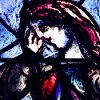
Download Study Card
A Willful Ignorance...
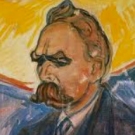
03.31.20 (Nisan 6, 5780) Dietrich Bonhoeffer (1906-1945), a German pastor who was surrounded by the atrocious evil of Nazi Germany and who was murdered at their hands, regarded stupidity as more dangerous than outright evil, since stupidity is a type of irrationality, a chosen ignorance of what is real and true. Against such willed ignorance we are often defenseless, since any reasoning that appeals to transcendental moral truth finds no traction, carries no weight, and has no effect. The devil, then, seeks first of all to stupefy people, that is, to drug them or flatter and persuade them to think that there is no need to engage in serious thinking or to humbly question their assumptions... As William James observed: "A great many people think they are thinking when they are merely rearranging their prejudices." The antidote to unthinkingly accepting the biases and inculcated prejudices of the world is to humble ourselves by learning to sincerely respect the Reality of God: "The fear of the LORD is the beginning of knowledge; but fools despise wisdom and correction."
יִרְאַת יְהוָה רֵאשִׁית דָּעַת
חָכְמָה וּמוּסָר אֱוִילִים בָּזוּ
yeer·at · Adonai · rei·sheet · dah·at
chokh·mah · oo·moo·sar · e·vee·leem · ba·zoo

"The fear of the LORD is the beginning of knowledge;
but fools despise wisdom and correction."
(Prov. 1:7)

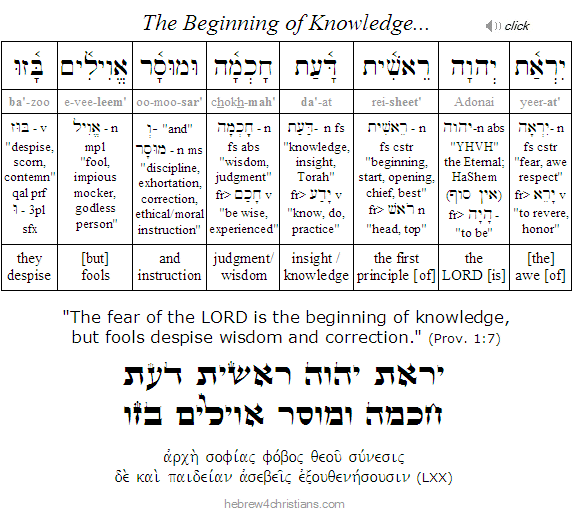
For Bonhoeffer, stupidity is a moral fault, not an intellectual deficiency; it is the result of a willful ignorance and cynical laziness. He wrote: "If we want to know how to get the better of stupidity, we must seek to understand its nature... that it is in essence not an intellectual defect but a human one. There are human beings who are of remarkably agile intellect yet stupid, and others who are intellectually quite dull yet anything but stupid. We discover this to our surprise in particular situations. The impression one gains is not so much that stupidity is a congenital defect but that, under certain circumstances, people are made stupid or that they allow this to happen to them. We note further that people who have isolated themselves from others or who live in solitude manifest this defect less frequently than individuals or groups of people inclined or condemned to sociability. And so it would seem that stupidity is perhaps less a psychological than a sociological problem" (Bonhoeffer: Letters from Prison).
Soren Kierkegaard likewise regarded stupidity to be a category of the "group-think" of the crowd. He wrote: "There is a view of life which holds that where the crowd is, the truth is also, that it is a need in truth itself, that it must have the crowd on its side. There is another view of life; which holds that wherever the crowd is, there is untruth, so that, for a moment to carry the matter out to its farthest conclusion, even if every individual possessed the truth in private, yet if they came together into a crowd (so that "the crowd" received any decisive, voting, noisy, audible importance), untruth would at once be let in... Indeed, the crowd is untruth. There is therefore no one who has more contempt for what it is to be a human being than those who make it their profession to lead the crowd. ... For to win a crowd is not so great a trick; one only needs some talent, a certain dose of untruth and a little acquaintance with the human passions" (Upbuilding Discourses).
Moving Heaven and Earth...

03.30.20 (Nisan 5, 5780) Act as if your choices have eternal significance; they do; pray as if your life depends on it; it does. Praying in accordance with the will of God - to know Him, to walk in the light of his love and to be filled with wisdom, patience, kindness, and so on, will assuredly move heaven and earth (1 John 5:14). God is faithful and always hears those who call out to him with sincerity of heart: "The LORD is near to all who call on him, to all who call on him in truth" (Psalm 145:18). Rouse then your heart! Boldly draw near to the throne of Grace to find help in your present hour of need (Heb. 4:16). Cry out to God Most High (לֵאלהִים עֶלְיוֹן), to the very One who will fulfill his purpose for you (Psalm 57:2).
The Sign of Life...
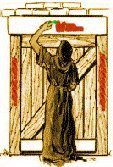
[ The following is related to the holiday of Passover, which begins Wed. April 8th... ]
03.30.20 (Nisan 5, 5780) Regarding the Exodus from Egypt (יציאת מצרים) and the Passover Redemption it is written in the Torah: "The blood shall be a sign for you (והיה הדם לכם לאת) ... and when I see the blood I will pass over you (וראיתי את־הדם וּפסחתי עלכם) and no plague will befall you to destroy you, when I strike the land of Egypt" (Exod. 12:13). The blood would be a sign for the eye of faith, i.e., "for you," and not for the unbelieving world at large. During the afternoon of the 14th, the korban Pesach (Passover lamb) was slaughtered and its blood smeared on all three sides of the doorframe, top, right and left, that is, in the form of the letter Chet (ח). This letter is connected with the word chai (חי), "alive," and chayim (חיים), "life," signifying that atoning life is in the sacrificial blood (Lev. 17:11). Note that some say that the letters of the YHVH (יהוה) – the Name of Divine Compassion - were daubed on the doorposts: The Yod (י) was written on the top beam, the Vav (ו) on the right doorpost, and the Hey (ה) on the left. In other words, since Yeshua is YHVH, His Name was written on the doorposts of the faithful.
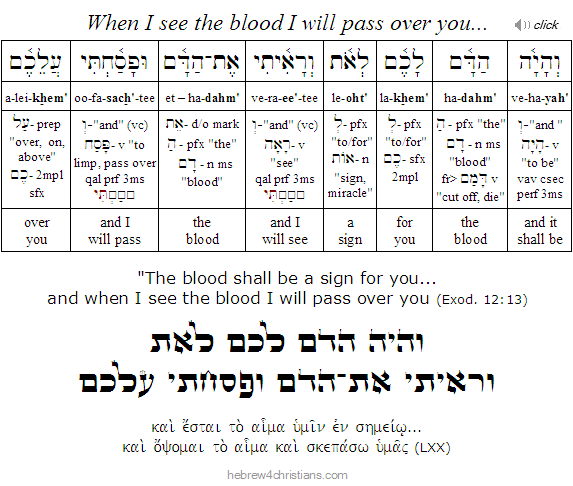 |
Sabbath before Passover...
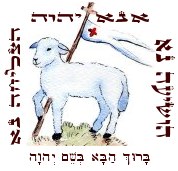
03.30.20 (Nisan 5, 5780) The Sabbath that immediately precedes the festival of Passover is called the "Great Sabbath" (i.e., Shabbat HaGadol: שבת הגדול), in honor of the time when the first generation set aside the lamb for the Passover Sacrifice (i.e., korban Pesach: קרבן פסח).
During the time of the Temple it was customary to obtain the Korban Pesach four days before Passover so that worshippers could make sure that their lambs had no blemishes which would preclude them from being offered as sacrifices. This was done to fulfill the instructions given in Exodus 12 that the lamb for Passover be "without spot or blemish." Interestingly, this period of time allowed time for each family to become personally attached to their lamb, so that it would no longer simply be "a lamb" (Exod. 12:3) but rather their lamb" (Exod. 12:5). Indeed the Torah refers to "the" Lamb of God, as if there was only one: "You shall keep it [i.e., the Passover lamb] until the fourteenth day of this month, when the whole assembly of the congregation of Israel shall slaughter him (אתוֹ) at twilight (Exod. 12:6). Note that the direct object "him" (i.e., oto) can be read as Aleph-Tav (את) combined with the letter Vav (ו), signifying the Son of Man who is First and Last.
![Spring Holiday Timeline (H4C]](../../../../About_HFC/Site_News/Archive-2020/March/shabbathagaolline.gif) |
Shabbat HaGadol foreshadowed the offering of Yeshua as the "Lamb of God" who takes away the sins of the world. The New Testament notes that it was a few days before Passover when Yeshua made His triumphant entry into Jerusalem riding on a donkey, signifying His Messiahship, in fulfillment of the prophecy of Zechariah: "Rejoice greatly, O daughter of Zion! Shout aloud, O daughter of Jerusalem! Behold, your king is coming to you; righteous and having salvation is he, humble and mounted on a donkey, on a colt, the foal of a donkey" (Zech. 9:9). During this time, when the pilgrims had come to select the lamb for the Passover sacrifice - they saw Yeshua and cried out: hoshiah na (הושׁיעה נא), meaning "please save" or "save now" (in English this phrase was translated from the Latin to form "Hosanna!"). The people spontaneously began singing Psalm 118:25-26 in anticipation of the fulfillment of the great Messianic hope:
אָנּא יְהוָה הוֹשִׁיעָה נָּא
אָנָּא יְהוָה הַצְלִיחָה נָּא
בָּרוּךְ הַבָּא בְּשֵׁם יְהוָה
בֵּרַכְנוּכֶם מִבֵּית יְהוָה
an·na · Adonai · ho·shee·ah · na
an·na · Adonai · hatz·lee·chah · na
bar·rookh · ha·ba · be·shem · Adonai
be·rakh·noo·khem · mee·beit · Adonai

"Please, LORD save us! Please, LORD rescue us!
Blessed is He who comes in the Name of the LORD
We bless you from the house of the LORD."
(Psalm 118:25-26)
Hebrew Study Card
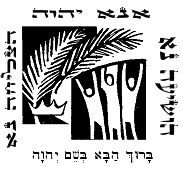
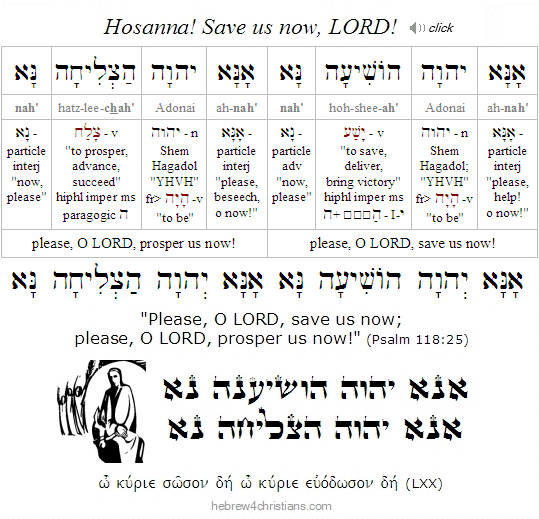
The Haftarah for Shabbat HaGadol (Malachi 3:4-24) foretells of Yom Adonai (יוֹם יהוה), the great Day of the LORD, and the return of Yeshua as Mashiach ben David. May that day come soon, chaverim. For more information, click here.
Our Duty to Honor the Passover...

03.30.20 (Nisan 5, 5780) It is written in our Scriptures: "Let the people of Israel keep the Passover at its appointed time (ויעשׂוּ בני־ישׂראל את־הפּסח בּמוֹעדוֹ). On the fourteenth day of this month, at twilight, you shall keep it at its appointed time; according to all its statutes and all its rules you shall keep it" (Num. 9:2-3). "Observe the month of Aviv (i.e., Nisan) and keep the Passover to the LORD your God, for in the month of Aviv the LORD your God brought you out of Egypt by night" (Deut. 16:1; cp. Exod. 12:1-20). Regarding the question of whether followers of Yeshua should celebrate the festival of Passover by participating in a Yeshua-honoring Seder, the answer is a resounding YES! After all, Yeshua is the Author of the Torah and its Voice, Word, and Perfect Expression. He is the true Lamb of God (שׂה האלהים) that was prefigured in the garden of Eden, exemplified in the sacrifice of Isaac (i.e., the Akedah), symbolized in the blood of the sacrifice of the lamb of God daubed in the form of a cross on the doorposts in Egypt during the great Exodus, and was finally perfectly realized in the sacrificial death and crucifixion of Yeshua during the time of the sacrifice of the korban Pesach (Passover lamb) at the Temple. Indeed the "Lord's Supper" or "Communion" is based on the Passover Seder where Yeshua explained how his sacrificial death as the Lamb of God would take away the sins of the world (see John 1:29; Luke 22:15; etc.). Therefore in the New Testament we read that the Apostle Paul instructed us to perform bedikat chametz and observe this festival: "Cleanse out the old leaven (i.e., chametz: חָמֵץ) that you may be a new lump, as you really are unleavened. For Messiah, our Passover lamb has been sacrificed (משׁיח זבח פסחנוּ). Let us therefore keep the feast, not with the old leaven, the leaven of malice and evil, but with the unleavened bread of sincerity and truth" (1 Cor 5:7-8).
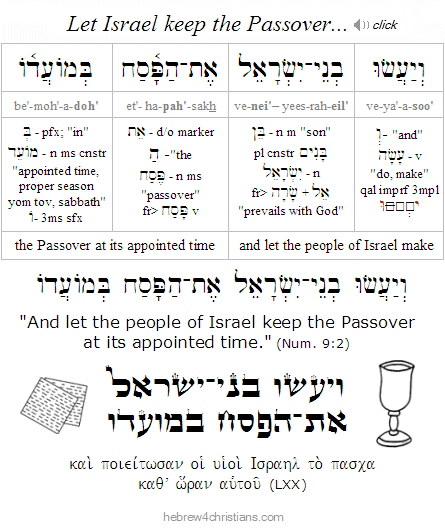 |
Parashat Tzav - פרשת צו

[ Every year we read Parashat Tzav before the holiday of Passover... ]
03.29.20 (Nisan 4, 5780) In our Torah reading for this week (i.e., parashat Tzav) we learn how the first priests of Israel were consecrated for service by the blood of the lamb. First Aaron and his sons were washed with water, arrayed in priestly garments, and anointed with holy oil. During this ordination ceremony, a sin offering and burnt offering were offered on their behalf, and then a special "ram of ordination" (i.e., eil ha-milu'im: איל המלאים, lit. "ram of abundance [מָלֵא]") was slaughtered. Some of this ram's blood was applied to the right ear, right thumb, and big toe of the Aaron and his sons (a picture of Yeshua as our suffering High Priest), and the rest of the blood was dashed upon the sides of the altar. After its slaughter, Moses took some unleavened bread and put it in the hands of the priests to perform tenufah (a wave offering) before the altar (a picture of the resurrection).
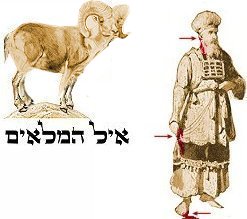 |
As followers of Yeshua, we too have been anointed with the blood from the "Ordained Lamb" -- Yeshua as our Kohen Gadol of the better covenant (Heb. 8:6). And we too have been anointed with the sacred shemen (oil) that symbolizes the presence and aroma of the LORD in our lives. As followers of Yeshua we are therefore truly "...a chosen race, a royal priesthood, a holy nation, a people for his own possession, that you may proclaim the excellencies of him who called you out of darkness into his marvelous light" (1 Peter 2:9). As Yeshua said: "You did not choose me, but I chose you and appointed you that you should go and bear fruit and that your fruit should abide, so that whatever you ask the Father in my name, he may give it to you" (John 15:16). May the LORD God of Israel be pleased to help you serve Him in the truth...
Passover and Soul Searching...

[ The following is related to the holiday of Passover, which begins Wed. April 8th this year... ]
03.27.20 (Nisan 2, 5780) The search for chametz (חפש חמץ) may be likened to the soul searching we do before the High Holidays in the fall, when we take an inventory of our spiritual condition (חשבון נפש) and do teshuvah. The Torah instructs us to carefully search and remove sources of inner impurity so that we might experience the truth that we are a "new lump" - that is, a new substance that is purged from the sour and rotting influences of our past lives... And since Yeshua has been sacrificed as your Passover Lamb, you are indeed a new creation (בּריה חדשׁה) made "unleavened" (pure) by the power of the Holy Spirit (2 Cor. 5:17). Therefore you are likewise commanded put away the "old nature" (יצר הרע) and purge from your life the old influences that inwardly canker you and make you sick (Eph. 4:22; Col. 3:9). Walk without hypocrisy in the truth of the love of God for your soul.
חָקְרֵנִי אֵל וְדַע לְבָבִי בְּחָנֵנִי וְדַע שַׂרְעַפָּי
וּרְאֵה אִם־דֶּרֶךְ־עצֶב בִּי וּנְחֵנִי בְּדֶרֶךְ עוֹלָם
chok·rei'·nee · el · ve·da · le·va·vee · be·cha·nei'·nee · ve'da · sar·a·pai
oor·eih · eem-de'·rekh-o'·tzev · bee · oo·ne·chei'·nee · be·de'·rekh · o·lam

"Search me, O God, and know my heart! Test me and know my thoughts.
And see if there be any idolatrous way in me,
and lead me in the way everlasting!"
(Psalm 139:23-24)

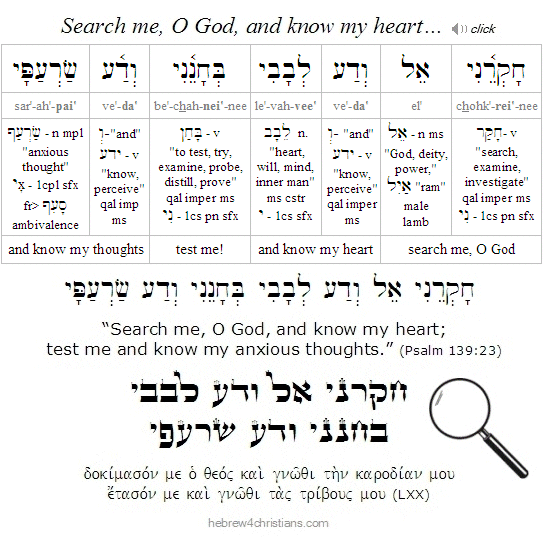
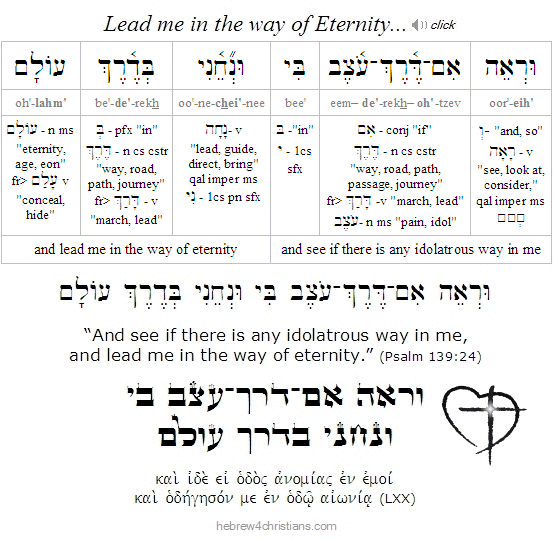
Passover: Who knows 15?
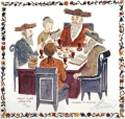
[ The following is related to the holiday of Passover, which begins Wed. April 8th this year... ]
03.27.20 (Nisan 2, 5780) Many of us are familiar with the connection between Passover and the number four. There are four "special Sabbaths" that precede the festival, and the holiday itself has four names: Chag Ha-Pesach (the holiday of the Passover [Num. 9:2]); Chag HaMatzot (the holiday of Unleavened Bread [Exod. 12:17-20]); Chag Ha-Aviv (the holiday of spring [Deut. 16:1]), and Z'man Cheiruteinu (the Season of our Freedom). During the seder, we partake of arba kosot ("four cups"), ask arba kushiyot ("four questions"), discuss arba Banim ("four sons"), and so on. However, it has been noted by various sages that the number fifteen is also connected to this holiday. There are 15 Steps to the traditional Passover Seder, which is held exactly 15 days into the first month of the Jewish year (i.e., Nisan). The famous "Song of the Sea" (i.e., Shirat Hayam: שִׁירַת הַיָּם) - which thanks God for the Exodus from Egypt - is found in the 15th chapter of the Book of Exodus, which was crafted by the scribes so that its center column has exactly 15 "steps" of text:
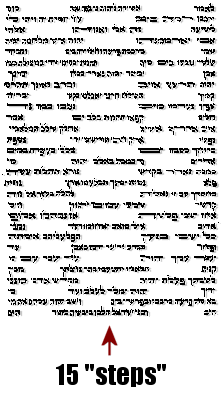
The Divine Name YAH (יה) - which first occurs in the Scriptures in the "Song of the Sea" (Exod. 15:2) - equals 15 in Hebrew gematria, and during the seder meal there are 15 things for which we sing Dayenu (i.e., דינו: "it would have been enough"). Furthermore, there were 15 steps on the south side of the Temple Mount, leading up to the Temple, and 15 psalms (120-134) that sung by the Levites as "Songs of the Steps." There are also 15 words uttered in the Priestly Blessing (Birkat Kohanim).... 15 is also the number of completion (7) combined with the number of grace (8), indicating the plan of God's redemption for the ages.
Walk in the Spirit...

03.27.20 (Nisan 2, 5780) Our hashkafah (Torah outlook) teaches that God is "omnipresent," or always present everywhere (בְּכָּל מָקוֹם), but much of the time we seem disconnected and lose touch with spiritual Reality. After all, it's one thing to "know about" God, and quite another to experience the sacred in our daily experience... Perhaps we miss detecting the Divine Presence because we are not seeing correctly (2 Cor. 5:7). We tend to "objectify" the natural world and thereby distance ourselves from the atmosphere of the Spirit and the flow of grace (i.e., ruach: "wind," "spirit"). Instead of understanding that we "live, move, and have our being" in God (Acts 17:28), we regard God as "out there," far away, and inaccessible to our reach... The Hebrew word "teshuvah" (תְּשׁוּבָה), often translated as "repentance," really means accepting the heavenly invitation to turn away from ourselves to receive God's love and grace. The Greek word "metanoia" (μετάνοια) conveys a similar idea - going "beyond" (i.e., meta: μετά) our everyday thinking (i.e., nous: νοῦς) to apprehend the realm of miracle, wonder, power, and love (John 6:33). We then become attuned to the Divine Presence as we turn or elevate our thinking from the realm of "this world" (olam ha'zeh) and its objectivity to one of spiritual receptivity, wholeness, and blessing (olam ha'ba). Teshuvah therefore is an (ongoing) awakening to the Reality of God, and knowing ourselves through our connectedness to the Spirit rather than objectifying ourselves and experiencing alienation and distance. Therefore הִתְהַלְּכוּ בָּרוּחַ - "walk in the Spirit" and you will no longer be enslaved to your fears (Gal. 5:16).
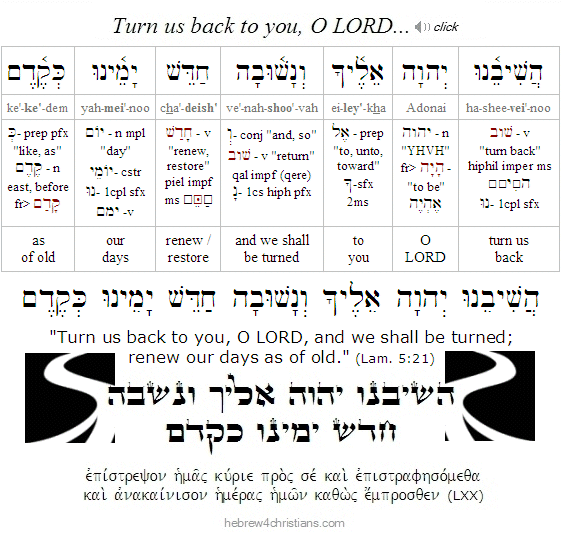 |
Teshuvah of Brokenness...

[ Today is Rosh Chodashim, Biblical New Year's Day... Shanah tovah friends. ]
03.26.20 (Nisan 1, 5780) Regarding the call to repentance we read: "Rend your hearts and not your garments and return to the LORD your God (וְשׁוּבוּ אֶל־יְהוָה אֱלהֵיכֶם), for he is gracious and merciful, slow to anger, and abounding in love..." (Joel 2:13). Genuine teshuvah (repentance) is not about the "outer layers" of life, but engages the deepest depths of heart; it is not expressed in religious practices or rituals but in personal brokenness and utter desperation... As King David said, "the sacrifices of God are a broken spirit (רוּחַ נִשְׁבָּרָה); a broken and contrite heart (לֵב־נִשְׁבָּר וְנִדְכֶּה), O God, you will not despise" (Psalm 51:17). As is written in our Haftarah portion for Shabbat Shuvah: "Return O Israel (שׁוּבָה יִשְׂרָאֵל), to the LORD your God, for you have stumbled because of your iniquity; take with you words and return to the LORD (וְשׁוּבוּ אֶל־יְהוָה) and say to him, 'Take away all iniquity; accept what is good, and we will pay with bulls the vows of our lips'" (Hos. 14:1-2).
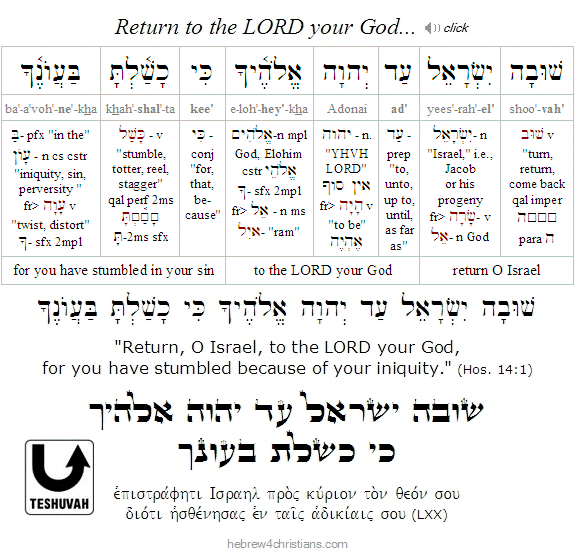 |
The Purging Process...
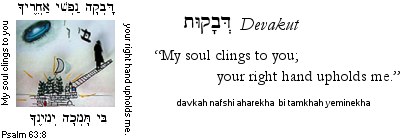
03.26.20 (Nisan 1, 5780) "I am the true vine, and my Father is the vinedresser. Every branch in me that does not bear fruit he takes away, and every branch that does bear fruit He purges (καθαίρει), that it may bear more fruit" (John 15:1-2). If you bear fruit you will experience the "purging process," and that means enduring affliction... Yeshua taught, "Blessed are the pure in heart, for they shall see God" (Matt. 5:8). The Greek word translated "pure" is katharos (καθαρός), sometimes used describe the cleansing of a wound (catharsis), or to describe the unalloyed quality of a substance revealed through refining fire. We "rejoice" in testing because that is the way of real growth, sustained hope, and the revelation of God's deep love (Rom. 5:3-4). In our afflictions we are promised heavenly consolation to help us to persevere (2 Cor. 1:3-5). We are being weaned from this present age to be made ready for heavenly glory, for things unimaginably wonderful, soon to be revealed to you. Chazak – stay strong in the Lord, friends.
טוֹב־לִי כִי־עֻנֵּיתִי לְמַעַן אֶלְמַד חֻקֶּיך
tov'-lee · khee- oo·nei'·tee · le·ma'·an · el·mahd · choo·ke'·kha

"It is good for me that I was afflicted,
that I might learn your decrees." (Psalm 119:71)

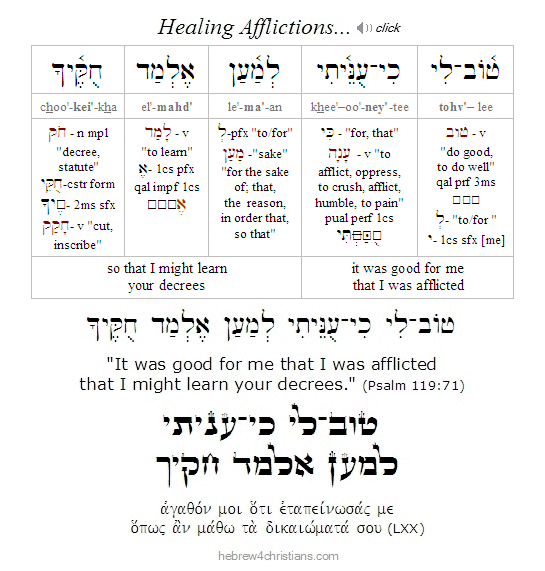
God wants us to be in a personal relationship with Him, and therefore He often sends temporal affliction to remind us of our eternal need.... Indeed, it is curse to be devoid of need before the LORD, and affliction is a blessing in disguise; it is a "severe mercy." As A.W Tozer once wrote, "It is doubtful whether God can bless a man greatly until He's hurt him deeply."
Just as God humbled Israel with manna in the desert, so He humbles us. "Give us this day our daily bread and deliver us..." The purpose of affliction is ultimately good and healing: God humbles us with manna, the "bread of affliction, so "that he might make you know that man does not live by bread alone, but man lives by every word that comes from the mouth of the LORD" (Deut. 8:3). In other words, God uses the discipline of affliction to lead us to the truth. We often pray that our problems be taken away, but God sometimes ordains these very problems so that we will draw near to Him... Yeshua told us, "Your heavenly Father knows what you need before you ask Him" (Matt. 6:8).
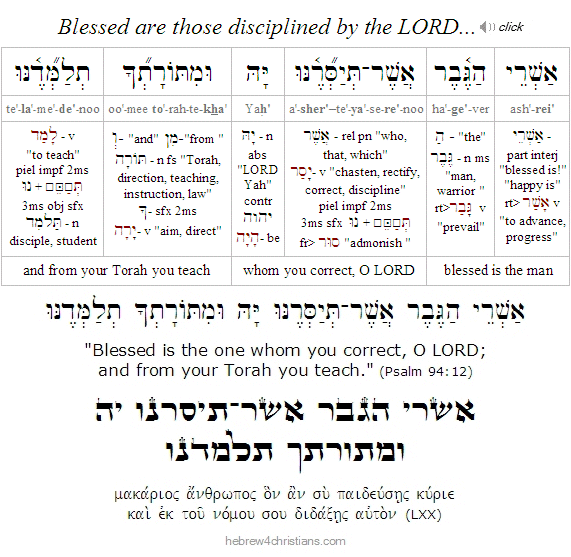 |
Leviticus and the Lamb...
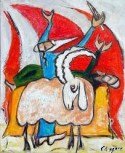
[ Today is Rosh Chodashim, Biblical New Year's Day... Shanah tovah friends. ]
03.26.20 (Nisan 1, 5780) The Book of Leviticus (ספר ויקרא) is the third of the Torah, representing another stage in our spiritual journey. Genesis reveals both our divine origin but also our tragic fallenness, and the book ends with our need for deliverance from bondage to Egypt. Exodus reveals that we are liberated from slavery by trusting in the provision of God demonstrated by the sacrifice of the Passover lamb, and the book ends with the climax of the revelation of Torah given at Sinai, namely, the building of the Mishkan (Tabernacle) where the the need for blood atonement was enshrined. Indeed blood atonement is the central theme of the central book of Torah, i.e., Leviticus, where we are called to draw near to God through sacrificial rites, the foremost of which was the ongoing offering (i.e., korban tamid: קרבן תמיד) of a defect-free male lamb, together with unleavened bread and wine. The LORD called this "My offering, My bread" (Num. 28:1-8). In other words, the center of the Torah is the altar that constantly prefigured the Lamb of God who would be offered up to secure our eternal redemption (John 1:29; Heb. 9:11-12).
רָאוּי הַשֶּׂה הַטָּבוּחַ לְקַבֵּל גְבוּרָה
עשֶׁר וְחָכְמָה וְכּחַ וִיקַר וְכָבוֹד וּבְרָכָה
ra·oo'·ee · ha·seh · ha·ta·voo'·ach · le·ka·bel · ge·voo·rah
o'·sher · ve·chokh·mah · ve·ko'·ach · vee·kar · ve·kha·vohd · oov·ra·kha

"Worthy is the Lamb who was slain, to receive power and wealth and wisdom
and might and honor and glory and blessing!"
(Rev. 5:12)

Download Reading Card
Though God instructed each household to select its own defect-free lamb for the family Passover, the Torah refers to "the" Lamb of God, as if there was only one: "You shall keep it [i.e., the Passover lamb] until the fourteenth day of this month, when the whole assembly of the congregation of Israel shall slaughter him (אתוֹ) at twilight (Exod. 12:6). Indeed there is only one great Lamb of God "slain from the foundation of the world," namely, the One given in the Garden of Eden (Gen. 3:21), sacrificed in place of Isaac during the Akedah, selected for the Passover from Egypt (and later commemorated as korban tamid (the daily offering) at the Temple (Num. 28:1-8)), later incarnated as our Savior, the great Lamb of God who offered Himself upon the cross for our sins (John 1:29), and who ascended to eternal victory to be seated upon the very Throne of God's Glory (Rev. 5:12-13; Rev. 22:1). Amen, the Torah centers on the great Lamb of God....
A New Beginning...
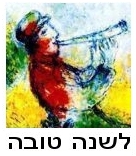
[ This evening marks Rosh Chodashim, or the Biblical New Year. Happy New Year to you in our Messiah, the One who sustains all things by His Word. Peace... ]
03.25.20 (Adar 29, 5780) The very first word of the Torah indicates the significance of time, namely, bereshit (בְּרֵאשִׁית) - "in the beginning..." (Gen. 1:1), and according to tradition, the very first commandment given to the children of Israel (as a whole) was that of Rosh Chodesh (ראש חודש), or the declaration of the beginning (i.e., rosh) of the "new month," and particularly the very first month of their redemption (see Exod. 12:2). In other words, Passover month was to begin Israel's year, and indeed the sacrificial system itself (i.e., the Tabernacle) was consecrated precisely on the new moon of the first month (see Exod. 40:2). Note that the Hebrew word for month (i.e., chodesh) comes from the root chadash (חָדָש), meaning "new," and therefore the Passover redemption was intended to mark a "new beginning" for the Jewish people. And indeed, God marks the start of our personal redemption as the beginning of our life as a new creation (2 Cor. 5:17), just as Yeshua is the "first of the firstfruits" of God's redeemed humanity (1 Cor. 15:45-49).
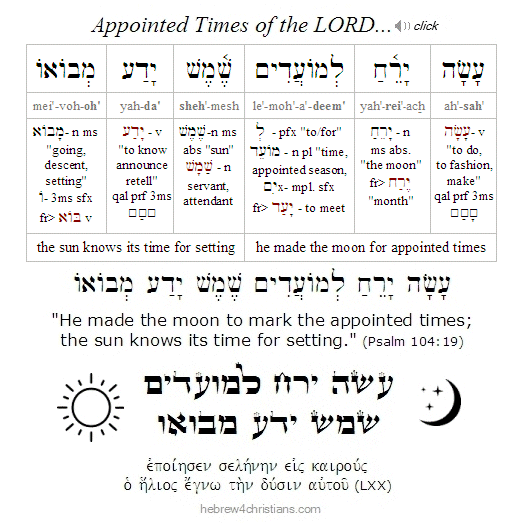 |
Perfect Love (אהבה שלמה)...

03.25.20 (Adar 29, 5780) The gospel reveals God's passion for us, the call of his heart, his desire to elevate us to the role of the beloved, and we respond by accepting Him as the great Lover of our souls, the "ultimate concern" of our life. Sin threatens to seduce us away from God's love, to interfere with our relationship, which evokes God's "jealousy" to protect love from loss. It is written that "perfect love casts out fear" (1 John 4:18), but perfect love (τελεία ἀγάπη) must be "perfect," that is, reciprocal, complete, consummated, and alive with passion. In Hebrew, perfect love is "shalem" - that is, whole, healed, and unified (i.e., ahavah shlemah: אהבה שלמה). Perfect love is both given and received... It is not "perfect love" to objectively accept that God loves you in Jesus. No, you must receive this as an inward passion, you must live within it, must embrace it, take possession of it, and let it fill your heart to abundance. This love, this "perfect love," then will cast away your fear of being unwanted, rejected, and abandoned. But to know this love, you have to open your heart and accept it as your own; you have to accept yourself as the beloved of God:
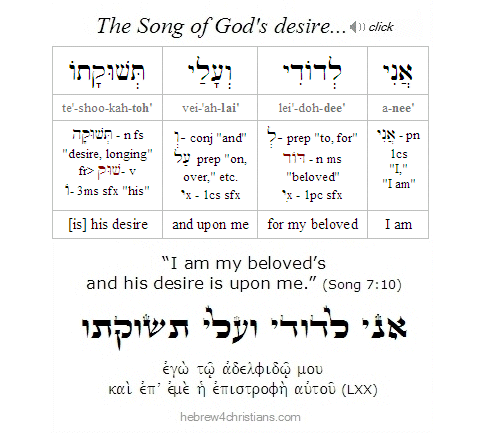 |
An End to Our Darkness...
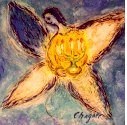
03.25.20 (Adar 29, 5780) In our struggle against the darkness, there is good end coming, so don't let your heart grow numb. Never give up hope. The Spirit says: "Be silent before the LORD and wait patiently for him; do not burn with anger over the one who prospers in his way, over the man who carries out evil schemes. Abandon your anger and forsake your rage. Do not burn with anger: it tends only to distress. For the evildoers shall be cut off, but those who keep hope in the LORD shall inherit the land. In just a little while, the wicked will be no more; though you look carefully at his place, he will not be there" (Psalm 37:7-10). Amen, halevai, let it be so, O God...
וְעוֹד מְעַט וְאֵין רָשָׁע
וְהִתְבּוֹנַנְתָּ עַל־מְקוֹמוֹ וְאֵינֶנּוּ
ve·ohd · me·aht · ve·ein · ra·sha
ve·heet·bo·nan'·ta · al - me·ko·mo · ve·ay·ne'·noo

"In just a little while, the wicked will be no more;
though you look carefully at his place, he will not be there."
(Psalm 37:10)

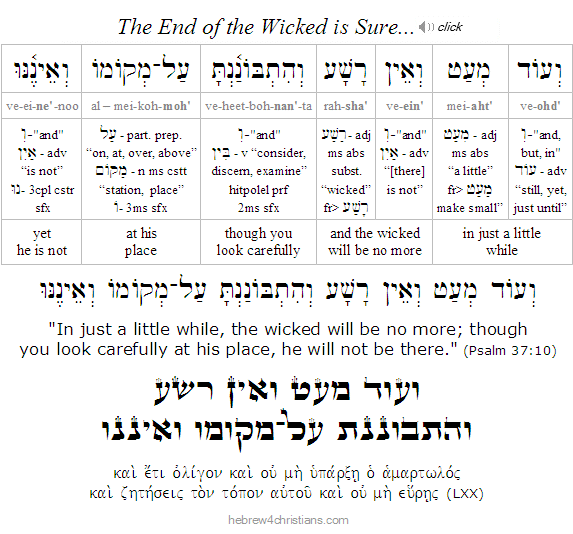
Just a little longer (ohd me'at) and there will be no wicked one (ve'ein rasha). Soon God will utterly vanquish wickedness, though in the present hour such hope might seem distant and far away. Stay strong in your desire for God's Name to be vindicated, for righteousness and love to shine as the noonday. Take hold of this vision through tevunah (understanding), and contemplate that there will be "no place" for the wicked one: wickedness itself will be driven away like dissipating smoke. Moreover, it is not only the wicked of this world, but our own inner wickedness that will find no place, for in the world to come we will be free from not only sin's influence but also sin's presence within our own hearts... Maranatha!
Getting Ready for Passover...

03.25.20 (Adar 29, 5780) Preparing for Passover usually begins a full month before the holiday arrives, just after the festival of Purim (or at the latest around the time of the New Year of spring, i.e., Nisan 1). Since no leavened bread may be eaten during all seven days of Passover, we make a special effort to remove leaven entirely from our homes, in obedience to the Torah's command (see Exod. 12:15). Spiritually understood, we remove chametz to symbolize that we are making a radical break from the past by becoming a new "substance," as Paul instructed: "Cleanse out the old leaven that you may be a new lump, as you really are unleavened: for Messiah our Passover Lamb has been sacrificed for us. Let us therefore celebrate the festival, not with the old leaven, the leaven of malice and evil, but with the unleavened bread of sincerity and truth" (1 Cor. 5:7-8). Note that the Greek text uses an imperative verb here (ἐκκαθάρατε): "You cleanse out (i.e., purge, as in catharsis) the old leaven so that you may become a new lump (ἵνα ἦτε νέον φύραμα)" since you have indeed been made new because of what Messiah has done for you." This is a matter of faith, friends, as you "become who you are" by means of trusting in the Salvation of the God of Israel.
 |
"A little leaven leavens the whole lump..." Chametz (i.e., leaven) is considered a corrupting influence, a hidden uncleanness that manipulates purer elements. Like the influence of a lump of leaven in a batch of dough, "spiritual" leaven functions as an evil impulse within us (i.e., yetzer ha'ra: יֵצֶר הַרָע) that corrupts and "sours" our soul. You cannot include a little sin in your life without it affecting your whole spiritual life. This "yeast in the soul" is essentially pride that manifests itself in idolatrous desires and lusts (the "puffed up" rise of the flesh in opposition to God). A practical way to observe the commandment to purge out the old leaven is not only to physically remove leaven from your home, but to look within you heart to see what corrupts and enslaves you in the physical, emotional, and intellectual realms of your life. Are you addicted to pleasure? power? approval from others? Are you enslaved to pride or fear? What holds your attention? What moves your behavior? This is part of the "search for chametz" in your life. Take a few moments to write down all the things that have enslaved you and then tear the list into small pieces. Before Passover arrives, take the torn pieces and burn them in a fire, symbolizing the end of your former life and the making of all things new. "Therefore if any person is in Messiah, he is a new creation: old things are passed away; behold, all things become new" (2 Cor. 5:17).
Related Topics:
Audio Discussions:
The Place of Atonement...
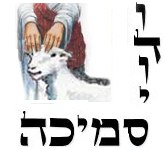
[ The following is related to our Torah portion for this week, parashat Vayikra... ]
03.25.20 (Adar 29, 5780) "He shall bring it (i.e., the sacrificial offering) to the entrance of the tent of meeting (אהֶל מוֹעֵד), that he may be accepted before the LORD. He shall lay his hand on its head and it shall be accepted for him to make atonement on his behalf (לְכַפֵּר עָלָיו). Then he shall slaughter it before the LORD, and Aaron's sons the priests shall bring the blood and throw the blood against the sides of the altar. Then he shall flay the offering and cut it into pieces..." (Lev. 1:3-6).
We are justified by faith, but that means we bring our hope to the appointed place where God meets with us. We have "access by faith into this grace wherein we stand" (Rom. 5:2), and that implies we trust that God gives us right standing on account of his great love. We come to the cross - the entrance of the tent - and "lean into" our Lord, identifying with his death as atonement on our behalf. As it is written: "God has ordained a place of atonement (i.e., ἱλαστήριος, or "mercy seat" [i.e., kapporet: כַּפּרֶת]), in the cross of Yeshua, accessible through faith in his blood, for the demonstration of His righteousness, so that God might be both just and the justifier of the one who has faith in Yeshua" (Rom. 3:25-26).
It has been noted that there were no prescriptions of words to be spoken during the semikhah/shechitah ceremony (i.e., sacrificial ceremony), no formulas or ritualized prayers. The sacrifice was performed in silence. The worshipper would firmly lay both hands on the head of the sacrificial victim and reflect that this animal's fate should really be his -- i.e., that he deserved to die for his sin. Only because of the LORD's mercy was this animal accepted in his place, and therefore the sacrificial rite was ultimately one of healing and restoration... This is the "korban" principle of "life-for-life." When the LORD saw the shed blood and ascending smoke of the sacrifice, He forgave the sinner based on his faith and teshuvah (repentance). The "sweet savor" (i.e., re'ach nicho'ach: רֵיחַ־נִיחוֹחַ) of the sacrifice refers to the future life (and healing) of the worshipper -- not the sacrifice itself. By itself -- apart from genuine repentance -- the sacrifice holds no power to forgive sin, and indeed, forgiveness is a relational concept (Matt. 5:24, 6:12, Isa. 1:11, etc.). In the Levitical system, the offering of a sacrifice served as a "symbol and expression of man's desire to purify himself and become reconciled to God" (Nehama Leibowitz: New Studies in Vayikra).
"God put forward Yeshua as a propitiation (ἱλαστήριον) through faith in His blood" (Rom. 3:25). The sprinkling of Yeshua's blood - represented by His Passion upon the cross - was "presented" upon the Heavenly Kapporet, before the very Throne of God Himself. Yeshua here functions as the great High Priest after the order of Malki-Tzedek (i.e., Melchizedek) who provides everlasting forgiveness for our sins (Heb. 9:7-10:10). Because of His sacrifice, the parochet - the wall-like covering separating the Holy of Holies - was rent asunder and God's love was let loose upon the world! Baruch Hashem! All those who are trusting in Yeshua as their atoning sacrifice before God (i.e., kapparah: כַּפָּרָה) are able to draw near to God full of confidence in his love (Heb. 4:16; Rom. 5:2; Eph. 3:12).
Blessed Need of Heart...
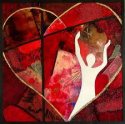
03.25.20 (Adar 29, 5780) "I need Thee every hour..." More than anything else, God's love is what we desperately need, isn't it? In moments of testing when we feel wounded, alone, unworthy, afraid, and needy; and especially when we succumb to the depths of despair... God's love descends to the depths of our soul - to the very dust of death itself - to hear our cries and to profoundly touch us... Praise the Name of Love - despite everything, God saves us from ourselves, from our worst fears, and from the hell of shame and abandonment. My soul yearns for you in the night; my spirit within me earnestly seeks you (Isa. 26:9). I say to the LORD, "You are my Lord; I have no good apart from you."
אָמַרְתְּ לַיהוָה אֲדנָי אָתָּה
טוֹבָתִי בַּל־עָלֶיךָ
a·mart' · la·do·nai · a·do·nai · a'·tah
tov·va·tee · bal - a·ley'·kha

"I say to the LORD, "You are my Lord;
I have no good apart from you."
(Psalm 16:2)
Hebrew Study Card

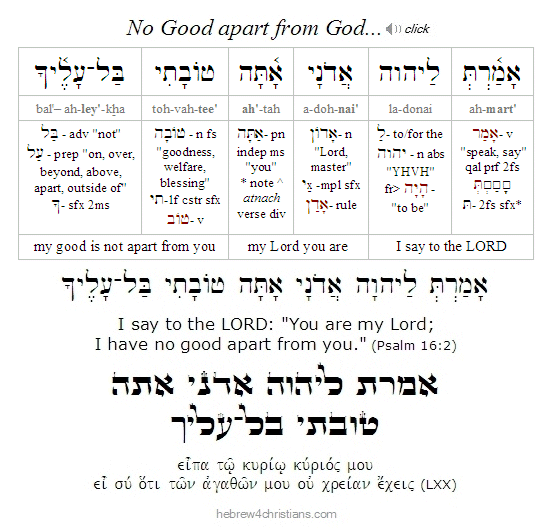
The ongoing need for the LORD is perhaps the highest estate of the human soul, even if it is nevertheless attended with heartsickness and unrelenting longing. It is a great, great gift from heaven to know God as your heart's true desire - to fully understand that your relationship with Him is the ultimate concern and treasure of your existence.
Remembering the Future...

03.25.20 (Adar 29, 5780) God's Name YHVH (יהוה) means "Presence" and "Love," and there is no power in heaven or earth that can overrule His hand. Therefore even if the prophesied "End of Days" were to begin this very hour, our responsibility is to focus on the Divine Presence and to walk in His truth and love. As King David said, "I have set the LORD always before me; because He is at my right hand, I shall not be shaken" (Psalm 16:8).
שִׁוִּיתִי יְהוָה לְנֶגְדִּי תָמִיד
כִּי מִימִינִי בַּל־אֶמּוֹט
shee·vee'·tee · Adonai · le·neg·dee · ta·meed
kee · mee·mee·nee · bal - e·moht

"I have set the LORD always before me;
because he is at my right hand, I shall not be shaken"
(Psalm 16:8)
Hebrew Study Card

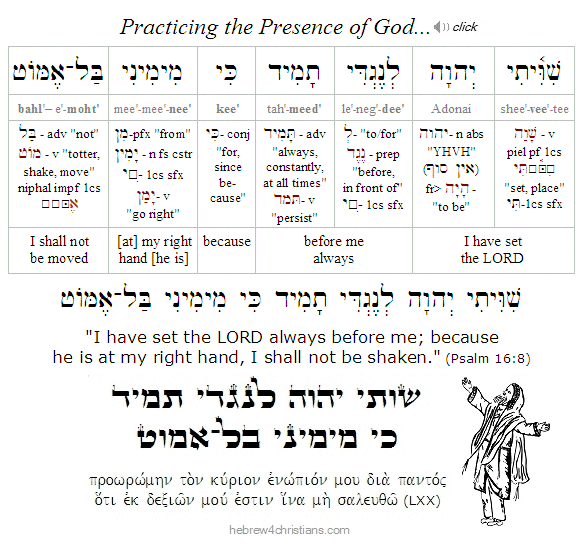
Encourage yourself by remembering that there is a future of healing and deliverance coming to us, though we must abide in the shadow of its substance for a bit longer: "For behold, the Day is coming (היום בא), burning like an oven, when all the arrogant and all evildoers will be stubble. The Day that is coming shall set them ablaze, says the LORD of hosts, so that it will leave them neither root nor branch. But for you who fear my Name, the Sun of Righteousness (שׁמשׁ צדקה) shall rise with healing in its wings. You shall go out skipping like calves released from the stall. And you shall tread down the wicked, for they will be ashes under the soles of your feet, on the day when I act, says the LORD of hosts" (Mal. 4:1-3).
This awesome passage from the Book of Malachi primarily applies to the Second Coming of Yeshua and the great "Day of the LORD" (יוֹם יהוה). The "Sun of Righteousness," shemesh tzedakah (שׁמשׁ צדקה), refers to Messiah son of David, the risen life-giving Healer of God. Of Him it is said, "The LORD God is a sun and a shield" (Psalm 84:11) and "the LORD shall be to thee an everlasting Light (אור עולם), and thy God thy glory; thy sun shall no more go down, for the Lord shall be thine everlasting light" (Isa. 60:19-20). The Divine Light will shine on those who receive God's righteousness, that is, on those who put their trust in the One who said, 'I am the Light of the world' (John 8:12). Shine Your Light upon us, O LORD!
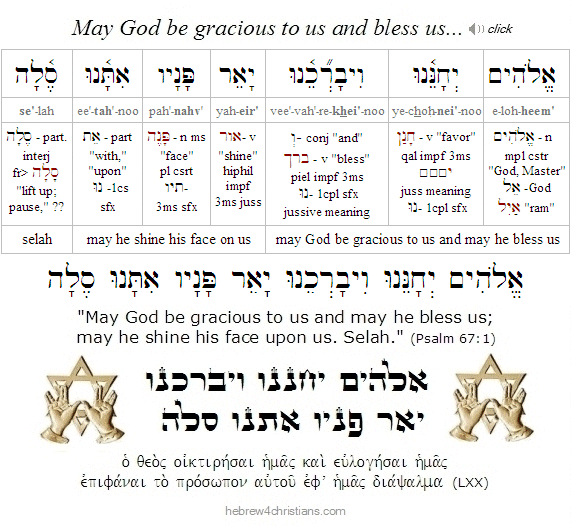 |
Awakening to Judgment...
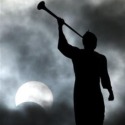
03.24.20 (Adar 28, 5780) As we draw closer to the appointed "End of Days," it is crucial that we gird ourselves by recalling the truth of God and by refusing to embrace the world and its despair... The coronavirus may be a foreshock of judgment upon the world system that scorns the truth of God, though the real judgment may come not so much in the form of the virus itself, but from the control measures instituted by godless worldly powers that seek to capitalize on the disaster... In this time of divine judgment, we must keep our eyes focused heavenward, trusting in the LORD God Almighty (כֹּל יָכוֹל), invoking Yeshua who is the only Savior (המושיע היחיד). Just as the patriarch Noah foresaw the great cataclysm to come, so we understand that the world above our heads and under our feet is likewise destined to destruction, as we also await the promised world to come. As it is written in our Scriptures: "Lift up your eyes to the heavens, and look at the earth beneath; for the heavens vanish like smoke, the earth will wear out like a garment, and they who dwell in it will die in like manner; but my salvation will be forever (ישׁוּעתי לעולם תהיה), and my righteousness will never be dismayed" (Isa. 51:6). Amen. "The grass withers, the flower fades, but the Word of our God will stand forever" (Isa. 40:8).
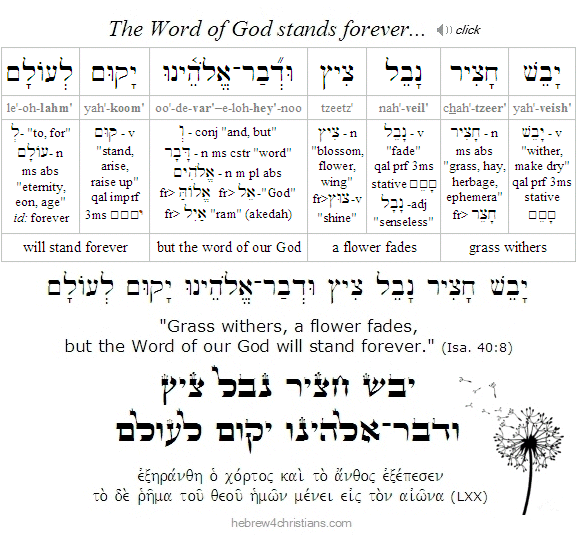 |
Faith sees the invisible... Our father Abraham was promised descendants as numerous as the stars in the sky or sand on the seashore, despite the fact that he was an old man and his wife had long past the age of bearing children. Abraham believed in the One who gives life to the dead and calls into existence the things that do not exist: "He staggered not at the promise of God through unbelief but was strong in faith, giving glory to God; and being fully persuaded that, what He had promised, He was able also to perform: And therefore it was imputed to him for righteousness" (Rom. 4:19-22). Faith in God trusts in an unseen good, apprehends a future and a hope, and refuses to allow this world to have the last word of what is ultimately real. Therefore, like Abraham, we are "strangers and exiles on the earth, looking forward to the city that has foundations, whose designer and builder is God" (2 Cor. 4:18; Rom. 1:20; Heb. 11:10,13).
From C.S. Lewis:
"The human spirit will not even begin to try to surrender self-will as long as all seems to be well with it. Now error and sin both have this property, that the deeper they are the less their victim suspects their existence, they are masked evil. Pain is unmasked, unmistakable evil; every man knows that something is wrong when he is being hurt. And pain is not only immediately recognisable, but evil impossible to ignore. We can rest contentedly in our sins and our stupidities; and anyone who has watched gluttons shovelling down the most exquisite foods as if they did not know what they were eating, will admit that we can ignore even pleasure. But pain insists upon being attended to. God whispers to us in our pleasures, speaks in our conscience, but shouts in our pain: it is His megaphone to rouse a deaf world.
I am progressing along the path of life in my ordinary contentedly fallen and godless condition, absorbed in a merry meeting with my friends for the morrow or a bit of work that tickles my vanity today ... when suddenly a stab of abdominal pain that threatens serious disease, or a headline in the newspapers that threatens us all with destruction, sends the whole pack of cards tumbling down. At first I am overwhelmed, and all my little happinesses look like broken toys. Then, slowly and reluctantly, bit by bit, I try to bring myself into the frame of mind that I should be in at all times. I remind myself that all these toys were never intended to possess my heart, that my true good is in another world, and my only real treasure is Christ. And perhaps, by God's grace, I succeed, and for a day or two become a creature consciously dependent on God and drawing its strength from the right sources.
But the moment the threat is withdrawn, my whole nature leaps back to the toys: I am even anxious, God forgive me, to banish from my mind the only thing that supported me under the threat because it is now associated with the misery of those few days. Thus the terrible necessity of tribulation is only too clear. God has had me for but forty-eight hours and then only by dint of taking everything else away from me. Let Him but sheathe that sword for a moment and I behave like a puppy when the hated bath is over -- I shake myself as dry as I can and race off to reacquire my comfortable dirtiness, if not in the nearest manure heap, at least in the nearest flower bed. And that is why tribulations cannot cease until God either sees us remade or sees that our remaking is now hopeless." (C.S. Lewis, The Problem of Pain; 1940).
Expelling the Darkness...

[ "For our struggle is against spiritual forces of evil..." Eph. 6:12 ]
03.24.20 (Adar 28, 5780) Human life is a battleground of forces, and each person is engaged in a spiritual war for the healing of their soul... Often we are not willing to enter the battle until we have been sufficiently wounded by own own sins: many of us have to become "sick of being sick" until we are ready to seriously engage the underlying issues.
The battle is not optional. We must learn to deal with our own inner struggle against evil. Before we can help others to be free, however, we must be free ourselves, and that means learning how to expel the darkness hidden within our own hearts and to walk in God's light. Deliverance means being set free from that which "possesses" us, and that includes the demonic strongholds of fear, anger, envy, lust, and so on. Overmastering impulses can lead the soul to dark thoughts, self-alienation, shame -- a tenuous existence of subjugation and pain. The way of deliverance is to "name the demon," that is, to challenge the ground it claims and to exercise divine authority over our hearts. Above all this means being honest about our struggle and taking a decisive stand against our own oppression... Fighting the "good fight of faith" means caring enough to be healed...
We can only face the demonic if we are willing to be honest with ourselves, for without genuine honesty we cannot see our condition. "A little leaven leavens the whole lump" (Gal. 5:9). We must be willing to confess that there is much within us that remains unhealed, and that we are often unmindful of what really motivates our behavior. Even those things we might suppose as good - our religion or our self-control, for example - can possess us in ways that bring harm to ourselves and others....
When Yeshua expelled the demonic, the afflicted soul was given inner peace and put into their "right mind" (Mark 5:15). In other words, deliverance from madness is linked to God's healing influence in our lives: "For God has not given us a spirit of fear, but of power, and of love, and of a sound (safe) mind" (2 Tim. 1:7). Note that the word translated "safe" comes from the verb sodzo (σῴζω), meaning to be healed from destructive inner conflict. A delivered person has "inner balance" and is not easily overthrown by his conscious (or unconscious) passions. Such a person is grounded in reality: he knows who he is, what he needs, and is realistic about what he can and can't do. His soul is not divided but rather unified, centered, and focused. He is consciously present and accepts life without resistance.
Yeshua gives us "authority" over the demonic to heal (Luke 9:1). The Greek word authority, eksousia (ἐξουσία), is a compound formed from the preposition ek- (ἐκ), meaning "out of," and the noun ousia (ουσία), meaning "being" or substance, thereby suggesting power over physical and spiritual reality. Another way to understand the word, however, is to see it as the ability to see beyond the realm of the transient abide within the realm of the Eternal. The Father represents the unseen, the infinite, the supreme providential and transcendental aspects of the One true God, just as the Son represents the seen, the finite, the suffering and immanent aspects of God... They are One (similarly the Holy Spirit is the Spirit of God, and therefore is One with God). Yeshua was entirely submitted to the will of the Father, which means he was able to let go and trust in the all-encompassing Divine Presence. His life was grounded in his relationship with the Eternal: "He that has seen me has seen the Father" (John 14:9). Since Yeshua lived in complete unity or "oneness" with God, he was completely centered and fully conscious of his identity as God's Son. His authority came from being preoperly aligned or related to God the Father, that is, ultimate reality, which enabled him to be a vessel or conduit for the expression of God in the world.
The Scriptures state: "Yield yourselves to God; take a stand against the devil and he will flee from you" (James 4:7). We first ground ourselves in what is real - surrendering and accepting the given moment - and then we decisively refuse to be taken captive by our imagination, fear, lust, etc. When we turn to the light the darkness will be expelled (John 1:5). Let's choose life and therefore live (Deut. 30:19); let's take our stand against the powers of hell; let's repudiate our fears and "spiritually slay" whatever seeks to drive and control us. May our hearts grow quiet before the Divine Presence and abide in peace...
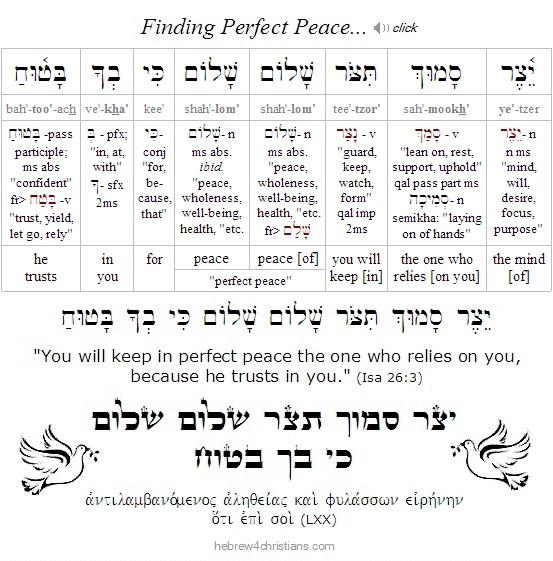 |
The Bread of Presence...
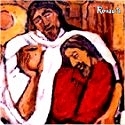
03.24.20 (Adar 28, 5780) Our Master said: "For the bread of God (לחם האלהים) is the One who comes down from heaven to give life to the world" (John 6:33). This is the Bread of Presence, literally, the "Bread of [his] Face" (לחם פנים) that was prefigured in the manna that fell in the desert and in the rituals of the Tabernacle (Exod. 25:30). It was in the Holy Place, in the light of the Menorah, that the "bread of his face" was to be eaten... At his last Passover Seder with his students, Yeshua said "this is my body" (τοῦτό ἐστιν τὸ σῶμά μου), and made analogy between physical and the spiritual. We metaphorically "eat his flesh and drink his blood," by seeing Him as our altar, our bridge before the Father. Just as the heart is the means by which blood is distributed to the body, so with the love of God expressed in our Lord Yeshua. He is the Divine Center of all of life: the true Tabernacle, the Word made flesh. He is the true Bread of Life (לחם החיים), and we receive spiritual strength when we abide in his Torah (תורה) and his life (John 15:5).
 |
Torah of the Spirit of Life...
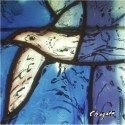
03.24.20 (Adar 28, 5780) Regarding the question of faith, Soren Kierkegaard once wrote, "The easiness of Christianity is distinguished by one thing only: by the difficulty. Thus the Master's yoke it easy and its burden light -- for the person who has cast off all his burdens, all of them, the burdens of hope and of fear and of despondency and of despair -- yet it is difficult." Yes, the difficult thing is to truly believe, to truly let go (John 16:31). Sins can be like great possessions that are difficult to give up. Among other things, we must forgive ("give away") our sins (both our own and those against us), and that means trusting God enough to bear our wounds for us. Forgiveness allows us to move on with our lives by letting go of the pain of the past (2 Cor. 5:16). It is "easy" to understand this, but it is difficult to live it.
The difficulty, I repeat, is to genuinely believe that the love's miracle is for you - and that therefore you really are a "new creation" in the Messiah (2 Cor. 5:17). The reason this is difficult is because we are still living in an "already-not-yet" place of exile, the "two-souled" state of being that only is able to "see through a glass darkly." We are trusting in God, yet we must "work out" our own salvation with fear and trembling (Phil. 2:12). But notice that we "work out" what God has already "worked in," since it is "God who works in you both to will and to do His good pleasure" (Phil. 2:13). Please do not miss this - God first works His love into our hearts, and then we are able to express that in works of love... From start to finish, only genuine faith in Yeshua performs the "work of God" (John 6:28-29), and never our own ludicrous efforts of affecting self-righteousness (Titus 3:5). If you are lacking in the fruit of the Spirit (i.e., the works of God), then the right approach is to turn around and confess your faithlessness: "Lord, I believe; help Thou my unbelief..." (Mark 9:24). Our LORD is near to the brokenhearted and saves the crushed in spirit (Psalm 34:18).
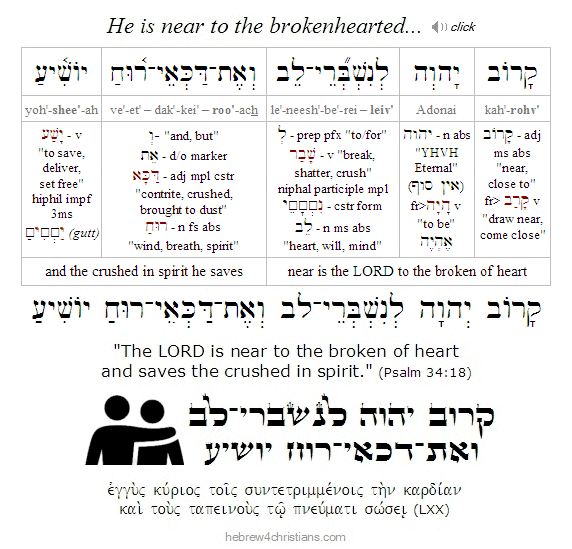 |
Some people might argue that you must "deny yourself" and "die to yourself" to exercise genuine faith, and while it is indeed true that "unless a seed falls to the ground and dies, it abides alone" (John 12:24), we must remember that the Seed is Yeshua and the power of His Spirit sown in the heart of faith. "Taking up the cross" therefore means so identifying with Yeshua that you are "in union" with his sacrificial death offered up on your behalf. God imparts a new spiritual nature (i.e., heart and spirit) to the one that trusts in Him, an operation of the Spirit that is more manifest than the sun that shines in the clear noonday sky... Taking up the cross is therefore the confession that Yeshua's sacrifice is all-sufficient and therefore all that remains is to continue to trust in his finished work (John 6:29). We are sanctified in exactly the same way we are justified -- by trusting in the miracle of God. Remember, all the imperatives of Scripture are addressed to the "new man" that has been brought to life by God's grace. We are able to obey when we yield to the Torah of the Spirit of Life (תורת רוח החיים) in the Messiah, which is to say, when we are trusting in Yeshua to do and to be all that we will ever need. We do not "die to ourselves" by means of our own efforts, but instead rest in the peace of Yeshua's sacrificial death (and resurrection) for us.
The Sacrificial Lamb of God...
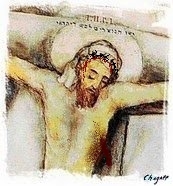
[ The advent of New Year of Spring (ראש השנה האביב) portends that Passover will be here in just two short weeks, with the Passover Seder held on Monday evening, April 8th... ]
03.23.20 (Adar 27, 5780) The Bible has been described as a "book of blood and a bloody book." The recurrent theme of the sacrificed lamb reappears throughout, including the very first sacrifice in the garden to cover the sin of Adam and Eve (Gen. 3:21); the lamb sacrificed in place of Isaac during the ordeal of the Akedah (Gen. 22:13), the sacrifice of the Passover lamb on the eve of the Exodus (Exod. 12:5-8); and the tamid (daily) offering of the lamb at the Temple (Exod. 29:38; Num. 28:3; Ezek. 46:13) -- all of which prefigured the sacrificial death of Messiah as the "Lamb of God" (שֵׂה הָאֱלהִים) who takes away the sins of the world (John 1:29). Yeshua is the Substance of all that the sacrifices foreshadowed; he is the "Goel" (i.e., גּאֵל, Redeemer) from the alienation and exile caused by our sin (Gal. 3:13). "Worthy is the Lamb who was slain, to receive power and wealth and wisdom and might and honor and glory and blessing!" (Rev. 5:12).
The Torah makes it clear that blood (דָּם) is used as a means of consecration as well as a means of obtaining atonement (כַּפָּרָה) with God. Blood was used on the doorposts of the houses in Egypt to ward off judgment and was later used to ratify the covenant given at Sinai (Exod. 24:8). All the elements of Mishkan (Tabernacle) were likewise "separated" by its use: The altar, the various furnishings of the Temple, the vestments of the priests, and even the priests themselves were sanctified by blood (Exod. 29:20-21, Heb. 9:21). But ultimately blood was used to "make atonement" for the soul upon the altar. As the Torah (Lev. 17:11) plainly states: "For the life of the flesh is in the blood (כִּי נֶפֶשׁ הַבָּשָׂר בַּדָּם), and I have given it for you on the altar to atone (לְכַפֵּר) for your souls, for it is the blood that makes atonement by the life (כִּי־הַדָּם הוּא בַּנֶּפֶשׁ יְכַפֵּר)." Blood is therefore connected to the holiness of life through sacrificial death....
The first time the word "blood" occurs in the Scriptures concerns the death of Abel (הֶבֶל), the son of Adam and Eve who was murdered by his brother Cain. After Abel's blood was shed, the LORD confronted Cain and said, "What have you done? The voice of your brother's blood (קוֹל דְּמֵי אָחִיךָ) is crying to me from the ground" (Gen. 4:10). Since blood is the carrier of life, it bears the energy and vitality of life: it has its own spiritual "voice." Likewise, the blood of Yeshua (דְּמֵי יֵשׁוּעַ), the true Lamb of God who died upon the cross, speaks on our behalf, and reverses the power of death by creating a barrier that death can no longer cross, since the death of the sacrificial victim "exchanges" the merit and power of life. Unlike the blood of Abel that "cries out" for justice, the blood of Yeshua cries out for mercy (Heb. 12:24).
Note: For more on this important topic, see "Parashat Vayikra: Why the Sacrifices?" and "The Life is in the Blood: Further Thoughts on Parashat Bo."
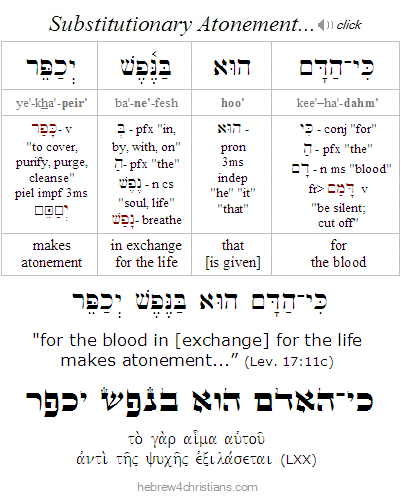 |
Torah of Atonement (תורה וכפרה)
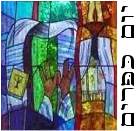
[ The following is related our Torah reading for this week, parashat Vayikra... ]
03.23.20 (Adar 27, 5780) The Torah's emphasis on blood atonement confounded post-Temple Jewish thought, so that the sages of the first and second centuries created "Judaism without a Temple" by claiming that "study, prayer, and good deeds" would replace the need for sacrifices at the Temple. Nevertheless, the Torah clearly affirms the need for blood atonement, and indeed over 40% (247) of the 613 mitzvot (commandments) concern the ceremonial laws of the Mishkan (Tabernacle). The Book of Leviticus is the central book of the Torah, and blood atonement by an innocent, sacrificial victim is at the heart of the law given to the priests of Israel. The Torah makes it clear that blood (דָּם) is used as a means of consecration as well as a means of obtaining atonement (כַּפָּרָה) with God. Blood was used on the doorposts of the houses in Egypt to ward off judgment and was later used to ratify the covenant given at Sinai (Exod. 24:8). All the elements of Mishkan (Tabernacle) were likewise "separated" by its use: The altar, the various furnishings of the Temple, the vestments of the priests, and even the priests themselves were sanctified by blood (Exod. 29:20-21, Heb. 9:21). But ultimately blood was used to "make atonement" for the soul upon the altar. As the Torah (Lev. 17:11) plainly states: "For the life of the flesh is in the blood (כִּי נֶפֶשׁ הַבָּשָׂר בַּדָּם), and I have given it for you on the altar to atone (לְכַפֵּר) for your souls, for it is the blood that makes atonement by the life (כִּי־הַדָּם הוּא בַּנֶּפֶשׁ יְכַפֵּר)." Blood is therefore connected to the holiness of life through sacrificial death.... Despite the sage's invention of "Judaism" without the Temple, the Torah emphatically teaches that blood is connected to the holiness of life through sacrificial death...
Unlike the "rational" (i.e., Greek) approach of the post Second Temple Pharisees, the medieval Torah commentator Nachmanides (1194-1270), or the "Ramban," regarded the sacrifices as the means to express teshuvah (repentance) by trusting in God's substitutionary sacrifice given in place of the sinner. Since we all sin by means of impure thoughts, speech, and actions, God required that when a sacrifice was presented, the sinner's hands would lean into the animal, and then he would confess with his mouth before burning the innards (kidney, fat, etc., regarded as the source of thought and lust), while pouring the blood beside the altar, "thinking that he himself is worthy of having his own blood spilled and body burned, were it not for the love of God who had received a substitute for him (an exchange) - the sacrifice atoning for him, its blood shed for his blood, its life-force for his life-force" (Nachmanides' Commentary on the Torah). In other words, there is an identity between the sinner and the sacrifice, though to be efficacious, the sinner must have faith, be moved, and turn to personally receive God's mercy and love. The sacrifice is for the sinner's sake, to help us to draw close to God, to awaken within us the desire to change. The trauma of the sacrifice is meant to so deeply move the heart that we will turn away from our apathy and indifference... Participating in the sacrifice is meant to resolutely turn our hearts back to God: As you consider the blood shed and the suffering endured so that you could be forgiven, you better appreciate the terrible cost of your sin and the awesome grace given for your sake... (Were you there when they crucified my Lord?)
Note: For more on this subject, see Parashat Vayikra: Why the Sacrifices? and "Rabbis who deny Blood Atonement."
The Biblical New Year...

[ The Biblical New Year begins Wednesday, March 25th at sundown this year... ]
03.22.20 (Adar 26, 5780) The first day of the month of Nisan marks the start of the Biblical Year, since it recalls the the month of the Exodus from Egypt and the beginning of Jewish national history. It is also the first month used for counting the festivals (mo'edim) of the Hebrew Calendar and for reckoning the years of reign of the Kings of Israel. The New Year begins at the appearance of the first "new moon" of spring (אביב), that is, when the waxing crescent of the moon is first sighted, which the Torah calls Rosh Chodashim (ראשׁ חֳדָשִׁים), "the head of the months," and its observance is considered the very first commandment given to Israel before the great Exodus from Egypt took place (see Exod. 12:1-2).
![Spring Holiday Timeline (H4C]](../../../../About_HFC/Site_News/Archive-2020/March/roshchodeshim-line.gif) |
The commandment to sanctify the first new moon of the year (i.e., Rosh Chodashim) reveals that it is our responsibility to sanctify (i.e., observe) Biblical time in general. In other words, when we observe "the beginning of months," we are acknowledging that time itself is rooted in the Biblical calendar with its divinely inspired cycle of festivals (i.e., the moedim). Note that this year the Biblical New Year begins on Wed., March 25th at sundown, and therefore Passover begins exactly two week weeks later, Wed. April 8th at sundown.
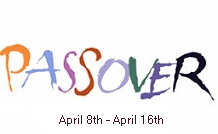 |
 |
Corona Virus Note: Because of our responsibility to practice "social distancing" due to the coronavirus outbreak, we are prayerfully considering whether we should postpone our family Passover Seder this year, as is permitted in the Scriptures. The Torah states that if you are unable to attend the Passover Seder at the appointed time due to legitimate reasons (e.g., medical issues) you may observe it exactly 30 days later on Iyyar 14 (Num. 9:9-12). This is called Pesach Sheni (פסח שני), or "Second Passover." I will let you know what we decide to do as a family, though I will be posting about the holiday over the next couple weeks regardless, and we will honor the Passover on Nisan 15 as well, even if we reschedule our larger family seder to the following month. ברוך יהוה על כל הדברים - הטובים והרעים.
The LORD Calls Out - ויקרא
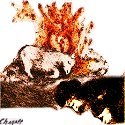
[ This week we begin a new book of Torah, sefer Vayikra (i.e., the book of Leviticus)... ]
03.22.20 (Adar 26, 5780) Our Torah reading for this week is Vayikra ("and he called"), the very first portion from the Book of Leviticus (ספר ויקרא). In Jewish tradition, the Book of Leviticus is sometimes called the "Book of Sacrifices" (ספר הזבחים) since it deals largely with the various sacrificial offerings brought to the altar at the Mishkan (i.e., Tabernacle). Indeed, over 40 percent of all the Torah's commandments are found in this central book of the Scriptures, highlighting that blood atonement is essential to the Torah. Indeed, since the revelation of the Tabernacle was the climax of the revelation given at Sinai, the Book of Leviticus serves as its ritual expression, as it is written: "For the life of the flesh is in the blood, and I have given it for you on the altar to make atonement for your souls, for it is the blood that makes atonement (kapparah) by the life" (Lev. 17:11).
Unlike narrative portions of other books of the Torah, the Book of Leviticus begins with the LORD "calling out" (i.e., vayikra) to Moses to explain that the way to draw near to Him is by means of atoning sacrifice. It is noteworthy that throughout the book, only the sacred name of the LORD (יהוה) is used in connection with sacrificial offerings, and never the name Elohim (אלוהים). This suggests that sacrificial offerings were given to draw us near to experience God's mercy and compassion rather than to simply appease His anger.... In other words, the Name of the LORD represents salvation (i.e., yeshuah: ישועה) and healing for the sinner, not God's judgment (John 3:17). Indeed, the word korban (קרבן), often translated as "sacrifice" or "offering," comes from a root word karov (קרב) that means to "draw close" or "to come near" (James 4:8). The sinner who approached the LORD trusting in the efficacy of the sacrificial blood shed on his or her behalf would find healing and life...
Note that the word in the ancient Greek translation of the Torah (called the Septuagint) that was selected to translate the Hebrew word kapporet (i.e., כפרת, "mercy seat") is hilasterion (ἱλαστήριον), sometimes translated "propitiation." The New Testament picks up this usage in Romans 3:25: "God put forward Yeshua as a propitiation (ἱλαστήριον) through faith in His blood." In other words, the shedding of Yeshua's blood - represented by His Passion upon the cross - was "presented" upon the Heavenly Kapporet, before the very Throne of God Himself for our atoning sacrifice (i.e., kapparah: כפרה) before God.
New Audio Podcast:
Faith and Tribulation...
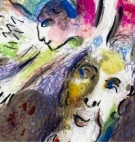
03.20.20 (Adar 24, 5780) During this time of uncertainty and fear due to the rise of the deadly corona virus (Covid-19), many are struggling to find hope. In this audio podcast (see link below) I discuss the struggle of faith and how we find peace by accepting the sovereignty and greatness of the LORD. I hope to encourage you to walk in faith, trusting that the LORD is with you and will surely help you through all things. Chazak, chaverim!
Do not lose heart...

03.20.20 (Adar 24, 5780) I know many of you are in pain, struggling to hang on to hope, waiting for the fulfillment of the promise of your salvation in Yeshua. Keep the fire of your heart burning, friend... Rabbi Nachman once told a person who was struggling with his faith: "It is written that all creation was brought into being because of people like you. God saw there would be people who would cling to our holy faith, suffering greatly because confusion and doubt would plague them. God perceived that such would overcome these doubts and troubles of heart and remain strong in their belief. It was because of this that God brought forth all creation." Amen. Never yield to despair, since that leads to further darkness and fear. Press on and keep fighting the "good fight" of faith (1 Tim. 6:12). Remember that you infinitely matter to heaven; your life has great value; you are significant and you are truly loved by our Heavenly Father. There is a "future and a hope" reserved for you; there is "a white stone, and on that stone will be written a new name that no one can understand except the one who receives it" (Rev. 2:17). May "the trial of your faith, being much more precious than of gold that perishes, though it be tested with fire, be found to result in praise and glory and honor at the revelation of Yeshua the Messiah" (1 Pet. 1:7).
כִּי אָנכִי יָדַעְתִּי אֶת־הַמַּחֲשָׁבת
אֲשֶׁר אָנכִי חשֵׁב עֲלֵיכֶם נְאֻם־יְהוָה
מַחְשְׁבוֹת שָׁלוֹם וְלא לְרָעָה
לָתֵת לָכֶם אַחֲרִית וְתִקְוָה
kee · a·no·khee · ya·da'·tee · et – ha·mach·sha·voht
a·sher · a·no·khee · cho·sheiv · a·ley·khem · ne·oom – Adonai
mach·she·voht · sha·lom · ve·lo · le·ra·ah
la·teit · la·khem · a·cha·reet · ve·teek·vah

"For I know the plans that I have for you, declares the LORD,
plans for blessing and not for evil, to give you a future and a hope."
(Jer. 29:11)

Hebrew Study Card
"I am sure of this, that he who began a good work in you will bring it to completion (ἐπιτελέω) at the Day of Yeshua the Messiah" (Phil 1:6). The LORD is able to guard you (φυλάξαι) from stumbling and to present you blameless before the presence of His glory with great joy (Jude 1:24). "The LORD upholds all who are falling and raises up all who are bowed down" (Psalm 145:14). "He will sustain you to the end, guiltless in the Day of our Yeshua the Messiah" (1 Cor. 1:8). He who calls you is forever faithful; He will surely do it (1 Thess. 5:24). Yea, "the Lord is faithful (נֶאֱמָן הוּא): He will establish you and guard you against the evil one" (2 Thess. 3:3). The Spirit says, "Fear not, for I AM with you always."
Shabbat Shalom and take heart, dear friends... The day draws near!
The Beginning and End...

[ The following is related to this week's Torah reading, parashat Pekudei... ]
03.20.20 (Adar 24, 5780) The final portion of the Book of Exodus (i.e., Pekudei) provides details about the construction of the Tabernacle (המשׁכן) and its furnishings as well as the special clothing of the priests. At the end of the portion we read, ויכל משׁה את־המלאכה / "Moses finished all the work" (Exod. 40:33), a phrase that has the same gematria (numeric value) as bereshit (בראשׁית, "in the beginning"), the very first word of the Torah (Gen. 1:1). This suggests that the very creation of the universe was for the sake of the building a dwelling place for God, and by extension, for the sake of the sacrificial love of God to be demonstrated to all of the creation. The Talmud states, "All the world was created for the Messiah" (Sanhedrin 98b) and indeed, Yeshua is called "the Lamb slain from the foundation of the world" in the New Testament (Rev. 13:8; 1 Pet. 1:18-20; Eph. 1:4; 2 Tim. 1:9). "All things were created by Him (i.e., Yeshua), and for Him" and in Him all things consist (συνεστηκεν, lit. "stick together") (Col. 1:16-17). Indeed ff Yeshua it is written: πάντα δι᾽ αὐτοῦ ἐγένετο, καὶ χωρὶς αὐτοῦ ἐγένετο οὐδὲ ἕν. ὃ γέγονεν, "All things came to be through Him, and without Him nothing came to be that exists" (John 1:3). Creation therefore begins and ends with the redemptive love of God as manifested in the Person of Yeshua our Messiah, the great Lamb of God (שׂה האלהים) and the Savior of the world (מושיע העולם). Yeshua embodies the Heart of Creation - the Aleph and Tav (אלף ותו) - the Beginning and the End (ראשׁ וָסוֹף), and is named as "the One who is, and was, and is to come" (הַהוֶה וְהָיָה וְיָבוֹא), even the LORD God Almighty (Isa. 44:6; Rev. 1:17).
Some of the sages have said that "the seal of God is truth," since the final letters of the three words that conclude the account of creation -- ברא אלהים לעשׂות ("God created to do" [Gen. 2:3]) -- spell the Hebrew word for truth (i.e., emet: אֱמֶת):
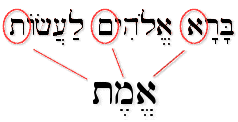 |
The idea that God created the world "to do" implies that He had finished all His work of creation (and redemption) after the sixth day (Heb. 4:3), which is another way of saying that Yeshua is the Lamb slain from the foundation of the world. "All the world was created for the Messiah." Salvation is not an afterthought or "plan B" of God's purpose for creation. "Before Abraham was, I AM." Our LORD Yeshua always is the Way, and the Truth, and the Life for us (John 14:6). As it is written of Messiah: "Worthy are you, our Lord and God, to receive glory and honor and power, for you created all things, and by your will they existed and were created" (Rev. 4:11). Blessed is the Name of the LORD forever and ever....
The Narrow Door...

03.20.20 (Adar 24, 5780) "Strive to enter through the narrow door. For many, I tell you, will seek to enter and will not be able" (Luke 13:24). The narrow door is the way of humility, assuming a low position, crawling, if you will, and making yourself small... It is the way of the cross of Messiah, confessing the truth of our condition and trusting in God alone for deliverance.. The narrow door is the way of faith - trusting God's compassion and righteousness given on your behalf. The large, wide-open door is designed for the crowd and its various idols. Beware of the world that seeks to assimilate the soul: beware of becoming part of the crowd! The individual is lost and overwhelmed in the midst of the crowd and its momentum. The crowd assimilates the soul, laughs at the notion of individual responsibility, and abandons itself to the gravity of purely natural forces... The life of faith, on the other hand, refuses to regard the individual human heart as a triviality. Faith is an individual struggle, a walk into unknowing; it is the way of the sojourner who feels uneasy in this world of shadows... God is always with us and helps us stay strong and resolute, even as we struggle through the darkness of this age. Press on, chaverim! Do not lose sight of your high calling in Yeshua. The day and the hour draw near!
Meta-Themes of Exodus...
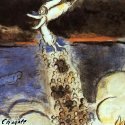
[ The following is related to this week's Torah reading, parashat Pekudei... ]
03.20.20 (Adar 24, 5780) Shalom Chaverim. This week we end our scheduled reading from the Book of Exodus (ספר יציאת מצרים) for the current year, so I thought it would be good to take a moment to reflect on the book's overall message for us, especially because we are entering into the season of Passover....
The theme of the Book of Exodus essentially turns on two great events, namely, the deliverance of the Israelites from their bondage in Egypt (i.e., yetzi'at Mitzraim: יציאת מצרים) and the subsequent revelation given at Sinai (i.e., mattan Torah: מתן תורה). Both of these events, however, are grounded in the deeper theme of God's faithful love (אהבת יהוה) combined with the need for blood atonement (כפרת דם). With regard to the former, the blood of the Passover lamb (דם הפסח) was required to cause death to "pass over" (i.e., pasach: פסח) the houses of the Israelites; with regard to the latter, the sacrificial system (i.e., the Mishkan or "Tabernacle") was required to draw near to God.
Jewish tradition tends to regard the giving of the law at Sinai to be the goal of the entire redemptive process (מטרת הגאולה), a sort of "return from Exile" to the full stature of God's chosen people. Some of the sages have taken this a step further by saying that God created the very universe so that Israel would accept the Torah. Such traditions, it should be understood, derive more from Jewish rabbinical thinking codified after the destruction of the Second Temple than from the narrative presented in the written Torah itself, since is clear that the climax of the revelation at Sinai was to impart the pattern of the Mishkan (תּבנית המשׁכן) to Moses. In other words, the goal of revelation was not primarily to impart a set of moral or social laws, but rather to accommodate the Divine Presence in the midst of the people. This is not to suggest that the various laws and decrees given to Israel were unimportant, of course, since they reflected the holy character and moral will of God. Nonetheless, it is without question that the Torah was revealed concurrently with the revelation of the Sanctuary itself, and the two cannot be separated apart from "special pleading" and the suppression of the revelation given in the Torah itself... The meticulous account of the Mishkan is given twice in the Torah to emphasize its importance to God. This further explains why Leviticus is the central book of the Torah of Moses.
As we consider these things, however, it is important to realize that underlying the events surrounding deliverance and revelation is something even more fundamental, namely, the great theme of faith (נושא האמונה). This theme is our response to God's redemptive love. God's love is the question (השאלה), and our response - our teshuvah - is the answer (התשובה). The great commandment is always to "choose life" (לבחור בחיים). We must chose to turn away from the darkness to behold the Light... Jewish tradition states there were many Jews who perished in Egypt during the Plague of Darkness (מכת החושך) because they refused to believe in God's love. Likewise, the revelation at Sinai failed to transform the hearts of many Jews because they despaired of finding hope...
As glorious as the redemption and revelation was, then, there was something even more foundational that gave "inward life" to God's gracious intervention. You must first believe that God loves you and regards you as worthy of His love; you must "accept that you are accepted." It is your faith that brings you near... This is the point of the great redemption itself; this is the "Cinderella Story" of Exodus.
Choosing to Belong...
The themes of Exodus will mean little to you unless you identify with the journey of the people, and that implies that you reckon yourself as worth saving... You must see yourself as the recipient of divine affection and love. After all, without this as a first step, how will you make the rest of the journey? This is similar to the very First Commandment revealed at Sinai: "I AM the LORD your God, who brought you out of the land of Egypt..." Notice that the statement, "I AM the LORD your God" (אנכי יהוה אלהיך) was uttered in the second person singular, rather than in the plural. In other words, you (personally) must be willing to accept the love of the LORD into your heart, since the rest of the Torah is merely commentary to this step of faith. Therefore the Book of Exodus is called Shemot (שמות), "names," because it sees every person as worthy of God's redeeming love and revelation. "For God so loved the world..." (John 3:16).
For more on this subject, see "Choosing to Belong: Further thoughts on Pekudei."
Good Shepherd's Care...
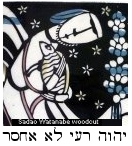
03.19.20 (Adar 23, 5780) Where it is written, "the LORD is my Shepherd; I shall not want" (Psalm 23:1), we note that "I shall not want" (לא אחסר) does not mean "I shall not desire," but rather "I shall not lack." When the Lord is your Shepherd, you can trust that you have all that you need. Note that David uses the future tense here (אחסר) because God is ahead of your next moment, so to speak: "Your Father knows what you need before you ask Him" (Matt. 6:8). God's Name means Presence, Life, Love, and "I-AM-with-you-always." Yeshua is our Good Shepherd (הרעה הטוב) who makes us lie down in green pastures, a place of abundant life, and then leads us to still waters, literally "waters of rest" (מי מנוחות), that will restore your soul (the verb translated "restore" is an intensive passive of the verb shuv, "to turn" (שׁוּב), indicating that the Shepherd causes your soul to return to the Divine Presence). As our Good Shepherd has said, "My sheep hear my voice, and I know them, and they follow me. I give them eternal life, and they will never perish, and no one will snatch them out of my hand" (John 10:27-28). Yeshua is the one who makes for us the paths of righteousness; He leads us on the way to the Father (John 14:6).
Hebrew Lesson
Psalm 23:3 Hebrew reading:
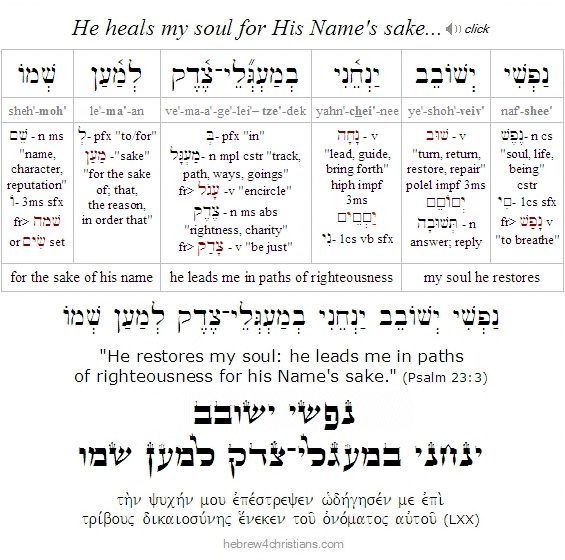 |
The Torah of Faith...

03.19.20 (Adar 23, 5780) We find life by trusting in the promise of God's unconditional love (Hab. 2:4; Rom. 1:17). The Torah of faith (תורת האמונה) therefore includes these additional commandments from the heart of Yeshua our Savior: 1) "You shall believe that you are My beloved - entirely accepted and entirely forgiven"; 2) "You shall forget the shame of your past"; 3) "You shall stop focusing on your sin but rather of My great remedy for you"; 4) "You shall let me carry your woundedness far away, yea, to the depths of the sea"; 5) "You shall live in My love and be filled with my heart," and 6) "You shall be made new." We are to know ourselves as "dead to sin but alive to God" (Rom. 6:11), which means we die to despair, we die to fear of abandonment, yea, we die to death itself, and now we are alive to hope, alive to healing, yea, alive to love that endures forever... Amen.
Numbering our Days...
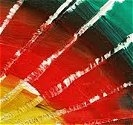
03.19.20 (Adar 23, 5780) Since everything is under God's Supervision, it is forbidden to regard actions and outcomes as the result of accident, chance, "luck," or happenstance... Those are all pagan ideas, based in ignorance and superstition. Faith in the LORD God Almighty is grounded in unqualified trust that He is also Adonai Ro'i, the LORD your Shepherd, the One who restores your soul, and that conviction provides the framework for apprehending the truth of Torah. A lost faith regards the events of life as random, based on "fortune," and blind chance; it no longer sees God's hand in the affairs of daily life, but consigns the Divine Presence to a place of functional exile. For this the "like for like" judgment is given: as you regard your life as the product of random forces, so you will be unable to discern God's hand in your daily life.
We trust that "all things work together for good" (Rom. 8:28) and therefore we bless God for perceived evil as well as for perceived good, since all circumstances of life come from the hand of the LORD our God. We believe in an all-powerful, supreme LORD who has not abandoned the world, but who actively sustains and upholds it with benevolent intent. When difficult things happen to the righteous, we trust in God's personal care for their ultimate good, despite their present troubles. "Though he slay me, I will trust in Him" (Job 13:15). What's perhaps most heroic about Job is that he never turned away from hope, despite the crucifixion of his world. As Kierkegaard said, "The moment the LORD took everything away, he did not say, 'The LORD took away,' but first of all he said, 'The LORD gave..." (Upbuilding Discourses). This is the heart behind the Kaddish, the mourner's prayer, that expresses acceptance of God's world, despite the pain, sorrow, loss, and so on.
Therefore may God "teach us to number our days aright that we may get a heart of wisdom" (Psalm 90:12). The sages say on the day of death, one considers one's life as if it had been a single day... Life goes by so quickly, and we never know when our personal "Rosh Hashanah" will come. "No one knows the day or hour..." That's why it is so vital to be healed and to turn to God while there is still time. So turn to him today and bacharta ba'chayim – "choose life!" "For this commandment (of turning to God in faith) is not hidden from you, and it is not far away. It is not in heaven... nor across the sea.... Rather, the matter is very near you – in your mouth and your heart – to do it" (Deut. 30:11-14; Rom. 10:8-13).
לִמְנוֹת יָמֵינוּ כֵּן הוֹדַע
וְנָבִא לְבַב חָכְמָה
leem·noht · ya·mei'·noo · kein · ho·da'
ve·na·vee · le·vav · chokh·mah

"Teach us to number our days aright
that we may get a heart of wisdom."
(Psalm 90:12)
Hebrew Study Card

Endurance and Suffering...

03.19.20 (Adar 23, 5780) "Pray that you may never have to endure all that you can learn to bear." Yes, though we must also trust that God "will not let us be tested beyond what we are able to bear, but with the test will also provide the way of escape (τὴν ἔκβασιν) so that we may be able to endure it" (1 Cor. 10:13). Indeed, in light of suffering what we really need is "endurance," or what the New Testament calls hupomone (ὑπομονή), a word that means "remaining [μένω] under [ὑπο]" the Divine Presence while being tested (the English word "suffer" comes from the Latin word sufferre, from sub- (under) + ferre, to carry, and therefore denotes "bearing under" difficulty). Suffering people often do not need moral platitudes or correction from others, but rather the will to believe, the strength to stay constant, and the rise of hope that gives life to simple prayers that focus the heart upon the Lord's Presence: "God have mercy..." "Help me, O God..." "I need Thee, O Lord..." When we receive grace to faithfully suffer, we hear the Spirit whispering back to us: "Be not afraid..." "Live in me..." "Walk in the light..." "I am with you always..." "You are loved..."
Life itself weans us from life as we learn that nothing ultimately belongs to us... We must learn to make peace with our sorrows and disappointments, to let go of them and to accept that this day, despite its frailty and trouble, is a precious gift from above. "My peace I give to you" (שׁלוֹמי אני נתן לכם), said Yeshua, "not as the world gives, I give to you" (John 14:27). Not as the world gives... When we let go, when we put everything in God's hands, we acknowledge that all we have is a gift from God.
Accounting for the Lamb...
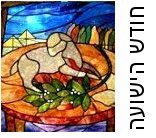
[ The following is related to this week's Torah reading, parashat Vayakhel-Pekudei and to "Shabbat HaChodesh," or the Sabbath that immediately precedes the Biblical New Year... ]
03.18.20 (Adar 22, 5780) In our Torah portion for this week (i.e., Vayakhel-Pekudei) we learn that Moses consecrated the Mishkan (Tabernacle) on Rosh Chodashim, that is, "the first day of the first month of the second year [since the Exodus]" (Exod. 40:17). Note that this date (i.e., Nisan 1) marks the start of the Biblical year and "Chodesh Yeshuah" (חודש הישועה), or the month of the Passover Redemption (see Exod. 12:1-12). The Torah's calendar therefore begins with the advent of the Lamb of God (שׂה האלהים), just as the central sacrifice of the Tabernacle was the daily sacrifice (i.e., korban tamid: קרבן תמיד) of a defect-free male lamb offered with unleavened bread and wine. The LORD calls this "My offering, My bread..." (see Num. 28:1-8). In other words, the service of the earthly Tabernacle constantly foreshadowed the coming Lamb of God who would be offered within "greater and more perfect Tabernacle (משׁכּן גדוֹל וּמשׁלם) not made with hands" to secure eternal redemption (פדוּת עוֹלמים) for us (Heb. 9:11-12).
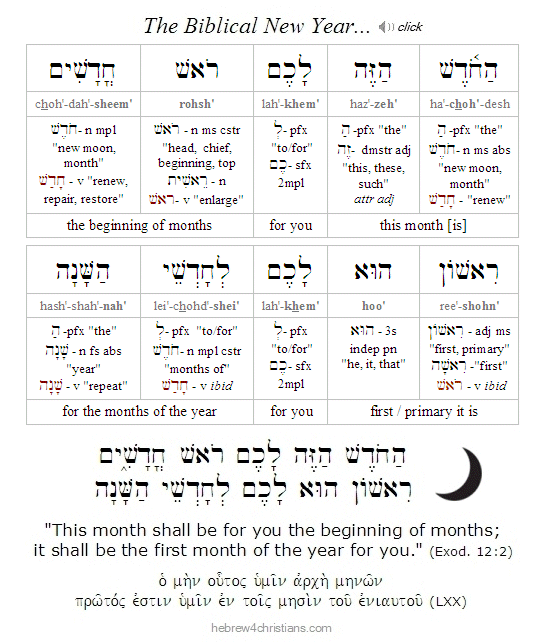 |
As mentioned before, the climax of the Torah given at Sinai was the revelation of the Tabernacle. The tablets of the law, summarizing the Ten Commandments, were stored inside the Ark of the Covenant (ארון ברית יהוה), the innermost place of the Tabernacle, a sacred "three-in-one" box. As such, the ark served as a symbol of kisei ha-kavod (כסא הכבוד), the Throne of Glory. It stood entirely apart as the only furnishing placed in the Holy of Holies (קודש הקודשים). Upon the cover of the Ark (i.e., the kapporet: הכפורת) were fashioned two cherubim (i.e., angel-like figures) that faced one another (Exod. 25:17-18). According to the Talmud (Succah 5b), each cherub had the face of a child - one boy and one girl - and their wings spread heavenward as their eyes gazed upon the cover (Exod. 25:20). God's voice would be heard only in the midst of innocence, humility, purity, and hope... Each year during the Yom Kippur (יום הכיפורים) ceremony, the High Priest would sprinkle sacrificial blood seven times upon the cover of the Ark of the Covenant to dramatize cleansing from the law's verdict and the atonement of sin secured through Messiah.
 |
 |
Trusting God's Heart...

03.18.20 (Adar 22, 5780) There is no fear in love, and therefore over and over the Spirit of God says, al tira (אל־תירא), "don't be afraid..." When we are afraid, we are believing the lie there is something beyond God's control or reach, and therefore God is "not enough"... In times of testing you must remind yourself of what is real. God formed you in your mother's womb, breathed into you nishmat chayim, the breath of life, and numbers all your days... Every breath you take, every heartbeat in your chest is ordained from heaven, and indeed, there is not a moment of your life apart from God's sovereign and sustaining grace. So what, then, are you afraid of? Dying? Judgment in the world to come? Being left unloved, bereft of home, abandoned, consigned to outer darkness? King David said, "If I make my bed in Hell, behold, you are there" (Psalm 139:8). Look, the LORD God is not only present in your "happy moments," when you feel "put together" and respectable, but he is present in your desperate moments, in your hunger, your thirst, and in your secrets. May we never lose sight of God's love, especially in times of distress and trouble, since we trust that he is always working all things together for our ultimate good (Rom. 8:28).
The Name of the LORD (יהוה) means "Presence" and "Love" (Exod. 3:14; 34:6-7). Yeshua said, "I go to prepare a place for you," which means that his presence and love are waiting for you in whatever lies ahead (Rom. 8:35-39). To worry is "practicing the absence" of God instead of practicing His Presence... Trust the word of the Holy Spirit: "For I know the plans I have for you, declares the LORD, plans for healing peace and not for evil, to give you a future and a hope (Jer. 29:11). The Word always speaks hope.
Take comfort that your Heavenly Father sees when the sparrow falls; he arrays the flower in its hidden valley; and he calls each star by name. More importantly, the Lord sees you and knows your struggle with fear. Come to him with your needy heart and trust him to deliver you from the burdens of your soul (Matt. 11:28). Shalom means being free from fear.
This is a word for the exiles of every age: Be not afraid - al-tirah – not of man, nor of war, nor of tribulation, nor even of death itself (Rom. 8:35-39). If God be for us, who can be against us? Indeed, Yeshua came to die to destroy the power of death "and to release all those who through fear of death were subject to lifelong slavery" (Heb. 2:14-15). The resurrection of the Messiah is the focal point of history - not the "dust of death." Death does not have the final word. Indeed, because Yeshua is alive, we also shall live (John 14:19). "May your love, O LORD, be upon us, even as we hope for you" (Psalm 33:22).
Nachman of Breslov once is reported to have said that "The whole earth is a very narrow bridge (כָּל־הָעוֹלָם כֻּלּוֹ גֶּשֶׁר צַר מְאד), and the point of life is never to be afraid." Likewise we understand Yeshua to be the Bridge to the Father, the narrow way of passage that leads to life. He calls out to us in the storm of this world, "Take heart. It is I; be not afraid" (Matt. 14:27). When Peter answered the call and attempted to walk across the stormy waters, he lost courage and began to sink, but Yeshua immediately reached out his hand and took hold of him, saying, "O you of little faith, why did you doubt (lit., think twice)?"
We must be careful not to let the light in us become darkness (Luke 11:35). The love and acceptance of God is the answer to our fear, not the thought of being judged by Him or attempting to merit his favor through religion. God's love is our hope, and this hope gives us courage to persevere the storms of the day... "May your love, O LORD, be upon us, even as we hope for you" (Psalm 33:22).
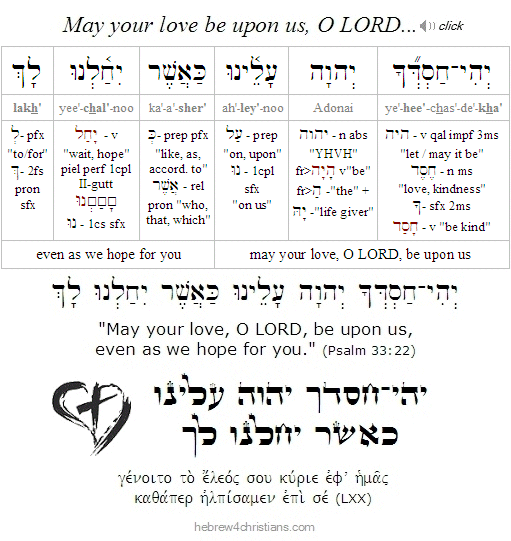 |
Surrender to Peace...

03.18.20 (Adar 22, 5780) "Be still and know that I am God..." This is something you must do; you must quiet your heart to know the Divine Presence. Therefore "set the Lord always before you" (Psalm 16:8) and refuse anxious thoughts that weigh in upon you, creating pressure and "dis-ease." Quieting your heart enables you to hear the holy whisper: "It is I; do not be afraid..." Once the storm of fear dissipates, you can know the truth of God. As the Spirit says, "In returning and rest you shall be saved; in quietness and in trust shall be your strength" (Isa. 30:15).
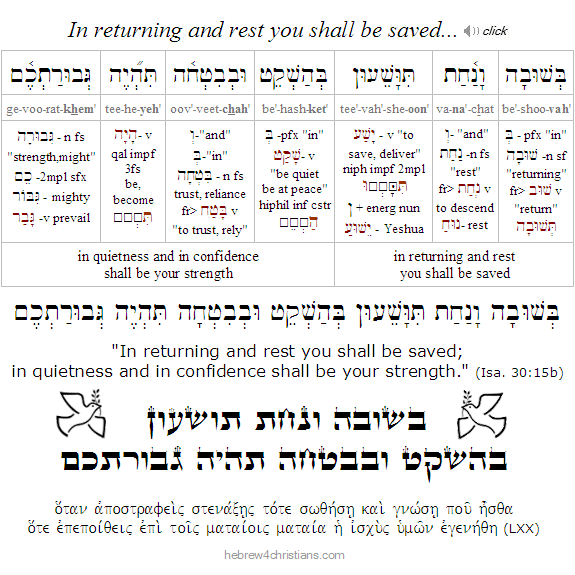 |
Worry is a place of exile and pain. Since God's Name (יהוה) means "Presence" and "Love," being anxious is to practice the absence of God's presence instead of practicing his presence... A divided house cannot stand. Where it is written, "cast all your anxiety on him because he cares for you" (1 Pet. 5:7), the word translated "anxiety" comes from a verb that means to divide into pieces. Bring your brokenness to God – including those distractions that make you ambivalent and afraid – to receive God's healing for your divided heart.
Note that the verb "be still" (i.e., rapha) means to "let go," to stop striving, and to surrender everything to the care of God (Rom. 8:28). "Being still" means letting go of your "need" to control the world. Relax your hold and rely on God's care for your life instead, without "taking thought" for tomorrow and its concerns (Matt. 6:34). The past is gone, after all, and the future is God's business: all you have is the present moment to call upon our Lord. Be faithful in the present hour, then, asking God for the grace and strength you need to endure yourself and engage the task at hand. In this way you will experience the peace of God "which surpasses all understanding" (Phil. 4:7).
Walking with God isn't just a matter of "head education," but also of "heart education," and these two must always go together as Spirit and Truth (John 4:23). Head education seeks knowledge primarily as a means of defining what you believe; heart education, on the other hand, centers on fear, or rather, on overcoming your fear by trusting in God's love and healing grace. When you accept that you are accepted despite yourself, you are delivered from the need to defend yourself. You can let go, quit denying who you are, and accept God's unconditional care for your life – regardless of the state of the world. When your heart learns to "be still," you can know that the God of Israel reigns over all things!
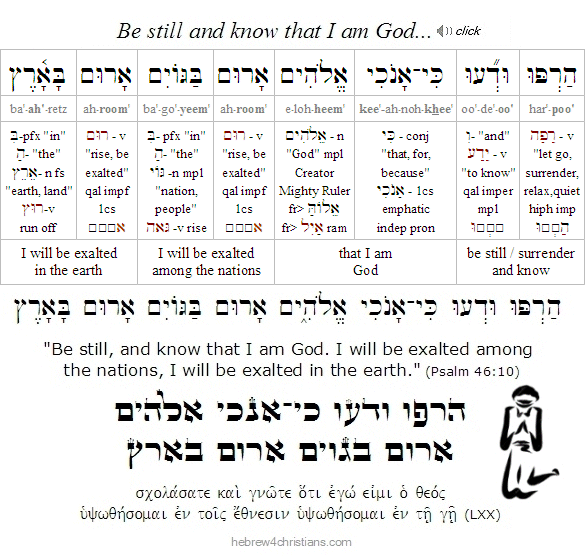 |
Choose Faith over Fear...
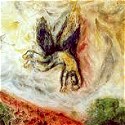
03.17.20 (Adar 21, 5780) Fear is often a recycled and repackaged commodity sold by the evil one... Over a decade ago the world was faced with yet another virus, another economic upheaval, and various other concerns. The words I wrote then are relevant to us today:
"In the geopolitical world there are more seemingly good reasons to be afraid today than in any time since the rise of Nazi Germany in the 1930s. Every day the media indoctrinates people about the threats of various plagues (e.g., the swine flu [replace now with Covid-19]), of economic disasters, of terrorist plots, and so on. In short, living within a "culture of fear" (with its ongoing propaganda campaigns from both the right and left wing perspectives) is to traffic in images and sound bites, inducing a sense of dread and anxiety (as someone once said, "FEAR" is "False Education Appearing Real"). Just as a lie-detector can physiologically sense when people are telling lies, so our souls can sense when we are believing them... There is no neutral ground here, no "transcendent" place of the soul where we can rise above the realm of truth claims: We will either be set free by the truth or else we will live in fear. As Yeshua said, "the truth shall set you free" (האמת תשחרר אותך).
Ultimately fear distills to the fear of death, or rather, of "the one who has the power of death, namely the devil" (Heb. 2:14-15). If we come to peace with our own finitude, our own mortality, and our eventual end in the Messiah, death has no more power over us. God is ultimately in control of everything that happens in our lives; we can call upon Him for wisdom and direction for our lives... Above all fear the LORD and submit your life to Him.
Fear is the antithesis of faith, though living without fear is certainly not easy. After all, how do we naturally choose to be unafraid of what we in fact fear? Is this power within our conscious control? Only by a miracle are we set free from fear... Indeed, true faith working within the heart is one of the greatest miracles of God. May it please God to impart to each us real courage that comes from Heaven itself... Amen.
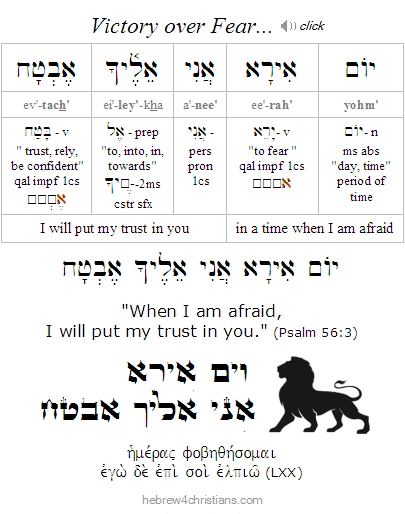 |
Created for Love...

03.17.20 (Adar 21, 5780) One of the great questions of life is: "What does it mean to be human?" or put another way, "Who or what am I?" This question is important to answer because how we think of ourselves will form our vision of our greatest good and how we should live our lives. The Torah teaches that human beings are directly created by God; each of us is unique and has been imparted nishmat chayim (נשׁמת חיים), the sacred "breath of life." Every human being therefore owes his or her existence to the creative (and sustaining) power of God (Gen. 1:27, 2:4; Col. 1:16-17; John 1:3; Heb. 1:2). God made you in the "secret places" of the depths -- yesh me'ayin (ישׁ מאין), "out of nothing" -- for His own sovereign will and eternal purposes (Psalm 139:15, Rev. 4:11). This is implied in the name YHVH (יהוה) itself, the One who is the Source and Ground of all that exists. Unlike concepts derived from classical Greek philosophy, however, God is not an abstract and indifferent power behind the phenomenal realm, but is revealed as אלהי אברהם אלהי יצחק ואלהי יעקב - "the God of Abraham, Isaac, and Jacob," the One who calls people to be in a relationship of trust with Him (Exod. 3:15). Ultimately you can only know yourself and why you exist as you embrace the truth of God and his love for you...
We are created for relationship with God, to know God and to love Him forever, but until our lives find their substance in that relationship, we remain existentially anxious and in secret dread... This relationship is more than that of knowing God as the Creator, but further as the source of your own heart, the center of your dreams, and the vision of your purpose for existence. The language of love goes beyond that of imperative: it seeks to "upbuild" the person and to elevate them to be the beloved...
Therefore people are free to accept the love God, or free to reject it, because love does not coerce but honors the individual's choice. Nevertheless - and paradoxically enough - a choice must be made, and there is no way to opt out of the call to freedom. Not choosing to receive the love of God is tantamount to rejecting that love. This is the side of the relationship that God reserves as your Creator: you are free to choose, but choose you must....
Of course the "choice" to trust is a dynamic process, an "education for eternity," wherein we learn to be healed of our divided hearts and to focus wholeheartedly on the blessing of God's personal love for us. The process is a humbling one, requiring a lifetime of teshuvah... God "demands" that you choose the good so that you can freely choose his love. We are being disciplined by heaven to learn how to order our affections and to freely exercise our will. Therefore "work out your own salvation with fear and trembling, for it is God who works in you, both to will and to work for his good pleasure" (Phil. 2:12-13).
As our Lord said: "Unless you turn (shuv) and become like children, you will never (οὐ μὴ) enter the kingdom of heaven" (Matt. 18:3). Such is the importance of simple trust in God... Indeed Yeshua repeatedly taught us to trust God as "Abba," our Father (אבא אבינו). He taught that we are warmly accepted as part of his family; that we are under his constant care; and that we live within his household as beloved children... And even though God is utterly transcendent, the Infinite One (אין סוף) and Creator of all worlds, he humbles to behold the things that in heaven and earth (Psalm 113:6). He is as close as your next breath; he leans upon your bosom at the table; he anticipates what you need before you ask him... The "fear of the Lord" is that you might fail knowing his great love for you -- that you will forget your true identity and lose yourself in lesser things. Therefore affirm the truth that you are loved with an unending and everlasting love, that you are safe, that you are accepted, and that nothing can ever separate you from the power of love. God your Father hears you, he knows you, and he loves you bekhol levavo (בכל־לבבוֹ) - "with all his heart."
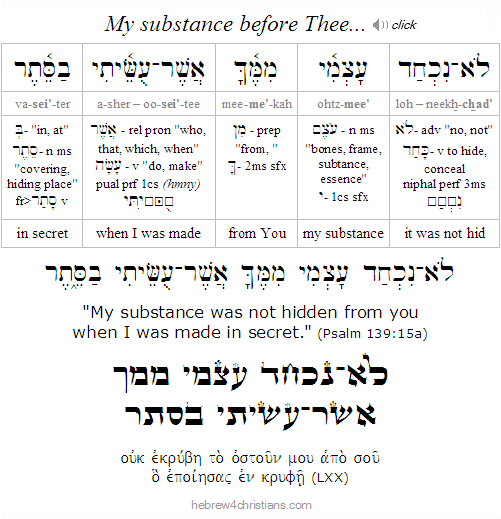 |
Center of His Heart...

03.17.20 (Adar 21, 5780) It is written in our Scriptures: "For none of us lives to himself, and none of us dies to himself: If we live, we live to the Lord; if we die, we die to the Lord. Therefore, whether we live or die, we are the Lord's" (Rom. 14:7-8). This is the very reason for our salvation - to belong to the eternal love of God given in Messiah. Yeshua is the supreme goal of all the we are or ever hope to be -- both in this life and in the world to come. He "died for all, that those who live might no longer live for themselves but for Him who for their sake died and was raised from the dead" (1 Cor. 5:15).
Physical death is not the same thing as spiritual death. The righteous are considered alive even in death; the wicked are considered "dead" even while alive (Berachot 18a-b). Yeshua solemnly avowed: "Whoever believes in me, though he may die, yet shall he live, and everyone who lives and believes in me shall never die" (John 11:25-26). When we physically die we do not pass out of service to Him but discover a greater mode of it. Whether living or dying or in the state of the dead, we are not our own but forever belong to Him. Yeshua is the good Shepherd (הרועה הטוב) who walks beside us in the valley of the shadow of death. We will not fear for He is with us and will never leave nor forsake us...
If we die, we die to the Lord (ἐάν ἀποθνῄσκωμεν, τῷ κυρίῳ ἀποθνῄσκομεν). Even in the throes of physical death we commit our lives to his care - "Into your hand I entrust my spirit; you have redeemed me, O LORD God of truth" (Psalm 31:5). We yearn for God's love not only in life but also in death, in our "dying to be with Him."
 |
Both life and death are beyond our ability to control, of course, but both are assuredly in the hands of the Sovereign LORD. For everything there is a season, and a time for every matter under heaven: a time to be born, and a time to die; a time to plant, and a time to pluck up what is planted..." (Eccl. 3:1-2). As the Creator of all worlds, our Lord humbles himself to feed the birds of the air, to water lilies of the field, and to count the number of hairs on our heads (Psalm 113:5-6). Amen. God will turn our mourning into dancing; he will remove our sackcloth and clothe us with his everlasting joy.
Seeing your new Face....
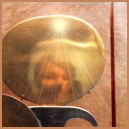
[ "And he (Betzalel) made the large basin of bronze and its pedestal of bronze from the mirrors of the women who served at the entrance of the tent of meeting" (Exod. 38:8). ]
03.17.20 (Adar 21, 5780) At the entrance of the Mishkan (i.e., "Tabernacle") a copper "laver" was built, the place where we wash and prepare ourselves to come before the Divine Presence (Exod. 30:18). The Torah says the basin was made from the mirrors of women who willingly sacrificed them to help build the sanctuary (Exod. 38:8). Spiritually understood, the mirror was transformed from a place where we encounter our own appearance to a place where we encounter God. Instead of focusing on our superficial face – how it looks and how we esteem ourselves, we now see ourselves in light of God's love, with our former self-image "sacrificed" or surrendered for the gift of a deeper self (2 Cor. 5:16). This is the "new self" cleansed by the Word of God, reflecting back the radiance of His Presence, as it says: "put on the new self (האדם החדשׁ) created after the likeness of God in true righteousness and holiness" (Eph. 4:24).
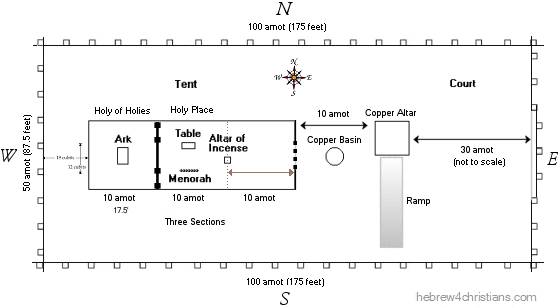 |
The sacrificed mirror represents turning to face reality, to see ourselves as God see us... Because of Yeshua, we have access to the inner heart of God (Heb. 4:16). Know who you are in Messiah: "And we all, with unveiled face, beholding the glory of the Lord, are being transformed into the same image from one degree of glory to another. For this comes from the Lord who is the Spirit" (2 Cor. 3:18).
Shabbat HaChodesh...

03.16.20 (Adar 20, 5780) The Sabbath that immediately precedes (and sometimes falls on) the Biblical New Year is called Shabbat HaChodesh (שבת החודש), the "Sabbath of the Month" (of Nisan). This Sabbath is significant because it marks the last Sabbath of the Biblical year - a "wake up call" to prepare for Passover. Indeed, Shabbat HaChodesh marks the start of the month of Redemption (i.e., the first month called Nisan) which God called "the beginning of months" (i.e., Rosh Chodashim). We honor this event by reading an additional passage from the Torah concerning the sanctification of the new moon (Exod. 12:1-20), and we spiritually prepare for this month by studying about Passover and the coming spring holidays:
 |
The commandment to sanctify the first new moon of the year (i.e., Rosh Chodashim) reveals that it is our responsibility to sanctify (i.e., observe) Biblical time in general. In other words, when we observe "the beginning of months," we are acknowledging that time itself is rooted in the Biblical calendar with its divinely inspired cycle of festivals (i.e., the moedim). Note that this year the Biblical New Year begins on Wed., March 25th at sundown, and therefore Passover begins exactly two week weeks later, Wed. April 8th at sundown.
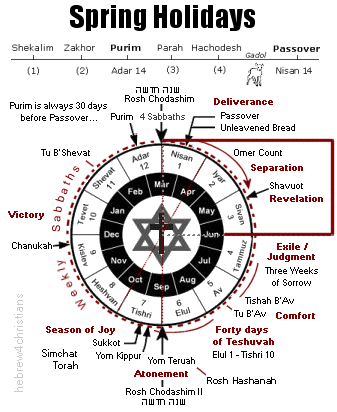 |
 |
Originally Rosh Chodashim was simply called the "first month" because it marked the month of the Exodus and the other months were named in relation to it, similar to the days of the week in the Hebrew calendar (i.e., the first day, the second day...). Later it was called Chodesh Ha-Aviv (חודש חביב) - "the springtime month" (because the calendar is reset in the spring) and later still as Nisan (ניסן), to recall God's faithfulness after the Babylonian Exile (Neh. 2:1; Esther 3:7). So important is this month that the Jewish sage Rabbi Moshe ben Nachman (Ramban) wrote regarding the commandment to observe Rosh Chodashim:
"The verses (Exod. 12:1-2) mean that this month should be counted first, and beginning with it, the count should proceed to the second, the third, and so on, till the end of the sequence with the twelfth month. In this way, this month should be a commemoration of the Great Miracle (i.e., our Redemption), and every time we mention the months, the Miracle will be alluded to. It is for that reason that the months do not have names in the Torah, but rather they are identified by number."
The word Nisan might come from either the word nitzan (ניצן), meaning "bud" (Song 2:12), or the word nissim (ניסים) meaning "miracles," both of which suggest physical and spiritual resurrection in our lives. Others think the word comes from the verb nus (נוּס), meaning "to flee," both in relation to Israel's flight from Egypt and Egypt's flight from Israel (i.e., when the pursuing Egyptian cavalry fled (נָסִים) before the sea closed upon them (Exod. 14:25, 27). We also see this usage in the verse: "The wicked flee (נָסוּ) when no one pursues, but the righteous are bold as a lion" (Prov. 28:1). The devil's power is found in the lie. If he can make you afraid, you will not think clearly. Establishing your faith in the truth will embolden you to deal with the lies and distortions that are intended to enslave you in fear. As Yeshua said, the truth will set you free (John 8:32).
Spring Holiday Resources:
Vayakhel-Pekudei (ויקהל־פקודי)

03.15.20 (Adar 19, 5780) This week we have a "double portion" of Torah: parashat Vayakhel (ויקהל) and parashat Pekudei (פקודי). Much of this material is repeated from the earlier description of the Tabernacle (המשׁכן) to underscore the importance of the sacrificial system (the altar) and to portend the two advents of Messiah Yeshua. Note that God commanded Moses to assemble the Tabernacle on "the first month in the second year [from the date of the Exodus], on the first day of the month" (i.e., Nisan 1, or Rosh Chodashim, see Exod. 40:17). The new moon of Nisan, then, marks the beginning of the month of salvation (חודש הישועה), both regarding the Exodus from Egypt (and the establishment of the altar at the Tabernacle), as well as the greater Exodus the altar at the cross of Messiah.
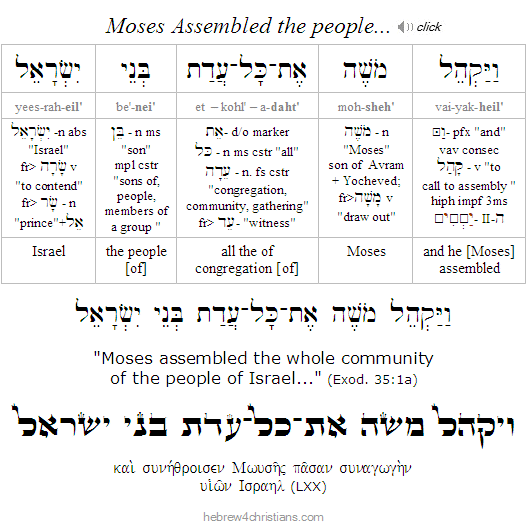
Once the Tabernacle was fully assembled and all its vessels were accounted for and inspected, Moses anointed all its components with the sacred anointing oil, called shemen ha-mishchah (note that the word "mishchah" (משׁחה) comes from the same root as "Messiah" (משׁיח), indicating that the Mishkan (i.e., Tabernacle) would foreshadow God's plan of redemption given in Yeshua). Moses then formally initiated Aaron and his four sons into the priesthood, marking their hands and feet with sacrificial blood and "waving them" before the Lord to picture resurrection. The Divine Presence - manifest as the Shekhinah Cloud of Glory – then filled the Holy of Holies in the Tent of Meeting.
The Book of Exodus ends: "And Moses was not able to enter the Tent of Meeting because the cloud settled on it, and the Glory of the LORD (כבוד יהוה) filled the Mishkan (המשׁכן). Throughout all their journeys, whenever the Cloud was taken up from over the Mishkan, the people of Israel would set out. But if the Cloud was not taken up, then they did not set out till the day that it was taken up. For the Cloud of the LORD (i.e., anan Adonai: ענן יהוה) was on the Mishkan by day, and Fire was in it by night, in the sight of all the house of Israel throughout all their journeys" (Exod. 30:35-38).
The Presence of the Glory of God that descended from Sinai upon the newly dedicated Mishkan represented a climactic moment for the fledgling nation, since the Sin of the Golden Calf had jeopardized whether the God would indeed dwell within the midst of the camp of Israel... Recall that it was only after Moses had returned from Sinai bearing the second set of Tablets (on Yom Kippur) that the glow of the LORD's redeeming love radiated from his face, and new hope was given to Israel (prefiguring the New Covenant). The King of Glory would accompany the people from Sinai to the Promised Land! (The narrative continues in the Book of Numbers, beginning exactly one month after the Mishkan was assembled.)
The Hebrew Word for Love...
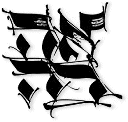
03.13.20 (Adar 17, 5780) I've mentioned before that the Hebrew word " love," ahavah (אהבה), derives from the verb hav (הַב) meaning "give," which suggests that the basic idea of love is expressed in the willingness to freely give to another. In fact the very first occurrence of the root (אהב) in the Bible is found in the narrative where God asked Abraham to sacrifice his beloved son Isaac (בן יחיד) as a whole burnt offering at Moriah (Gen. 22:2) - a prophetic intimation of God the Father giving his Son as the sacrifice for our sins. Amen. The essence of God is love itself (1 John 4:16), and therefore we may regard ahav (אהב) an acronym of the Father (א), the Holy Spirit (ה), and the Son (ב).
Our Strong Tower...

03.13.20 (Adar 17, 5780) There is one name for God that occurs far more than all the others combined in our Scriptures, and that is the personal Name of the Lord God of Israel: YHVH (יהוה). Now the Name YHVH implies that God is the Faithful One (האל הנאמן), since it is formed by permutating the letters of the Hebrew root "to be": hayah (היה), hoveh (is), and yihey (will be) to indicate that God is always Present in every place, and that there is no power that prevent him from fulfilling His promises at any time.... YHVH is Lord of lords and King of kings whose word can never fail (Deut. 10:17; Dan. 2:47). Ein od milvado (אֵין עוֹד מִלְבַדּו): "there is no power apart from Him" (Deut. 4:35,9).
"The Name of the LORD is a strong tower; the righteous one runs into it and is made safe" (Prov. 18:10). In this verse, the name YHVH is likened to a migdal oz - the "strong tower" that was used as the chief fortification for a city in ancient times. For the tzaddik -- the righteous person who calls upon the Name of the LORD -- God is an all-powerful defense in times of peril. The metaphor suggests a righteous man running into an immensely fortified tower, being elevated high above the surrounding danger (nisgav comes from a verb that means to elevate to an inaccessibly high place). The LORD is a strong tower of refuge for those who put their trust in Him.
The Hebrew name Yehoshua (יהושׁוע), or "Joshua," derives from a combination of YHVH and the verb yasha (ישׁע), to save," meaning "YHVH saves." Later Yehoshua was shortened to Yeshua (i.e., ישׁוע; see Nehemiah 8:17), which is the Hebrew name for "Jesus," of course. As a "type" of Joshua, Jesus exemplifies the ultimate deliverance of His people by taking Israel into the land to inherit the promises. Indeed, calling upon the Name of the Yeshua is to call upon the Name of YHVH, since Yeshua himself is YHVH come in the flesh (see Isa 9:6; Isa 45:23; Phil 2:11; Rom 10:9, among other verses). There is no other name given to mankind for salvation (Acts 4:12, Isa 43:11).
Dear friends, let us enter into Goshen (גשׁן) by "drawing near" in trust... May the LORD God our Savior be our Strong Tower of refuge for us during this time of worldwide uproar and fear. צדקתו מצילה ממוות - his righteousness saves from death. Amen.
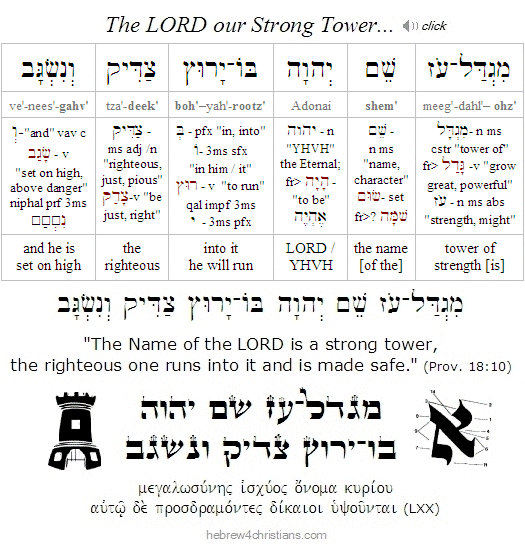 |
Torah of Eternal Life (תורת חַיֵּי עוֹלָם)

03.13.20 (Adar 17, 5780) As our Teacher, Yeshua reveals the heart of God to us, teaching us about the meaning of life and death and why we suffer... Most radically, however, he offers us the cure for the sickness of "spiritual death" (i.e., separation from God) by offering the gift of his life for us. Yeshua heals us from alienation and separation from the Eternal by means of spiritual regeneration (Eph. 2:1,5; John 3:3-7). Your relationship with Messiah constitutes eternal life (חַיֵּי עוֹלָם), for it is He who "makes you alive together with him" (i.e., συζωοποιέω, the Greek word here means you are brought into a new realm of existence by participating in the life in Messiah). He offers us daily deliverance from the power of sin by means of the Spirit of Truth (רוּחַ הָאֱמֶת), though we must remain receptive to the message of hope and be transformed by the renewing our minds (Rom. 12:2; Eph. 4:23; Col. 3:10). We must be careful not to "drift away" from the truth, since that forfeits the integrity of our lives and leads us into darkness and despair: "For what benefit is it for a person to gain the whole world, yet forfeit his life?" (Mark 8:36). Faith is the means or agency of connection with what is real, though we can lose that connection by hardening our hearts and returning to our former illusions (Heb. 3:13). Exile from God is therefore self-imposed; the gates of repentance are always open to those who seek God's compassion; everyone is welcome to find life in the blessing of Messiah (Luke 14:16-23; Luke 15:11-32). Therefore, draw near to God and God will draw near to you. "Let us then with confidence draw near to the throne of grace, that we may receive mercy and find grace to help in time of need" (Heb. 4:16).
The Truth that Saves...

03.13.20 (Adar 17, 5780) Some people profess faith in God as the means of attaining a happier or more prosperous life, though such reasoning focuses on what faith does for them as its primary justification (e.g., "your best life now!"). Such pragmatic thinking, however, perseveres just so long as the benefits and happy results continue, but when troubles, disappointments, or tribulation arise (as they inevitably will), the sham is exposed and the person often turns away or becomes bitter. You see, "faith" like that is conditional because it desires God not for the sake of truth, but for the sake of what God may do for the person. And still other people may profess faith because they are afraid to die and they think that seeking God's approval by doing "religion" (i.e., flattering God) or performing various "good deeds" is a sensible precaution and hedge against the unknown. This sort of "faith," however, is only as strong as the secret dread that love must constantly be earned, but when such a believer eventually becomes exhausted over the pressure to be perfect, he or she becomes angry and loses their aspiration.
Listen, the "bad news" comes first, namely that you are hopelessly lost, undone, incurably sick, and that you are powerless to change yourself despite your best efforts. That's the "verdict" (true word) of the law; that's the hard reality. The "good news," on the other hand, is that all you ever hoped for, all your dreams for true love and unending life come as a gift from God, not from something with you. The good news declares that you have been found, you have been brought back to love, you are forever healed, and that God changes you through a sacred and mysterious work done on your behalf through Yeshua the Savior. Trusting in God's love for you is the first and last step of "saving faith," and there is nothing you could ever add to what has already been done for you... "It is finished." Again, the message of the "gospel" is that you cannot fix yourself; you cannot "earn" or merit God's approval by means of your own attempts at self-justification, but you must wholeheartedly die to yourself by trusting in the love of God given in the mission and life of Yeshua. God justifies the ungodly who believe in his sacrificial love that was vindicated at the cross. Because of Jesus you are accepted and beloved despite your sinful condition. You trust that God loves you despite yourself, and eventually you learn to turn away from yourself to walk out the blessing and miracle of the divine life.
Yeshua is the way, truth and the life (John 14:6). So-called "saving faith" is the ongoing reality of being in a "right relationship" with God Himself (Rom. 5:1). "The saving power of faith resides thus not in itself, but in the Almighty Savior on whom it rests... It is not faith in Christ that saves, but Christ Himself who saves those of faith" (B.B. Warfield). Faith is a gift from God, the miracle of "regeneration" that does not come from human agency of any kind but solely from God himself (John 1:12-13; Eph. 2:8-10; Titus 3:5-6).
Now all this may sound wonderful, perhaps "too good to be true," but that's the very issue, isn't it? - namely whether you believe that it is really true. Did Yeshua come to personally rescue you and save you from your sins, or do you just (wistfully) hope that the old story is true? When he died on the cross, was it for your sins, or for the sins of other people? If you were the only soul in all the world, sinful, wretched, and sentenced to die, would you believe that Yeshua would come just for you and to die in your place -- that God himself would rather die than see you lost, broken, and forever dead inside? Such is quintessential question for the redemption and healing of your soul...
There is really only one really good reason to believe in God, however, and that is because you sincerely believe that truth is important; and there is only one good reason to believe in Yeshua, and that is because you believe that he reveals the truth about the meaning of reality. "For this purpose I was born and for this purpose I have come into the world -- to testify to the truth. Everyone who is of the truth listens to my voice" (John 18:37). It begins with the question of whether you will hear his voice. As C.S. Lewis said, "If Christianity is untrue, then no honest man will want to believe it, however helpful it might be; if it is true, every honest man will want to believe it, even if it gives him no help at all" (God in the Dock).
Shalom and love to you, chaverim...
Call to do Teshuvah...

03.12.20 (Adar 16, 5780) Our emotional connection with God may move us to grief and anger over the evil we see unashamedly practiced and even celebrated in the world today... Unlike some religions that are deluded enough to think they can harm or even kill others in the name of their so-called god (or "government"), however, we sanctify the gift of life by regarding it as sacred, though we would be spiritless indeed if we were not agitated as the great Name of our LORD God (יהוה אלוהי הישועה) is profaned and despised in a godless and wicked culture.... "Be angry and sin not..." (Eph. 4:26). Tolerance for evil is not a virtue, even if we must exercise godly patience as we suffer because the "mystery of lawlessness" is allowed for a season to continue (2 Thess. 2:7). We are admonished in our Scriptures: μὴ νικῶ ὑπὸ τοῦ κακοῦ, ἀλλὰ νίκα ἐν τῷ ἀγαθῷ τὸ κακόν - "Do not be conquered by evil, but conquer evil with good" (Rom. 12:21; 1 Thess. 5:15, 1 Pet. 3:9). Fret not because of evil doers, for they shall soon wither away (Psalm 37). The Great Accounting is coming: "For there is nothing created that is hidden - אין יצור נסתר - but all things are naked and open to the eyes of the One to whom we must render an account" (Heb. 4:13). Every thoughtless word shall be accounted for in the Day of Judgment to come (see Matt. 12:35-37). Vengeance is indeed coming, though it is reserved for the LORD God alone, who is ha'shofet ha'tzaddik (השופט הצדיק) - the Righteous Judge (Psalm 7:11). "According to their deeds, accordingly He will repay, fury to His adversaries, recompense to His enemies; to the coastlands He will repay recompense" (Isa. 59:18).
כִּי אֶת־כָּל־מַעֲשֶׂה הָאֱלהִים
יָבִא בְמִשְׁפָּט עַל כָּל־נֶעְלָם
אִם־טוֹב וְאִם־רָע
kee · et-kol-ma·a·seh · ha·e·lo·heem
ya·vee · ve·meesh·paht · al · kol-ne·e-lahm
eem-tov · ve·eem-ra

"For God shall bring every work
into the judgment concerning every hidden thing,
whether it be good or whether it be evil."
(Eccl. 12:14)

Ultimately we are living in the midst of a great spiritual war -- the war for truth. This has been the battle from the beginning. The very first recorded words of Satan (הַנָּחָשׁ) questioned God's truth: "Did God really say...?" (Gen. 3:1). In the end there will be found two types of people: those who love the truth and those who love the lie. These are the children of light (בְּנֵי הָאוֹר) and the children of darkness (בְּנֵי הַחשֶׁךְ), respectively. Followers of Yeshua the Messiah are told to "walk as children of light" / ὡς τέκνα φωτὸς περιπατεῖτε (Eph. 5:8). The children of light are called to be am kadosh - a holy people - separate from the evil engendered by the fallen world and its forces, just as the very first creative expression of God was the separation of light from darkness (Gen. 1:3-4). The children of light "hate evil and love the good," and conversely, the children of darkness "hate the good and love evil" (Psalm 34:21, Prov. 8:13, Amos 5:15, John 3:20-21). Regarding the heavenly Zion to come, it is written: "nothing ritually unclean will ever enter into it, nor anyone who does what is detestable or practices falsehood (lit. "makes a lie"), but only those whose names are written in the Lamb's book of life" (Rev. 21:27).
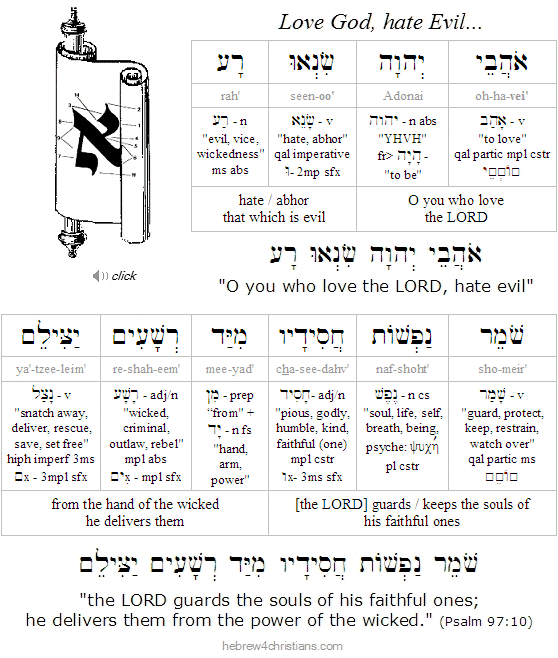 |
Lights and Perfections...

[ The following is related to this week's Torah reading, parashat Ki Tisa... ]
03.12.20 (Adar 16, 5780) The High Priest's breastplate (חשׁן) contained a pouch holding two mysterious gemstones called the "Urim and Thummim" (אוּרִים וְתֻמִּים), usually translated "lights and perfections." According to the Targum Jonathan, when a matter was brought to the High Priest for settlement, he would sometimes hold these before the Menorah and the Shekhinah would refract and irradiate various letters inscribed on the stones of the breastplate to reveal the will of God. Other sages, however, have said these stones were like lots (goralim) used to get "yes/no" responses from the LORD (e.g., 1 Sam. 14:41, 28:6, Ezr. 2:63; Neh. 7:65). Note that the word "urim" begins with the letter Aleph (א), the first letter of the alphabet, and the word "thummim" begins with Tav (ת), the last letter, which suggests the words of Yeshua: "I AM the Aleph and the Tav (אָנכִי אָלֶף וְתָו), the Beginning and End (רִאשׁוֹן וְאַחֲרוֹן), the First and the Last" (Rev. 22:13). Our holy Scriptures declare that in these last days God has spoken to us "by his Son, whom He appointed the Heir of all things, through whom also He created the worlds" (Heb 1:2). Note that the Greek construction for the phrase translated, "by his son" is ἐλάλησεν ἡμῖν ἐν υἱῷ, which literally means "he spoke to us in Son" -- that is, in the language or voice of the God the Son Himself... God speaks in the language "of Son" from the midst of the fire revealed at Zion.
The Relevance of Sabbath...
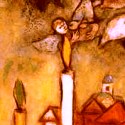
[ The following is related to this week's Torah reading, parashat Ki Tisa... ]
03.12.20 (Adar 16, 5780) Recall that after the people heard the Voice of the LORD speak at Mount Sinai, they drew back in fear and begged Moses to be their mediator before God. The LORD then called out to Moses, "Come up to me on the mountain and wait there, that I may give you the tablets of stone, with the law and the commandment, which I have written for their instruction" (Exod. 24:12). The "tablets of stone" (לֻחת הָאֶבֶן) referred to the sapphire blocks engraved with the Ten Commandments, of course, whereas (as explained before) the "law and the commandment" (וְהַתּוֹרָה וְהַמִּצְוָה) referred to the detailed instructions for creating the Tabernacle and establishing the sacrificial system of the Torah. In this week's Torah portion (Ki Tisa), just after God finished explaining the final details of the Mishkan and named Betzalel as its chief architect, He turned his attention back to the Ten Commandments. Before He actually handed the physical tablets to Moses, however, the LORD elaborated on the importance of observing the Sabbath day, saying:
"Above all you shall keep (שָׁמַר) my Sabbaths, for this is a sign (אוֹת) between me and you throughout your generations, that you may know that I, the LORD, sanctify you. You shall keep the Sabbath, because it is holy for you (כִּי קדֶשׁ הִוא לָכֶם). Everyone who profanes it (חָלַל) shall be put to death. Whoever does any work (מְלָאכָה) on it, that soul shall be cut off (כָּרַת) from among his people. Six days shall work be done, but the seventh day is a Sabbath of solemn rest (שַׁבַּת שַׁבָּתוֹן), holy to the LORD. Whoever does any work (מְלָאכָה) on the Sabbath day shall be put to death. Therefore the people of Israel shall keep the Sabbath, observing the Sabbath throughout their generations, as a covenant forever (בְּרִית עוֹלָם). It is a sign forever (אוֹת לְעוֹלָם) between me and the people of Israel that in six days the LORD made heaven and earth, and on the seventh day he rested and was refreshed." (Exod. 31:12-17)
Before commenting on the passage above, I'd like to point out how remarkable it is that God would repeat and elaborate upon the Fourth Commandment just before He was about to hand the tablets to Moses (see Exod. 31:18). After all, God could have reviewed each of the Ten Commandments with Moses at this time; or, in light of the subsequent narrative concerning the dreadful sin of the Golden Calf (Exod. 32:1-29), God could have repeated the warning against idolatry. So why did the LORD stress the importance of observing the Sabbath at this critical moment?
As this passage makes clear, the Sabbath was intended to commemorate and honor God as our personal Creator, King, and Judge (Gen. 1:31-2:2). It is a "sign" (אוֹת) that God has set us apart as His own treasured people. In Moses' restatement of the Torah given later, we are further commanded to remember the Sabbath day in light of God's redemption: "Remember that you were slaves in Egypt and that the Lord your God brought you out of there with a mighty hand and an outstretched arm. Therefore the Lord your God has commanded you to observe the Sabbath day" (Deut. 5:15). In other words, the Sabbath is a weekly reminder that the LORD is both our Creator and our Redeemer....
In light of this, each Shabbat we recite kiddush and remember that God is both our Creator (Gen. 1:31-2:3; Exod. 20:8, 31:7) and our great Redeemer (Deut. 5:15). As it says in our Torah portion for this week (Ki Tisa), "Above all you shall keep my Sabbaths, for this is a sign (אוֹת) between me and you throughout your generations, that you may know that I, the LORD, sanctify you. You shall keep the Sabbath, because it is sacred for you, as a covenant forever (בְּרִית עוֹלָם)..." (see Exod. 31:12-17). When we usher in Shabbat on Friday evening, we bear witness that God is our Creator, our Redeemer, and our Savior. Note that the Hebrew word for "sign" (אוֹת) is formed using a Vav (וֹ) surrounded by an Aleph (א) and a Tav (ת), a word that pictures being surrounded by God's Presence. We enter into the all-encompassing rest that God provides - relying on His power and grace alone to make us whole. "It is finished," and the Sabbath testifies of the rest we have in Messiah, our Creator and Redeemer. We let go and are renewed by the grace of God (1 Cor. 11:23-26).
We are not legalistic about Sabbath observance, of course, since that surely misses the point. As Yeshua taught us: "The Sabbath was made for man, not man for the Sabbath" (Mark 2:27). Note that well. The Sabbath was made -- it is the result of God's work performed on our behalf: "Come unto me, all ye that labour and are heavy laden, and I will give you rest" (Matt. 11:28). There remains a "Sabbath rest" for the people of God, which is the principle of God's power effecting life within us. The Sabbath is a delight – not a burden; a time for celebrating the finished work of Yeshua (Isa. 58:13; Heb. 4:9).
A careful study of the Scriptures reveals that the Sabbath will be honored in the Millennial Kingdom to come, and indeed, in heaven itself. Speaking of the coming Kingdom of God that will be established upon the earth, the prophet Isaiah foretold: "From new moon to new moon, from Sabbath to Sabbath (שַׁבָּת בְּשַׁבַּתּוֹ), all flesh shall come to worship before me, declares the LORD" (Isa. 66:23). Since this vision concerns the prophetic future, it is clear that the Sabbath day (as well as Rosh Chodesh, the new moon) will be observed. Likewise, in the heavenly Jerusalem to come, the Tree of Life is said to yield "twelve kinds of fruit, yielding its fruit each month" (Rev. 22:2). Notice that the "twelve fruits" (καρποὺς δώδεκα) from the Tree of Life are directly linked to the "twelve months" of the Jewish year (κατὰ μῆνα ἕκαστον ἀποδιδοῦν τὸν καρπὸν αὐτοῦ: "each month rendering its fruit"). In other words, the sequence of the Biblical holidays (i.e., the mo'edim) - including the Sabbath - were always intended to teach us great revelation about God.
The deepest principle of Sabbath is that we are set free from our striving and can open our hearts to God's gracious love... "Salvation is of the LORD," and we rest in the what the Lord has done for us. "If you call the Sabbath a delight; if you honor it, then you shall take delight in the LORD, and I will make you ride on the heights of the earth; I will feed you with the heritage of Jacob your father, for the mouth of the LORD has spoken" (Isa. 58:13-14).
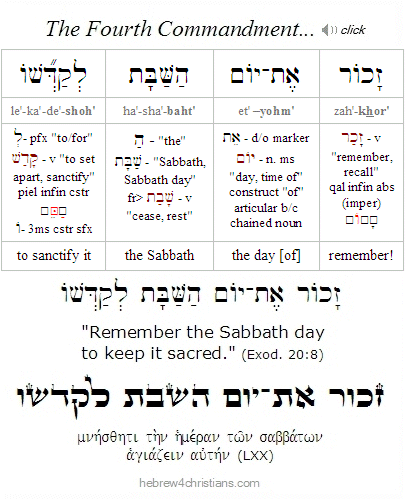 |
Note: I regard the various paradoxes of Scripture to constitute a test of the will to surrender be'khol levavkha, with all of your being, to God and His care... That's part of the "logic" behind the decrees of God that we don't understand: We learn to "deal with it" and embrace the tension with other, apparently contrary, truths of faith. This keeps us humble and dependent upon God for all that we genuinely understand. Shalom friends.
For more on this see: "The Sign of the Sabbath: Further Thoughts on Ki Tisa."
Rosh Hashanah of Spring...
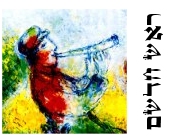
[ The following is related to Rosh Chodashim and the theme of teshuvah (repentance)... ]
03.12.20 (Adar 16, 5780) Spiritual danger is just as real as physical danger, though most people pretend it isn't because it isn't easily seen. The real dangers of life are not vulnerability to crime, sickness or some accident, however, but rather susceptibility to despair, the tendency to put off repentance, and the possibility of not dying well.... It is a great danger to walk through life asleep only to be jolted awake upon the day of death. "The greatest danger is that one does not discover, that one is not always discovering, that one is in danger" (Kierkegaard). Danger of what? Of wasting your life with trifles and vanities; of never learning how to truly love or to be loved; of becoming numb, unfeeling, and therefore unmoved by your need for God. As C.S. Lewis once wrote, "The safest road to hell is the gradual one - the gentle slope, soft underfoot, without sudden turnings, without milestones, without signposts." Therefore during this season we cry out: Hashivenu Adonai elekha venashuvah: "Return us to You, O LORD, and we shall return..." (Lam. 5:21).
הֲשִׁיבֵנוּ יְהוָה אֵלֶיךָ וְנָשׁוּבָה
חַדֵּשׁ יָמֵינוּ כְּקֶדֶם
ha·shee·vei'·noo · Adonai · e·ley'·kha · ve·na·shoo'·vah
cha·deish · ya·mey'·noo · ke·ke'·dem

"Turn us back to you, O LORD, and we shall be turned;
renew our days as of old" (Lam. 5:21)
Hebrew Study Card


Note: Generally speaking there are two "New Years" in the Biblical calendar and Jewish tradition. The first occurs two weeks before Passover (on the new moon of Nisan) and the second occurs during Rosh Hashanah (on the new moon of Tishri). The first marks the month of the redemption of the Israelites from Egypt by the blood of the lamb (דַּם הַשֶּׂה) -- and it is also the month in which Yeshua was sacrificed upon the cross at Moriah to redeem us from our sins as the Passover Lamb of God. The second marks the month of Israels' corporate salvation that will be fulfilled in the prophesied End of Days...
The Day is Drawing Near...

03.12.20 (Adar 16, 5780) When he was asked by his disciples what would be the sign of his coming (παρουσία) and of the "end of this age," Yeshua replied: "Many will come in my name, saying, 'I am the Messiah!' and they will lead many astray. And you will hear of wars and rumors of wars. See that you are not alarmed, for this must take place, but the end is not yet. For nation will rise against nation (ἔθνος ἐπὶ ἔθνος, i.e., ethnic group against ethnic group), and kingdom against kingdom (βασιλεία ἐπὶ βασιλείαν, i.e., political power struggles). There will be great earthquakes, and in various places famines and pestilences, but all these things are but the beginning of the birth pains (ἀρχὴ ὠδίνων)... You shall be despised for the name of Messiah; many will be offended; many will betray and hate one another, false teachers will arise to deceive the masses (apostasy); and because of lawlessness (ἀνομία) the love of many will grow cold (Matt. 24:3-12).
You would think that with the increased incidence of seismic activity around the world, the rampant natural disasters, floods, tsunamis, global famines, various plagues (viruses), geopolitical conflicts, ethnic divisions, and the cold-hearted cynicism that marks this age, people might not question whether God is trying to get their attention... These tremors, alas, are but "the beginning of birth pains," marking the time just before the Messiah appears, a period of time sometimes called the "footsteps of the Messiah" (עקבות המשיח). There is an "appointed time" coming for this world from which nothing can escape....
 |
The Apostle Paul also forewarned: "But you must know this: in the last days perilous times shall come" (2 Tim. 3:1). Notice first that this knowledge is not optional, since the Greek verb is imperative (i.e., Τοῦτο δὲ γίνωσκε - i.e., "this you must know..."). In order to heed this commandment, then, we need to understand some of the language being used in this verse. The Greek phrase "in the last days" (ἐν ἐσχάταις ἡμέραις) refers to the prophesied "End of Days," called acharit ha-yamim (אַחֲרִית הַיָּמִים) in Hebrew, the time just before the advent of the coming of Messiah. Yeshua faulted those of his age that disregarded the signs of his first coming (Luke 19:44), but now we are close to the time of his return, and he likewise foretold various signs to watch out for: "When you see all these things, know that he is near, right at the door" (Matt. 24:33). The signs are all present, chaverim. Now is the time to "look up, and lift up your heads; for your redemption is drawing near...."
One final note for now. Though the time draws near, we must pray for the deliverance of all people and the healing of the world. As it is written in our Scriptures: "When I shut up the heavens so that there is no rain, or command the locust to devour the land, or send pestilence among my people, if my people who are called by my name humble themselves, and pray and seek my face and turn from their wicked ways, then I will hear from heaven and will forgive their sin and heal their land" (2 Chron. 7:14). "For God so loved the world, that He gave his only Son, that whosoever believes in him might not perish but have eternal life" (John 3:16). As priests of the new covenant, we are to intercede on behalf of the lost for whom Yeshua died. May we, then, humble ourselves, sincerely turn our hearts to God, and plead on behalf of the healing of the world. Amen.
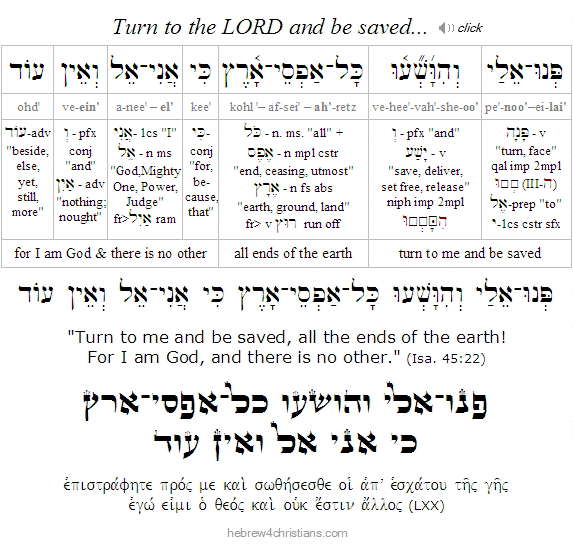 |
Prayers of Silence...

03.11.20 (Adar 15, 5780) Often it is not what is said that matters in our prayers, but what is unsaid... We ask God for help but we have no idea what that help might entail, and therefore we must trust Him to do the best, whatever that may be, and to answer the silent cry and groan of the heart. As John Bunyan said, "When you pray, rather let thy heart be without words than thy words be without heart."
The late Henri Nouwen wrote, "I am beginning to see that much of praying is grieving," since the confession of the truth when we "come to ourselves" (Luke 15:17) is often painful. When we pray to the LORD, however, it's obvious that we are not imparting to Him any information, since the Master of the Universe knows all things. As King David wrote: ki ein milah bilshoni, hen, Adonai, yadati khulah: "For there is not a word in my tongue, but, lo, O LORD, you know it altogether" (Psalm 139:4). Yeshua taught us to abstain from using "vain repetitions" in our prayers, since our Heavenly Father knows what we need before we ask Him (Matt. 6:7-8). True prayer is a means of reverent listening, or quieting ourselves, so that we might hear what the Spirit of God is saying... When we pray bekhol levavkha, with all our heart, we apprehend God's glory and express our desire to Him. We are then able to intercede by means of the Spirit with "groanings too deep for words" (Rom. 8:26).
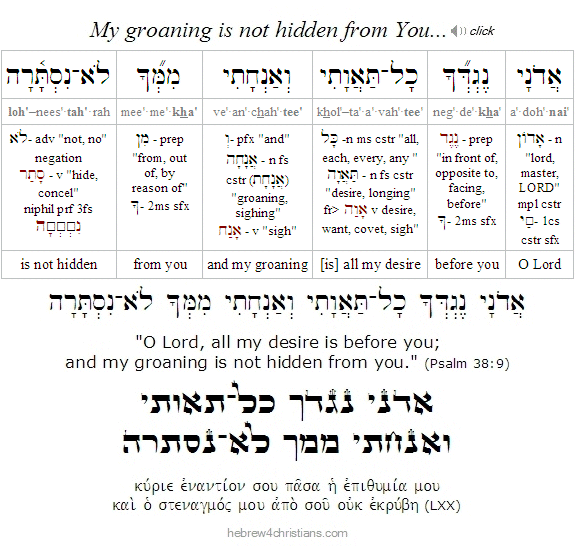 |
The "Passion" of Moses

[ The following is related to this week's Torah reading, parashat Ki Tisa... ]
03.11.20 (Adar 15, 5780) In the solitude of his tent Moses was deeply troubled, even distraught. Undoubtedly he pondered everything in his life that had brought him to this difficult place... Alas, in light of the recent disaster at Sinai, Moses realized he was now at an utter impasse. Would God continue His redemptive plan or was this the end of the great dream? Therefore Moses poignantly appealed to God: "If I have found favor (grace) in your eyes, let me know your ways, that I may know you and continue in your favor" (Exod. 33:13). God responded by reassuring Moses that His Presence would be with him (alone) and that he (alone) would "enter His rest." But Moses protested: "Unless You go in the lead, do not make us leave this place. For how shall it be known that I have found favor in your sight -- I and your people? Is it not in your going with us, so that we are distinct, I and your people, from every other people on the face of the earth?" And the LORD said to Moses, "This very thing that you have spoken I will do, for you have found favor in my sight, and I know you by name" (Exod. 33:15-17). Moses' pignant intercession touched God's heart, causing Him to change from a mode of strict judgment (middat ha-din) to one of mercy and forgiveness (middat ha-rachamim). This was the "gospel" moment at Sinai....
Upon hearing God's words of comfort, Moses was so overcome that he exclaimed: "Oh, let me behold Your Presence!" (Exod. 33:18), whereupon God answered, "I will make all My goodness pass before you, and I will proclaim before you the name LORD (יהוה), and I will be gracious to whom I will be gracious, and will show mercy on whom I will show mercy" (Exod. 33:19, cp. Rom. 9:15). Note that Moses would receive the revelation of the Name when he "stands upon the Rock" (Exod. 33:21).
The LORD then instructed Moses to carve a new set of tablets and to meet him again at the place (i.e., makom: מָקוֹם) on the top of Sinai, where He would descend in the cloud to "declare His Name" (Exod. 33:17-34:7). This dramatic experience of revelation was later called middot ha-rachamim, or the revelation of the attributes of God's mercy, and was considered a divine addendum to the original covenant terms. Rabbinic tradition later incorporated the recitation of middot ha-rachamim during Yom Kippur.
What are some of these attributes? Notice first that the LORD calls himself rachum v'chanun (רַחוּם וְחַנּוּן), often translated "merciful and gracious." The noun rechem (רֶחֶם) means "womb" in Hebrew, indicating that God's compassion is like a mother's deep love for her child. The word chanun (חַנּוּן) comes from the word for grace or favor (i.e., chen: חֵן), and indicates that God is a graceful giver who is favorably disposed to help those in need. God is compassionate and favorable to those who call upon Him.
The curious phrase erekh apayim (אֶרֶךְ אַפַּיִם) literally means "long of nose," an idiom used to describe someone who is patient and slow to anger, i.e., "longsuffering" (Prov. 14:29). The word chesed (חֶסֶד), is often translated as "lovingkindess" or "steadfast love," and implies devotion and fidelity. God describes Himself as rav chesed v'emet (רַב־חֶסֶד וֶאֱמֶת), that is abundant in His kindness and faithful love.
It is fascinating to see that this revelation prefigures the New Covenant that was given to Israel. Just as the first set of tablets, based as they were on the justice and holiness of God, were broken, so a second set was given based on the middot (attributes) of the LORD's mercy and grace. Indeed, Yeshua was broken on behalf of the law but was raised again so that all who trust in Him can truly understand that God is "merciful and gracious, slow to anger and abounding in steadfast love and truth" (Exod. 34:6, Psalm 86:15, 103:8).
It can be argued that the revelation of the Name YHVH (Exod. 34:5-7) was a "gospel" moment for Israel. The episode of the Golden Calf revealed that the Jews were unable to keep the law, even though they personally experienced the power of God's deliverance from Egypt and His ongoing care on the way to Sinai. Despite the judgments brought upon Egypt, despite the overthrow of Pharaoh and his armies in the sea, despite the bitter waters made sweet, despite the manna from heaven, despite the miraculous well of Miriam, despite the awesome revelation at Sinai, and despite the pledge of the Israelites: kol asher diber Adonai na'aseh v'nishma, "All that the LORD has spoken we will do, and we will be obedient" (Exod. 19:8; 24:7), the Sin of the Golden Calf revealed that something more was needed, and that the law itself was insufficient to change the inner heart of man (Rom. 3:20). The intercession of Moses on behalf of Israel - his willingness to die on behalf of the people - revealed the heart of the New Covenant (בְּרִית חֲדָשָׁה) of the LORD, the deeper revelation of the God's character of mercy and grace. Apart from God's gracious love and compassion, the law by itself rendered only the righteous verdict of death for Israel...
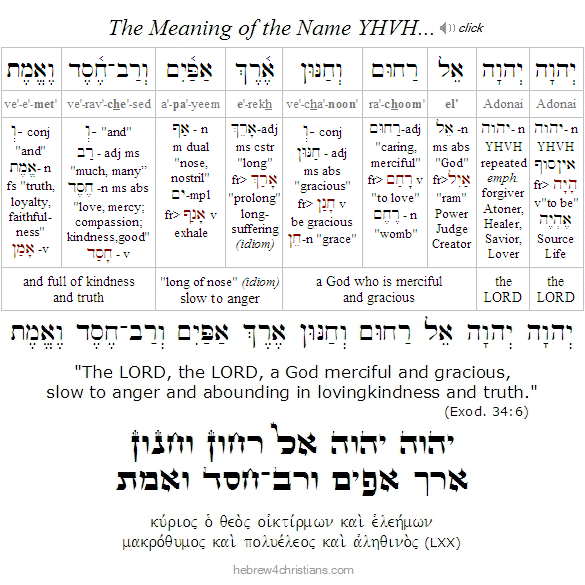 |
For more, see "God's Stubborn Love: Further thoughts on Parashat Ki Tisa."
Deliverance from Death...

03.11.20 (Adar 15, 5780) The ancient Greek philosophers sought for "salvation" (Σωτηρία), which they generally understood as freedom from the fear of death... For instance Socrates sought to dispel mythical superstition by regarding philosophy as the "practice for death," by which he meant that reflecting upon this "shadowy world" would instill a profound hunger for the eternal (and ideal) world, and he therefore advised that, since we all must die, we ought to prepare ourselves now for eternity, by focusing the mind on what is most essential, real, and beautiful. The Jewish sages likewise later affirmed, "This world is like a corridor before the World to Come; prepare yourself in the corridor, that you may enter into the hall" (Avot 4:21), which implied that the great commandment is דִּרְשׁוּנִי וִחְיוּ - "Seek Me and live" (Amos 5:4), as the prophet Isaiah (7th century BC) cried out, "Seek the LORD while he may be found; call upon him while he is near" (Isa. 55:6).
In light of this overarching concern of our shared moribund human condition, Yeshua (יֵשׁוּעַ) is justly named "our salvation" (יְשׁוּעָתֵנוּ), since it is by his hand that we are delivered from bondage to the fear of death (Heb. 2:14-15). The resurrection of Yeshua utterly overthrows the power of death (i.e., the devil), and eternally secures our welcome in the world to come. Therefore do not let your heart be troubled; have faith in God, for he "prepares a place for you" on the other side of the veil of this temporal world (John 14:1-3). "Whoever is born of God conquers the world (νικᾷ τὸν κόσμον), and this is the overcoming power that conquers the world, even our faith" (1 John 5:4). As Yeshua testified: "I AM the resurrection and the life (אָנכִי הַתְּקוּמָה וְהַחַיִּים). The one who trusts in me will live, even though he dies; and whoever lives and believes in me will never, ever, die (οὐ μὴ ἀποθάνῃ εἰς τὸν αἰῶνα). Do you believe this?" (John 11:25-26). Yeshua's words indicate there are two distinct senses of the word "death," namely physical death (temporal) and spiritual death (eternal). Though we may indeed die physically, that does not imply that we will die spiritually, since we are given eternal (spiritual) regeneration and life by the miracle of God's love...
לא אָמוּת כִּי־אֶחְיֶה
וַאֲסַפֵּר מַעֲשֵׂי יָהּ
loh · a·hmoot · kee-ech·yeh
va-a-sa·peir · ma-a·sei · Yah

"I shall not die, but I will live,
and declare the works of the LORD."
(Psalm 118:17)

We press on in hope, dear friends: "For our light and momentary troubles are achieving for us an eternal glory that far outweighs them all. So we fix our eyes not on what is seen, but on what is unseen. For what is seen is temporary, but what is unseen is eternal. Now we know that if the earthly tent we live in is destroyed, we have a building from God, an eternal house in heaven, not built by human hands. Meanwhile we groan, longing to be clothed with our heavenly dwelling (2 Cor. 4:17-5:1-2). God our Savior "is able to keep you from stumbling and to present you blameless before the presence of his glory with great joy" (Jude 1:24). May God help us persevere in hope, remembering the glory that lies ahead!
Builder of the House...
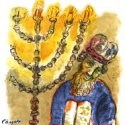
[ The following is related to our Torah reading this week, parashat Ki Tisa. Please read the Torah portion to find your place here... ]
03.11.20 (Adar 15, 5780) When Moses received Torah at Sinai, he was given visions of the Tabernacle (i.e., Mishkan: מִשְׁכָּן), a tent-like structure where God's Presence (i.e., Shekhinah: שְׁכִינָה) would dwell (i.e., shakhan: שָׁכַן) in the midst of the camp of Israel. Though Moses received the "pattern" (i.e., tavnit: תַּבְנִית) of the heavenly dwelling, he was apparently unable to create the artifacts themselves, and therefore God called a man named "Betzalel" (בְּצַלְאֵל) to be the chief architect of the structure.
Betzalel was the grandson of Hur (of the tribe of Judah and ancestor of King David) who, according to Josephus (Antiquities 3:2) was the husband of Moses' sister Miriam. This was the same Hur chosen to go with Moses and Aaron to the top of a mountain to prop up Moses' arms during Israel's first war against the Amalekites (Exod. 17:8-13).
 |
Our Torah portion says that God endowed Betzalel with the Spirit of God (רוּחַ אֱלהִים), and with wisdom (חָכְמָה), understanding (תְּבוּנָה), and knowledge (דַּעַת) - the same attributes used to describe God as the Creator of the Universe (Exod. 35:31; Prov. 3:19-20). Indeed, the name Betzalel (בְּצַלְאֵל) means "in the shadow of God" (from בְּ [in] + tzel [צֵל], "shadow" + El [אֵל], "God") who "foreshadowed" the Messiah in that 1) he was from the kingly tribe of Judah, 2) he was a young carpenter, 3) he was unusually "filled with the Spirit of God," 4) his father's name (Uri) means "my light" (James 1:17), 4) his assistant was called Oholiav (אָהֳלִיאָב), a name that means "my Father's tent," and 5) it was Betzalel (rather than Moses) who actually built the House of God (see Heb. 3:3-6; 1 Pet. 2:5). Indeed, as the one who fashioned the "Ark of the covenant" where the blood would be presented for our atonement, Betzalel foresaw the message of the redemption of Messiah secured at the cross...
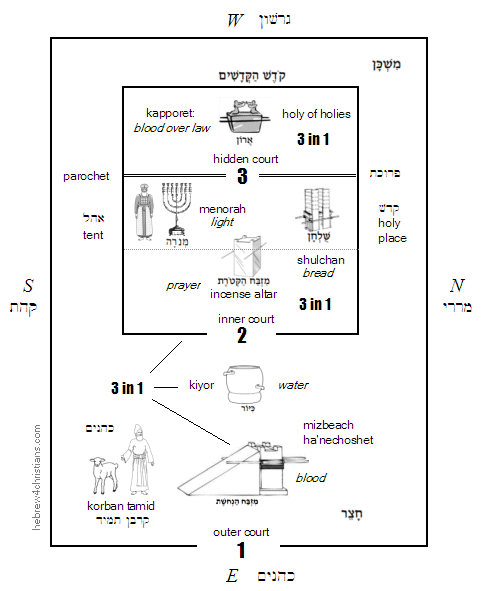 |
Note: For more on this, see the "Betzalel and the Messiah" article.
Created for a Purpose...

03.11.20 (Adar 15, 5780) It's been said that God sends each soul into the world with a special message to deliver, a revelation that only he or she can disclose... No one else can bring your message to this world - only you can do this. And since God is entirely unique, you are called to be who you were created to be, not someone else. On his deathbed Reb Zusya said, "I am not afraid that the Holy One will ask me, 'Zusya, why were you not more like Moses?' Rather, I fear the Holy One will say, 'Zusya, why were you not more like Zusya?'
There are no "little people" in God's eyes, since each soul has been created by Him for His glory and purposes... As C.S. Lewis wrote, "There are no 'ordinary' people. You have never talked to a mere mortal. Nations, cultures, arts, civilizations -- these are mortal, and their life is to ours as the life of a gnat. But it is immortals whom we joke with, work with, marry, snub and exploit - immortal horrors or everlasting splendors" (The Weight of Glory). Life is a miracle and nothing is trivial. In the world to come you will be shocked to understand that everything you thought, everything you said, and everything you did was given to you from above, and therefore has tremendous significance (Matt. 12:36-37). May God open our hearts and eyes to truly come alive...
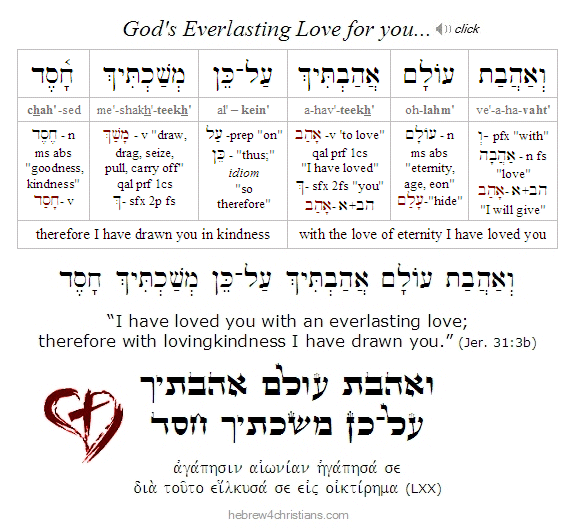 |
No Other Savior...

03.10.20 (Adar 15, 5780) Philip said to him, "Show us the Father and we will be satisfied." Yeshua replied, "Have I been with you so long, and you still do not know me, Philip? Whoever has seen me has seen the Father. How then can you ask, 'Show us the Father'? (John 14:8-9). Yeshua – and Yeshua alone – reveals the heart and truth of God to us, and looking for God "beyond" Him – up in heaven, across the sea, or in the mysteries of unfathomable forces that pervade reality – is ultimately a sign of unbelief and a denial of God Himself. The Father and the Son are of one essence and trying to separate them vitiates the message of Yeshua and makes it appear unfinished.... On the contrary, the work of salvation is finished, and "Whoever has the Son has the life (החיים); but whoever does not have the Son of God does not have the life" (1 John 5:12). There is no other way to access the heart of the Father than through Yeshua, and Yeshua is the Name above all other names for salvation (John 14:6; Acts 4:12; Phil. 2:9-11; John 17:3). Every knee shall bow to Him; there is no other Savior (Isa. 45:21-23). Those who honor the Son honor the Father and understand the heart of creation. To know God is to know the revelation given in the Son, for the Son is God clothed in human skin, reaching out in compassion to heal the trusting sinner from eternal alienation. Just as the Angel of the LORD is the "King of Angels," the manifestation of God in angelic form, so the Son of Man is the manifestation of the LORD in human form. There is no other Savior; there is no further place to ascend or to seek: Yeshua is the Beginning and End of the Truth of the Compassion of the Eternal God. Let us resolve, then, that with all our heart, with all our soul, and with all that is within us, we shall express the truth of God's kingdom and the truth of His salvation. Amen.
"And now, what does it all matter? It matters more than anything else in the world.... There is no other way to the happiness for which we were made. Good things as well as bad, you know, are caught by a kind of infection. If you want to get warm you must stand near the fire: if you want to be wet you must get into the water. If you want joy, power, peace, eternal life, you must get close to, or even into, the thing that has them. They are not a sort of prizes which God could, if He chose, just hand out to anyone. They are a great fountain of energy and beauty spurting up at the very centre of reality. If you are close to it, the spray will wet you: if you are not, you will remain dry. Once a man is united to God, how could he not live forever? Once a man is separated from God, what can he do but wither and die?" (Lewis, Mere Christianity)
Seeking God's Presence...

03.10.20 (Adar 14, 5780) The Hebrew word for "world" or "age" is olam (עוֹלָם), which is derived from a root verb (עָלַם) that means "to conceal" or "to hide." God "hides" His face from us so that we will seek Him, and that means pressing through ambiguity of this world to discern and take hold of the truth. Therefore King David said, בַּקְּשׁוּ פָנָיו תָּמִיד/ bakeshu fanav tamid: "Seek His face continually" (Psalm 105:4). Note that the Hebrew gematria (numerical value) for the word "fanav" (i.e., "His face") is the same as that for the word "olam." When we truly seek God's face (i.e., His Presence), that is, "do teshuvah," we are able to discern the underlying purpose for our lives in this age... As it is written in our Scriptures: "Blessed is the one who endures temptation, for when he is tried, he shall receive the crown of life (עֲטֶרֶת הַחַיִּים) that the LORD has promised to those who love him" (James 1:12). The present age, then, constitutes a test that God providentially designs to lead us to the "crown of life," and we are made happy when we go through its fires and are not consumed. Indeed, only those who love the Lord will be able to withstand the fires... The "crown of life" symbolizes that we have truly received the purpose for which we were created and that we are identified with God's own passion and love. The light of the crown represents the Divine Presence within us, Life that overcomes despair on our behalf.
דִּרְשׁוּ יְהוָה וְעֻזּוֹ
בַּקְּשׁוּ פָנָיו תָּמִיד
deer·shoo · Adonai · ve·ooz·zo
ba·ke·shoo · fa·nav · ta·meed

"Seek the LORD and his strength;
seek his presence continually."
(Psalm 105:4)

Hebrew Study Card
"It is not the path which is the difficulty; rather, it is the difficulty which is the path." The ancient Greek version of the Torah (i.e., the Septuagint) translates this verse, "Seek the LORD and be strengthed; seek His face through everything (διὰ παντός)." The LORD God gives us "inner strength" (i.e., ἐγκράτεια, from εν-, "in" + κράτος, "strength" or "power") when we yield to "the power of His might" (ἐν τῷ κράτει τῆς ἰσχύος αὐτοῦ) (Gal. 5:22-23; Eph. 6:10). Therefore we must remember God's power and glory, for "He is the LORD our God (הוּא יְהוָה אֱלהֵינוּ); His judgments are in all the earth" (Psalm 105:7).
The Revelation of YHVH...

03.10.20 (Adar 14, 5780) When Moses asked the LORD, har'eini na et-kevodekha - "Please show me your glory" (Exod. 33:18), the sages said he wanted to reconcile God's supreme power and goodness despite the prevalence of evil in the world. God answered, "I will make all my goodness pass before you, and I will proclaim before you my name the LORD (יְהוָה)... but," he said, "you cannot see my face, for man shall not see me and live" (Exod. 33:19-20). The early sages interpret God's answer to mean that once we encounter God's goodness and love (defined by the essential name י־ה־ו־ה), we must trust that what is beyond our understanding nevertheless works for our ultimate good, even if its purpose may be unknown to us at the present time (Rom. 8:28). The LORD said both: "I will make my goodness manifest to you," and "you cannot see me and live," which means that we "see through a glass darkly" as we sojourn through this world (1 Cor. 13:12). God manifests yet still we can't fully see... In this life you may stand near God in the "cleft of the rock," on the very mountaintop of revelation, but you will still be in a cloud of unknowing (Exod. 33:22-23). Nevertheless God promises to "shelter you with his hand"; he will provide you a place of refuge and the strength to keep trusting despite incomprehensible times of testing.
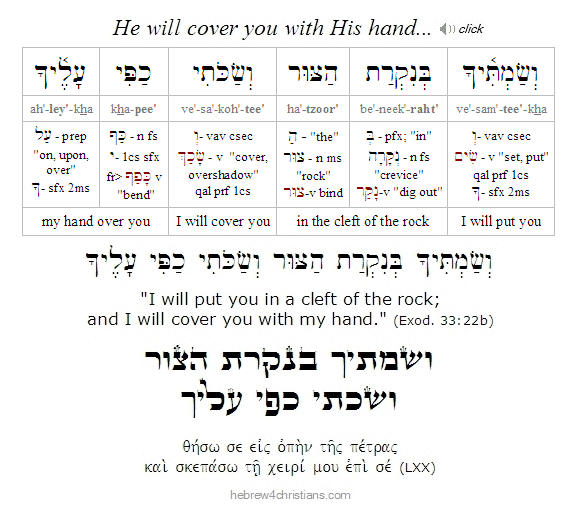 |
There is an opinion in the Talmud that says Moses was the author of the Book of Job, the ancient story that investigates why the righteous suffer (Bava Batra 15a). At the end of the book, God answers Job from the midst of a whirlwind, reminding him that while people can't comprehend His ways, he is the nevertheless the Source of all goodness and truth in the universe. After Job hears God speak, he says, "Behold, I am of small account; what shall I answer you? I lay my hand on my mouth... I know that you can do all things, and that no purpose of yours can be thwarted. I have uttered what I did not understand, things too wonderful for me, which I did not know. I had heard of you by the hearing of the ear, but now my eye sees you; therefore I despise myself, and repent in dust and ashes" (Job 40:4, 42:2-3,5-6). Both Job and Moses realized that trusting in the love of God is the key to accepting all other experiences that might befall him...
Note that God said that "no man can see My face and live" (Exod. 33:20), and yet Moses spoke with God "face to face" (Deut. 34:10). We reconcile this by understanding "face to face" (פָּנִים אֶל־פָּנִים) to be an idiom that means "intimately," or "personally," that is, without the use of mediators or outside agents. Nevertheless the "face of God" was disclosed in the advent of Yeshua, as it is written: "No one has ever seen God; the only begotten God (μονογενὴς θεὸς), the One who is in the heart of the Father (ὁ ὢν εἰς τὸν κόλπον τοῦ πατρὸς), has made him known" (John 1:18). Yeshua is the "image of the invisible God" (εἰκὼν τοῦ θεοῦ τοῦ ἀοράτου) who reveals the meaning of the Father (John 14:9). As it is written, "God who said, "Let light shine out of darkness," has shone in our hearts to give the light of the knowledge of the glory of God in the face of Yeshua the Messiah" (2 Cor. 4:6). Our Savior is "the radiance of the glory of God and the representation of his essence (χαρακτὴρ τῆς ὑποστάσεως αὐτοῦ), the One who upholds the universe by the word of his power" (Heb. 1:3). All this is very mysterious, of course: the Infinite enters the realm of the finite; God is revealed yet concealed; he is made known yet beyond our understanding. Indeed, the very One who entered the "leper colony of the world" and willingly died on the cross for our meanness and sin is none other than "the blessed and only Sovereign, the King of kings and Lord of lords, who alone has immortality, who dwells in unapproachable light (φῶς οἰκῶν ἀπρόσιτον), whom no one has ever seen or can see" (1 Tim. 6:15-16).
For more on this topic, see: "The Revelation of God: Further thoughts on Ki Tisa."
The Gospel at Sinai...

[ The following is related to this week's Torah reading, parashat Ki Tisa... ]
03.10.20 (Adar 14, 5780) The tragic episode of the Golden Calf revealed that the Israelites were unable to keep the law, even though they had personally experienced the power of God's deliverance from Egypt and had heard God's Voice directly speaking the Ten Commandments at Mount Sinai. The presence of the idol demonstrated that something more was needed, and that the law by itself was insufficient to change the heart (Rom. 3:20). The poignant intercession of Moses on behalf of Israel - his willingness to die on behalf of the people - foreshadowed the need for a New Covenant (בְּרִית חֲדָשָׁה), a deeper revelation of the righteousness of God in terms of mercy and grace (Exod. 34:6-7; John 1:17; Rom. 3:21). The (second) revelation of the Name YHVH (יהוה) therefore represented a "gospel" moment for Israel. Just as the first set of tablets, based as they were on the justice and holiness of God, were broken, so a second set was graciously restored based on God's forgiveness and love. Likewise, Yeshua was broken on behalf of the law but was raised again so that all who trust in Him can understand that God is "merciful and gracious, slow to anger and abounding in steadfast love and truth" (Exod. 34:6, Psalm 86:15, 103:8). Only at the cross of Yeshua are God's justice and love forever reconciled (Prov. 16:6; Psalm 85:10; Rom. 3:26).
For more on this subject, see the Ki Tisa article, "God's Stubborn Love."
Parables and Purim...
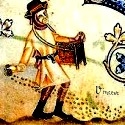
03.10.20 (Adar 14, 5780) The Hebrew word for "parable" is mashal (מָשָׁל), which means a "likeness" or "similitude," though it also can refer to a proverb or ethical maxim (as in the case of Mishlei Shlomo, the Proverbs of Solomon). In the New Testament, the word παραβολή means juxtaposition, or the casting (βάλλω) of one thing beside (παρα) another thing for the purpose of comparison or contrast. Figuratively, a parable resembles the shape of a parabola, that is, a "u-shaped curve" that goes out and turns back in on itself. Hence the parables of Jesus generally have a "twist" that is meant to turn the hearer back to question his or her own perspective, heart attitude, and so on. The purpose of the parable is to provoke us think outside of our prejudices so that we can see divine possibility in our lives.
Undoubtedly Yeshua often taught in parables because they simultaneously conceal and reveal the truth. A parable obscures the truth to those who don't really want it; just as it reveals the truth to those who do (Luke 8:9-10). Since Yeshua's whole life was a parable of sorts - a "disguise" that led to the victory of our deliverance (Phil. 2:7) - it is not surprising that he regularly used "figures of speech" to provoke people to examine their own heart attitude and faith... In this connection note that Yeshua never explained the "mysteries of the kingdom of God" directly to the crowds, nor did He ever pander to the crowd's clamor or interests. His message is always meant for the individual soul who was willing to follow Him -- to the one who had "ears to hear."
"As you go about, let people know that the Kingdom of Heaven (מַלְכוּת הַשָׁמַיִם) has come. Take care of the sick, waken the lifeless, forgive the sinner, and banish the demonic" (Matt. 10:7-8). We proclaim the truth of the kingdom when we serve as healers, caregivers, and those who seek to bring the grace of God and inner peace to others.. "Go into all the world and preach the gospel, and sometimes use words..."
Note: For more on this topic, see the Purim article, "Parables and Revelation."
Esther and God's Providence...
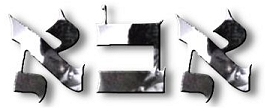
03.09.20 (Adar 13, 5780) Much is made over the fact that the book of Esther is the only book of the Tanakh that does not explicitly mention the Name of God. However, the idea of God's sovereignty and hashgachah (divine providence) is clearly implied throughout the entire story. Indeed the sages teach that the message of Purim concerns the kingship of God (ממלכת האל), with the word "the king" (המלך) appearing over 100 times and the word "kingdom" (מלכות) appearing ten times in the scroll. In most cases the word "king" refers to King Achashverosh, though the sages say that when Achashverosh is not explicitly named, it may also refer to the King of the Universe.
The phrase hester panim (הסתר פנים) means "hiding of the face" and is often used when discussing the Book of Esther. In this sense of the term, hester panim is somewhat like the sun on an overcast day: Just because you don't see it doesn't mean it isn't there. God's providential love is at work at all times, whether we perceive it or not. This is suggested in the name of the scroll itself: the phrase Megillat Esther (מגילת אסתר), literally "the Scroll of Esther," can be rearranged to say megallat ha'seter (מגילת הסתר), "the concealed scroll."
In light of this nes nistar (נס נסתר), or "hidden miracle" of the Jew's deliverance, Esther and Mordecai ordained that Purim should be observed as a "day of feasting and merrymaking" and of sending gifts to the poor (Esther 9:22,28). By the way, Purim (פורים) was so named because Haman had cast lots (purim) to determine the day on which to destroy the Jews.
So what does Purim teach us? Well first of all it teaches that the LORD is in control of everything, even if may seem otherwise. Nothing happens apart from God's sovereign will, and therefore everything works together for the ultimate good for those who trust in Him (Rom. 8:28). The term hashgachah pratit (השׁגחה פרטית) refers to God's personal supervision of our lives (hashgachah means "supervision," and pratit means "individual" or "particular"). Since He is the Master of the Universe (אדון עולם), God's supervision and providence reaches to the smallest of details of creation - from subatomic particles to the great motions of the cosmos. God not only calls each star by its own name (Psalm 147:4), but knows each particular lily and sparrow (Matt. 6:28-30, 10:29). Each person created in the likeness of God is therefore under the direct, personal supervision of God Himself -- whether that soul is conscious of that fact or not. As Yeshua said, even the hairs on your head are all numbered (Matt. 10:30). The God of Israel is called אלהי הרוּחת לכל־בּשׂר / Elohei ha-ruchot lekhol-basar: "The God of the spirits of all flesh" (Num. 16:22), and that means He is LORD even over those who vainly attempt to suppress His Presence and reality. Second, Purim teaches that God's plans for Israel will never (ever) fail and that those who disregard Israel in their theology do so at their peril. Third, the story of Esther provides a warning for those tyrants and princes of this world who oppress God's people: Like the false usurper Haman, you are likewise doomed to failure, and the LORD will vindicate all who trust in Him for deliverance.
There is great comfort when we understand that God has complete authority over everything in the universe -- including our ultimate welfare (John 10:27-28). When we pray to the LORD God of Israel, we intuitively understand that He is completely sovereign and Lord over all things... All power, glory, authority, and dominion is His alone, and all that is in the heaven and in the earth is His (1 Chron. 29:11-12). We do not worry that He is somehow incapable of handling our troubles or that He is unable to help us. No, we acknowledge that the God most High (אל עליון) sustains all things by the Word of His power (Col. 1:17). He is "the blessed and only Sovereign, the King of kings (מלך המלכים) and the Lord of lords" (1 Tim. 6:15). Whenever we think clearly in light of the revelation of Scripture, we apprehend the truth about God's sovereign glory and power...
לְךָ יְהוָה הַגְּדֻלָּה וְהַגְּבוּרָה וְהַתִּפְאֶרֶת
וְהַנֵּצַח וְהַהוֹד כִּי־כֹל בַּשָּׁמַיִם וּבָאָ֑רֶץ
לְךָ יְהוָה הַמַּמְלָכָה וְהַמִּתְנַשֵּׂא לְכֹל לְרֹאשׁ
le·kha · Adonai · ha·ge·doo·lah · ve·ha·ge·voo·rah · ve·ha·teef·e'·ret
ve·ha·netz'·ach · ve·ha·hod · kee-khol · ba·sha·ma'·yeem · oo·va·a'·retz
le·kha · Adonai · ha·mam'·la·khah · ve·ha·meet·na·seh · le·khol · le·rosh

"Thine, O LORD, is the greatness, and the power, and the glory,
and the victory, and the majesty: for all that is in the heavenand in the earth is thine;
thine is the kingdom, O LORD, and thou art exalted as head above all." (1 Chron. 29:11)
Download Reading Card

Note: Reflection on the doctrine of God's omniscience (like other essential doctrines of our faith) leads to paradox and tension within our human understanding (by means of which we are deepened in our surrender to the LORD and His will for our lives). This paradox is restated in Philippians 2:12-13: "Work out your own salvation with fear and trembling (your part), for it is God who works in you, both to will and to work for his good pleasure" (God's part). As the prophet Isaiah wrote: "For my thoughts are not your thoughts, neither are your ways my ways, declares the LORD. For as the heavens are higher than the earth, so are my ways higher than your ways and my thoughts than your thoughts" (Isa. 55:8-9).
What We Really Need...

03.09.20 (Adar 13, 5780) "Your heavenly Father knows what you need before you ask him" (Matt. 6:8). We sometimes pray for what we think we need but overlook what we really need. For instance, we may pray for health, material blessing, and opportunity, but what we really need is the ability to trust, the willingness to surrender our lives to God without qualification, and the grace to see the good in others and not their faults. These needs are just as real as our need for food and clothing, since apart from grace to extend empathy and love toward others, we will never be truly happy. Love "overlooks" a multitude of sins; it looks beyond the present moment to see with compassion, of kindness, of empathy... What we really need, then, is to be after God's own heart, to see other people as God sees them, and to overlook matters that offend or feed our sense of pride. This is what we truly need, and therefore we trust that the Lord our God mercifully "decodes" our apparent petitions to express what the Spirit of God groans on our behalf (Rom. 8:26).
כִּי־עָנִי וְאֶבְיוֹן אָנכִי
וְלִבִּי חָלַל בְּקִרְבִּי
kee · a·nee · ve·ev·yon · a·no·khee
ve·lee·bee · cha·lal · be·keer·bee

"For I am poor and needy,
and my heart is stricken within me."
(Psalm 109:22)

The word translated as "stricken" is challal (חָלַל), meaning "wounded, pierced, polluted, defiled, or brokenhearted." This is the condition of heart that is prerequisite for doing real business with heaven. "God has not been trying an experiment on my faith or love in order to find out their quality. He knew it already. It was I who didn't. In this trial He makes us occupy the dock, the witness box, and the bench all at once. He always knew that my temple was a house of cards. His only way of making me realize the fact was to knock it down.... I need Christ, not something that resembles Him." (C.S. Lewis: A Grief Observed)
Yom Purim HaGadol...

[ The holiday of Purim begins this evening at sundown... ]
03.09.20 (Adar 13, 5780) Purim is a prophetic holiday, foretelling of the ultimate victory to come. Here is a vision of the coming "Purim haGadol," that Coming Day and hour: "Then I saw heaven opened, and behold, a white horse! The one sitting on it is called Faithful and True (נֶאֱמָן וְיָשָׁר), and in righteousness he judges and makes war. His eyes are like a flame of fire, and on his head are many diadems, and he has a Name written that no one knows but himself. He is clothed in a robe dipped in blood, and the Name by which he is called is the Word of God (דְּבַר הָאֱלהִים). And the armies of heaven, arrayed in fine linen, white and pure, were following him on white horses. From His mouth comes a sharp sword with which to strike down the nations, and He will rule them with a rod of iron. And He will tread the winepress of the fierce fury of the wrath of God, the Ruler over All (παντοκράτωρ), the LORD God Almighty (יְהוָה אֱלהֵי צְבָאוֹת). On his robe and on his thigh he has a Name written, the King of kings (מֶלֶךְ הַמְּלָכִים) and the Lord of lords (אֲדנֵי הָאֲדנִים). And with the breath of his lips He will slay the wicked" (Rev. 19:11-16).
On the great Day of the LORD (יוֹם־יְהוָה הַגָּדוֹל), the wicked will become "ashes under the feet of the righteous," hearkening to the promise of in the New Testament: "The God of peace (אלהֵי הַשָּׁלוֹם) will soon crush Satan under your feet. The grace of our Lord Yeshua the Messiah be with you" (Rom. 16:20). Meanwhile, of course, we must fight the "good fight of faith" and be strong in the LORD and the power of His might. "Wondrously show Your steadfast love, O Savior of those who seek refuge from their adversaries at Your right hand" (Psalm 17:7). As King Asa once prayed, "LORD, there is no one besides Thee to help in the battle between the powerful and those who have no strength; so help us, O LORD our God, for we trust in Thee, and in Thy name have come against this multitude. O LORD, Thou art our God; let not man prevail against Thee" (2 Chron. 14:11). We offer praise in anticipation of the great deliverance to come: "Bless our God, O peoples; let the sound of his praise be heard, who has kept our soul among the living and has not let our feet slip" (Psalm 66:8-9). The LORD is surely able to keep you from stumbling and to present you blameless before the presence of his glory with great joy (Jude 1:24).
May that day come speedily, and in our time...
 |
HAPPY PURIM CHAVERIM!
Sabbath of the "Red Cow"

[ This Shabbat is called "Shabbat Parah," the Sabbath of the [red] Cow." In addition to reading the regular Torah reading (i.e., Ki Tisa), we read about the mysterious red heifer sacrifice.... ]
03.09.20 (Adar 13, 5780) The Shabbat that immediately follows Purim is called Shabbat Parah - the "Sabbath of the [red] Cow." In traditional synagogue services, two Torah scrolls will be removed from the ark, and from the first scroll will be read the Torah portion for the week (e.g., Ki Tisa), and from the second will be read the chapter regarding the laws of the sacrifice of the "Red Heifer" (Num. 19:1-22). The early sages decided to recite the laws of the Red Heifer at this time to recall the remedy of the sin of the Golden Calf, and to remind the people to purify themselves before coming to Jerusalem for the pilgrimage festival of Passover. It is thought that since the sprinkling of the "waters of separation" cleanses from the uncleanness of death, reading this portion will help prepare our hearts for the time of Passover when we celebrate deliverance from death.
The Red Heifer offering is considered a paradox to most Jewish thinkers, though it can be seen as a revelation of Yeshua our Messiah. The paradox is that the one who offers this sacrifice becomes ritually impure, while the sprinkling of the ashes is used to make people clean... The ritual is considered chok within the Jewish tradition, meaning that it makes no rational sense. The Talmud states that of all the 613 commandments given in the Torah, even King Solomon with all his wisdom could not fathom this decee. However, the sacrifice of Yeshua the Messiah can be understood as the fulfillment of the symbolism of the parah adumah. Both were entirely rare and without defect (sin); both were sacrificed "outside the camp"; both made the one who offered the sacrifice unclean but made the one who was sprinkled by it clean; and finally, both sacrifices cleanse people for priestly service.
The parah adumah had to be a perfect specimen that was completely red, "without blemish, in which there is no defect (mum)." The rabbis interpreted "without blemish" as referring to the color, that is, without having so much as a single white or black hair. This is the only sacrifice in the Torah where the color of the animal is explicitly required. Moreover, the parah adumah was never to have had a yoke upon it, meaning that it must never have been used for any profane purposes.

Unlike all other sacrifices offered at the altar, the parah adumah was taken outside the camp and there slaughtered before the priest, who then took some of its blood and sprinkled it seven times before the Mishkan (thereby designating it as a purification offering). [During the Second Temple period, the High Priest performed this ceremony facing the Temple while atop the Mount of Olives.] Then the red heifer would be burned in its entirety: its hide, flesh, blood, and even dung were to be burned (unlike other Levitical korbanot). Unlike other offerings, all the blood of the sacrifice was to be burned in the fire.
Hyssop, scarlet yarn, and a cedar stick would then be thrown upon the burning parah adumah (these same items were used to cleanse from tzara'at, skin disease). In other words, the blood was assimilated into the ashes of the sacrifice, which were then gathered and mixed with water to create the "water of separation" (mei niddah) for the Israelite community. Note that the word "separation" (niddah) refers to menstrual impurity and harkens to Zech. 13:1: "On that day there shall be a fountain opened for the house of David and the inhabitants of Jerusalem, to cleanse them from sin and from niddah."
Anyone (or anything) that came into contact with a corpse (the embodiment of sin and death) was required to be purified using the mei niddah. The purification procedure took seven days, using stalks of hyssop dipped into the water and shaken over the ritually defiled person on the third day and then again on the seventh day. After the second sprinkling, the person undergoing the purification process would be immersed in a mikvah and then be unclean until the following evening.
According to Jewish tradition, the Red Heifer sacrifice was to atone for the sin of the Golden Calf, though the Torah itself does not make this association. The LORD Yeshua, our High Priest of the New Covenant, is the perfect fulfillment of the Parah Adumah, since he was completely without sin or defect (2 Cor 5:21; John 8:46); he was sacrificed outside the camp (Heb 13:13); he made himself sin for us (2 Cor 5:21); his sprinkling makes us clean (1 Pet 1:2; Heb 12:24; Rev 1:5); and the "water of separation" that his sacrifice created is the means by which we are made clean from the impurity of sin (Eph 5:25-6; Heb 10:22).
Note: For more on the Red Heifer sacrifice, see the "Gospel of the Red Cow" article.
Parashat Ki Tisa - כי תשא
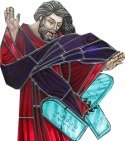
03.08.20 (Adar 12, 5780) Shalom chaverim.. Our Torah reading for this week is Ki Tisa, one of the longest of the Torah. It includes the tragic account of the Sin of the Golden Calf (עֵגֶל מַסֵּכָה) and Moses' passionate intercession for Israel. After a period of teshuvah (repentance) for Israel's idolatry, the LORD graciously revealed the meaning of the Name YHVH (יהוה), that is, the thirty-two words that have become known in Jewish tradition as the Shelosh Esrei Middot, or the "Thirteen Attributes of God's Mercy." This was the LORD's own definition of His character and attributes to Moses after the breaking of the Sinai covenant. See the Ki Tisa Summary for the Hebrew text and audio of this vital revelation from God.
זָרַח בַּחשֶׁךְ אוֹר לַיְשָׁרִים
חַנּוּן וְרַחוּם וְצַדִּיק
za·rach · ba·cho'·shekh · ohr · la·ye·sha·reem
cha·noon · ve·ra·choom · ve·tza·deek

"Light shines in the darkness for the upright;
He is gracious, compassionate, and righteous."
(Psalm 112:4)
Download Study Card
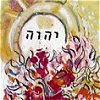
 |
Recall that in our last two Torah readings (i.e., Terumah / Tetzaveh), we read how Moses was upon Mount Sinai receiving the vision of the Sanctuary (i.e., the Mishkan or "Tabernacle") and its various furnishings. In this week's portion, God commanded that all Israelite men over the age of twenty were required to pay a tax for the upkeep of the Sanctuary: "each shall give (וְנָתְנוּ) a ransom (i.e., kofer: כּפֶר) for his life to the LORD" (Exod. 30:12). The sages note that the word ve'natnu can be written backward and forward, alluding to the idea that whoever gives tzedekah (i.e., "charity") never feels the loss of having given anything away (Bava Batra). Giving benevolence produces wealth; tzedakah is an investment in your spiritual future! Indeed, "charity saves from death" - tzedakah hatzil mi-mavet: / צְדָקָה תַּצִּיל מִמָּוֶת (Prov. 10:2; 11:4). The love of God is like that: when we give it away, it becomes our own possession. The converse is also true. If we withhold helping others, eventually we may be unable to give what we would have given had we the opportunity (and consequently, we lose our blessing). In this age of economic fear, giving tzedakah is truly countercultural and faith-affirming: but the truth abides: when we give, we receive....
After this tax was defined, the LORD described some additional elements that would be required for the priestly service at the Sanctuary, namely, a copper washstand, sacred anointing oil, and incense for the Golden Altar in the Holy Place. The Lord then named Betzalel, a man "filled with the Spirit of God" to be the chief architect of the Mishkan. Before the construction would begin, however, the Lord warned the people to be careful to observe the Sabbath day. Immediately following this admonition, God gave Moses the two tablets of the Ten Commandments, which were inscribed directly by the hand of God.
Before Moses returned to the camp, however, "certain people" had talked his brother Aaron into making a golden idol which they began to worship as their "god." The LORD then told Moses of their treachery and threatened to destroy all the Israelites, but Moses interceded on their behalf. As he rushed down the mountain, with the tablets in hand, he saw the people dancing about the idol and smashed the Tablets in anger. Moses then destroyed the idol and led the Levites in slaying 3,000 of the ringleaders.
The following day, Moses returned up the mountain and begged God to reaffirm the covenant. After a 40 day period of intercession, the Lord finally told Moses to carve a second set of Tablets and to meet him again at the summit of Sinai, where He would show Moses his glory and reveal to him the meaning of His Name (יהוה). When Moses encountered the LORD in a state of brokenness and forgiveness, his face began to shine with glory - a glory that foretold of the New Covenant of God's mercy and grace to come in Yeshua.
When the people saw Moses coming down the mountain with the second set of Tablets, they understood they were forgiven and that the Covenant had been renewed. When they approached him, however, they drew back in fear, because his face was radiant with the glory of God. Moses reassured them, however, and then told them all that the Lord had commanded while he was on the mountain. When Moses had finished speaking with them, he put a veil (מַסְוֶה) over his face. From that time on, Moses wore a veil in the camp, though he removed it whenever he went before the Lord for further instructions.
The LORD delivers from death...

03.06.20 (Adar 10, 5780) In light of all the worldwide fear over contracting or dying from a virus, I encourage you to remember the words of Scripture that proclaim that Yeshua came to "deliver all those who through fear of death were subject to lifelong slavery" (Heb. 2:15). For those who believe, death is a conduit to heaven and the Presence of God. As Yeshua our Savior said: "I am the resurrection and the life (אני התחייה והחיים). Whoever believes in me, though he die, yet shall he live, and everyone who lives and believes in me shall never die" (John 11:25-26). "Behold, the eye of the LORD is on those who fear him, on those who wait for his lovingkindness, that he may deliver their soul from death..." (Psalm 33:18-19). As Paul also said: "We felt that we had received the sentence of death; but that was to make us rely not on ourselves but on God who raises the dead. He delivered us from such a deadly peril, and on him we have set our hope that he will deliver us again" (2 Cor. 1:9-10). "For you did not receive the spirit of slavery to fall back into fear, but you have received the Spirit of adoption as children, by whom we cry, "Abba! Father!" (Rom. 8:15).
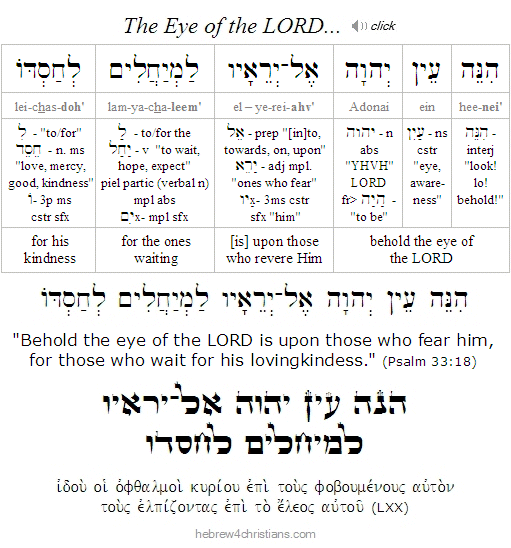 |
We are given daily bread (לחם יומי) -- just enough to sustain us for this day. This teaches us to live one day at a time, trusting in God's provision and thanking him for the gift of life. The Torah of "manna" teaches us to trust God and to be thankful for his daily care. When you live each day as if it might be your last, the fear of the future fades away and you are free to live at peace in the moment. Therefore Yeshua taught us: "Don't be anxious about tomorrow, for tomorrow has its own troubles. Live one day at a time" (Matt. 6:34).
Kierkegaard comments: "If there is no next day for you, then all earthly care is annihilated. When the next day comes, it loses its enchantment and its disquieting insecurity. If there is no next day for you, then either you are dying or you are one who by dying to temporality has grasped the Eternal, either one who is actually dying or one who is really living... The one who rows a boat turns his back to the goal toward which he is working. So it is with the next day. When, with the help of the Eternal, a person lives absorbed in today, he turns his back to the next day. The more he is eternally absorbed in today, the more decisively he turns his back to the next day." Amen. We walk by faith, not by sight (כי באמוּנה נתהלּך ולא בּראוּת עינים); we stand in the intersection between time and eternity, suspended between what is seen and what is unseen, and it is from there, from that place of struggle and exile that we call upon the name of the LORD, our Strong Tower in the midst of the flux of this passing realm (Prov. 18:10). Shabbat Shalom, chaverim. Remember the war with Amalek!
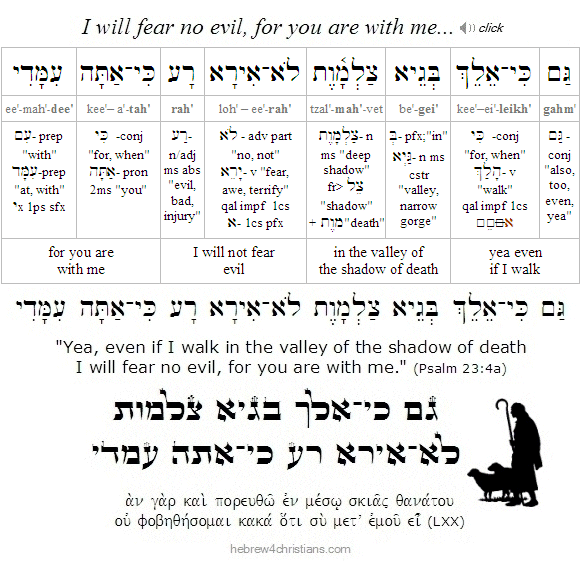 |
Light of the Menorah...
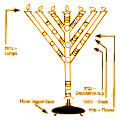
03.06.20 (Adar 10, 5780) The holy menorah (מְנוֹרָה) was formed from one piece of pure beaten gold weighing 3,000 shekels of silver (nearly 100 pounds). It was a highly decorative work that had seven branches (with seven lamps), nine flower blooms, eleven fruits, and twenty two cups. The light from the Menorah was a spiritual light. It was not seen from the outside of the Tabernacle, but only while inside the holy chamber, before the holy place of sacrificial atonement. It enabled service to God to be performed, though it was not a light to be used for profane purposes. Notice that the six lamps faced the central lamp -- a picture of Yeshua, the Light of the World whose arms and legs were "hammered" for our sins.... He is the suffering servant (shamash) who lightens everyone in the world. He is the center, the supporting trunk for the other branches (John 15:5).
The physical light came from the burning of pure olive oil - a symbol of anointing and the Holy Spirit (רוּחַ הַקּדֶשׁ). It was kindled by the hand of a man of peace and humility. Likewise, when we are given light to behold the sacrifice of Yeshua for our atonement (כַּפָּרָה), we are filled with the divine light (John 8:12; 1 John 1:7, Eph. 5:8). When we come to the cross, we can behold the truth of God's unfailing love that draws us to be united with Him.
 |
For more on this topic, see "The Light of the Menorah: Further thoughts on Terumah."
Hidden in Plain Sight...
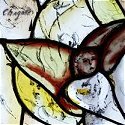
[ The following is related to the festival of Purim which begins Monday March 9th at sundown this year. For more information please see the Purim pages. ]
03.06.20 (Adar 10, 5780) Although the Name of God is not explicitly mentioned in the Book of Esther, the story is essentially about revelation, that is, the disclosure of God's Presence despite His apparent concealment. The phrase hester panim (הֶסְתֵר פָּנִים) means "hiding of face" and is often used when discussing the divine providence. God's plan is being fulfilled, step-by-step, even if it is hidden within the "natural" world of human beings and their choices (Jer. 10:23; Prov. 21:1). The LORD is Ha'mashgiach (i.e., הַמַּשְׁגִיחַ, the supervisor) of all things - from the motions of subatomic particles to the great events of the cosmos. He not only calls each star by its own name (Psalm 147:4), but knows each particular lily and sparrow (Matt. 6:28-30, 10:29). Indeed, each person is under the direct, personal supervision of God Himself (הַשְׁגָּחָה פְּרָטִית) -- whether he or she is conscious of this or not. As Yeshua said, even the hairs on your head are all numbered (Matt. 10:30).
גָּדוֹל יְהוָה וּמְהֻלָּל מְאד
וְלִגְדֻלָּתוֹ אֵין חֵקֶר
ga·dol · Adonai · oo·me·hoo·lal · me·od
ve·leeg'·doo·la·to · ein · chei'·ker

"Great is the LORD, and greatly to be praised,
and his greatness is unsearchable." (Psalm 145:3)
Download Study Card


The Apostle Paul taught that God "chose us [εκλεγομαι] in the Messiah before the foundation of the world" (Eph. 1:4). God called you by name -- before He created the very universe itself. "God has chosen you from the beginning for salvation through sanctification by the Spirit and faith in the truth" (2 Thess. 2:13). God loves you with an "everlasting love" (אַהֲבַת עוֹלָם) and with lovingkindness (i.e., chesed, חֶסֶד) draws you to Himself (Jer. 31:3). There is no fear in God's sovereign and irresistible love for your soul (1 John 4:18). "If God is for us, who can be against us?" (Rom. 8:31).
Note: For more on this topic, see "Theology, Paradox, and Purim."
The Scandal of Esther: "Chosenness"
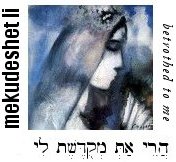
03.06.20 (Adar 10, 5780) The Book of Esther centers on God's faithfulness and care of the Jewish people, and by extension, for all those (among the nations) who become partakers of Israel's blessings through Yeshua the Messiah. The "scandal" of the story turns on the "scandal of election," or the idea that God personally chooses some people -- for reasons that are entirely His alone -- to be the recipients of His covenantal love. The Jews are called the "chosen people" (עם הנבחר) just as Christians are said to be "chosen [εκλεγομαι] in Yeshua before the foundation of the world" (Eph. 1:4). In both cases we note God's sovereign prerogative to choose those who are in relationship with Him. Yeshua told his followers: "No one can come to me (δυναται ελθειν προς με) unless the Father who sent me drags [ἑλκύσῃ] him" (John 6:44, 6:65), and He also said "You did not choose me, but I chose you and appointed you" (John 15:16). God is the Initiator of the relationship; He is the Master of the Universe and "the God of the spirits of all flesh" (Num. 16:22). If there is revelation from heaven, it is Heaven's prerogative to bestow it on Heaven's own terms...
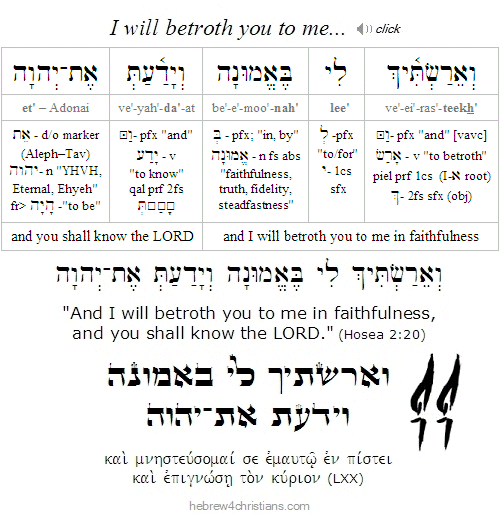 |
Regarding this divine prerogative, Paul reminded us of God's words to Moses: "I will be gracious to whom I will be gracious, and will show mercy on whom I will show mercy" (Rom. 9:15). He then followed this up with the statement: "So then it depends not on human will or exertion, but on God, who shows mercy" (Rom. 9:15-16). If this sounds "offensive" or "unfair," it may be that we are secretly appealing to our own supposed merit in order to find acceptance before God. The "scandal" of the gospel is that God loves whom He loves for reasons that are His alone, and this is likewise the scandal of God's sovereign choice of ethnic Israel. In either case, God is preeminent.
|







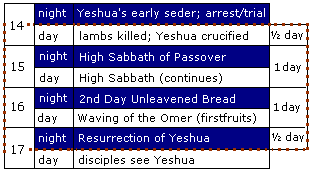
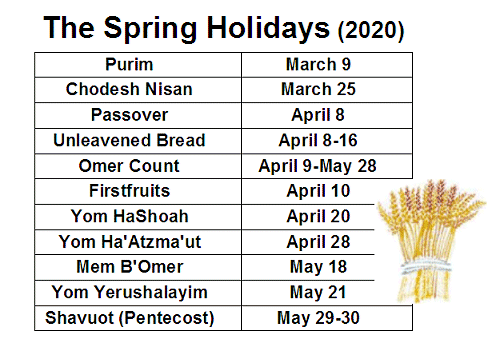


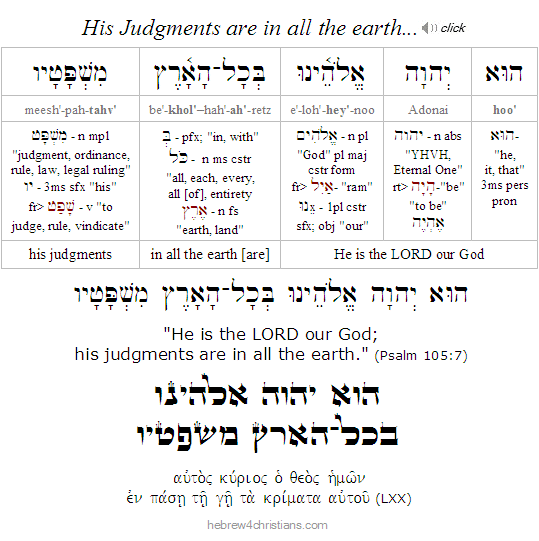






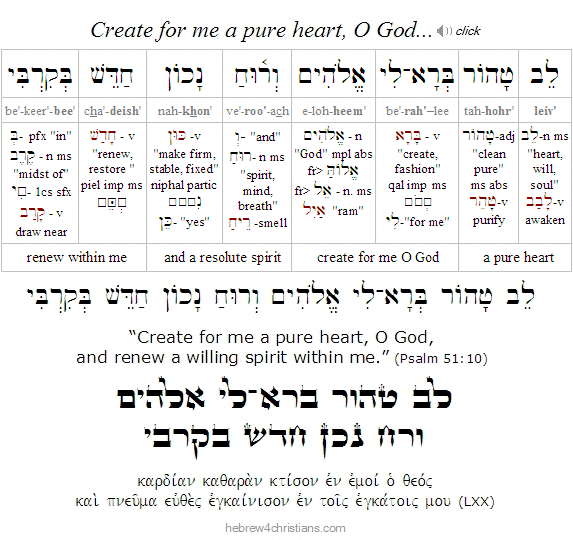







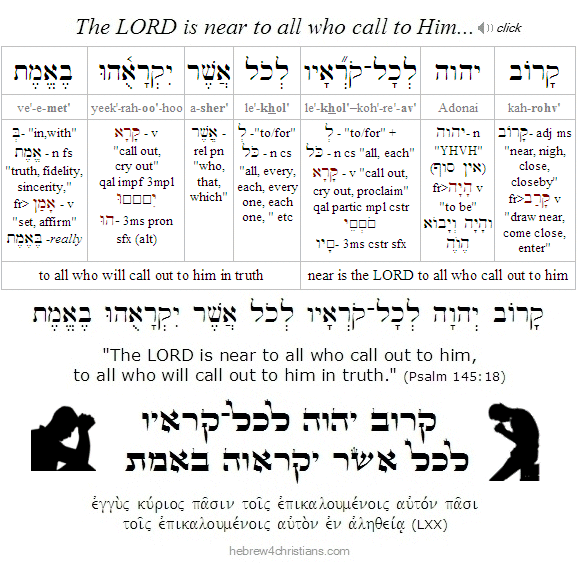



![Spring Holiday Timeline (H4C]](../../../../About_HFC/Site_News/Archive-2020/March/shabbathagaolline.gif)


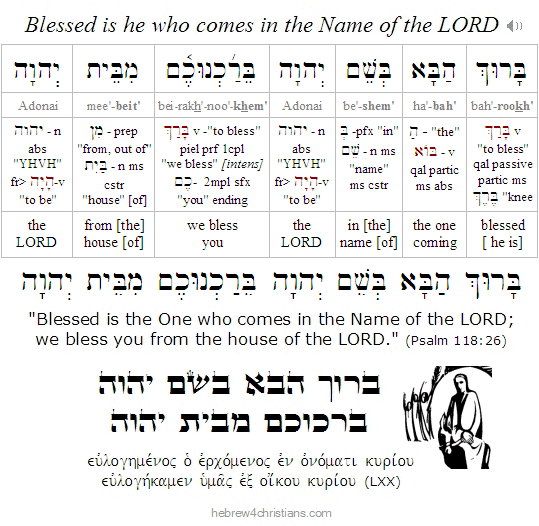




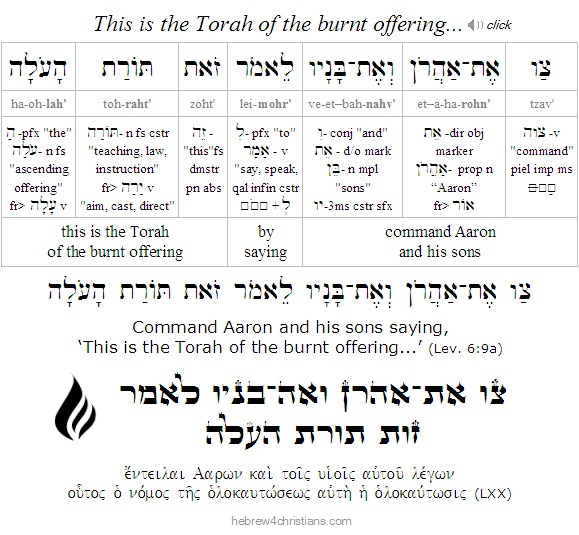











































![Spring Holiday Timeline (H4C]](../../../../About_HFC/Site_News/Archive-2020/March/roshchodeshim-line.gif)

